






Your time at LEH so far will have hopefully sparked your curiosity and introduced you to new opportunities, whether that’s learning new languages, exploring the sciences, enjoying creative arts or delving into history and the ancient world. As you prepare to move into Lower Fifth, you will have the chance to reflect on what you’ve found most enjoyable and stimulating, as you refine your choices about the subjects you want to study for your GCSEs.
As you begin to think about the exciting decisions that will help shape your time in Upper School, please do take the opportunity to find out more from those around you. Ask your teachers what it’s like to study different subjects at GCSE and speak to older pupils who have studied the subjects you are interested in to get their first-hand experiences.
Whatever choices you make, our commitment to you is to make sure your lessons are inspiring and stretching and that your chosen GCSE subjects capture your intellectual interest and ignite a desire to understand more. We will create the best possible environment for you to study in – one that involves challenge and fun extra-curricular experiences to give you that all important balance. There will also be a focus on helping you to develop your study skills to support your independent learning – now, and in the years ahead – and you will continue to work closely with our expert Careers team as you start to think about all the wonderful possibilities that could feature in your future.
Outside of the classroom there will be many rewarding opportunities: you can take on the challenges of the Duke of Edinburgh Silver Award or support the local community as a volunteer visiting local primary schools and care homes. You’ll also become a buddy to a new Third, acting as a friendly and familiar mentor as they begin their time at LEH Senior School.
For now, I hope this guide gives you a fantastic overview of the GCSE subjects available, and all the exciting elements of school life that await you in our Upper School.
Rowena Cole Head Mistress
Pupils in the Upper School are encouraged to be intellectually and physically adventurous.
This is an exciting two years in which you will enjoy greater independence, more responsibility and a stronger sense that your education is leading you onwards to your life beyond school. The GCSE courses are stimulating, enabling you to stretch your academic interests, and it is exciting to pursue the subjects you have chosen.
Of course, your academic work is just a part of your experience at LEH. An excellent range of extra-curricular activities are on offer to help you to lead a balanced, healthy life, so that you experience joy and success both inside the classroom and in your life beyond. These help you to develop those all-important life skills, as well as enabling you to have some downtime and a positive break from academic work. We value highly the contributions of our Fifth Formers to the school community. You may be able to take more of a leading role in an existing activity; equally, why not try something new?
We are here to support you and to provide guidance every step of the way so that you make decisions that will help you to realise your dreams. Believe in your power to succeed and savour every moment.
We are looking forward to welcoming you to the Upper School.
Flora Ellison Head of Upper School
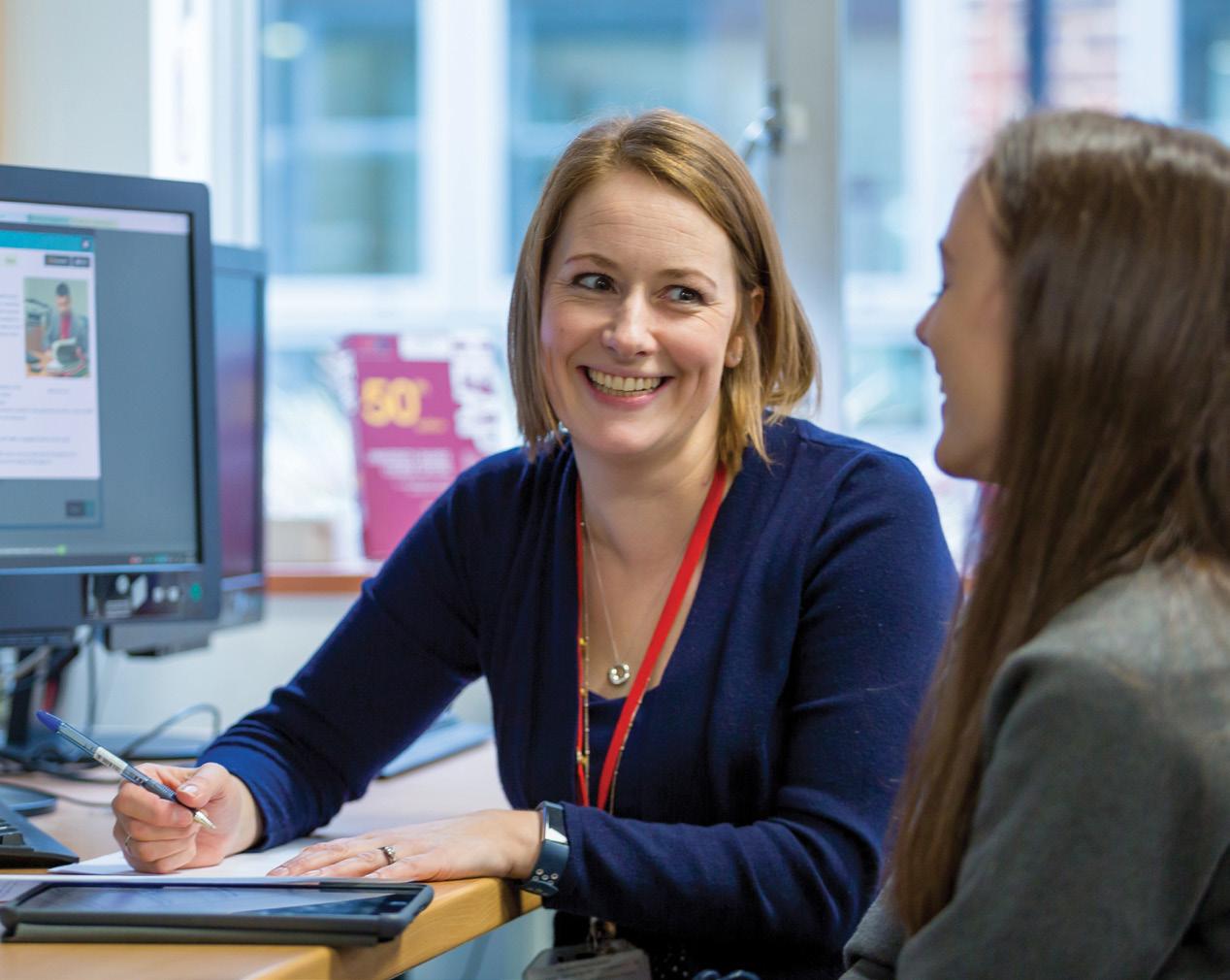
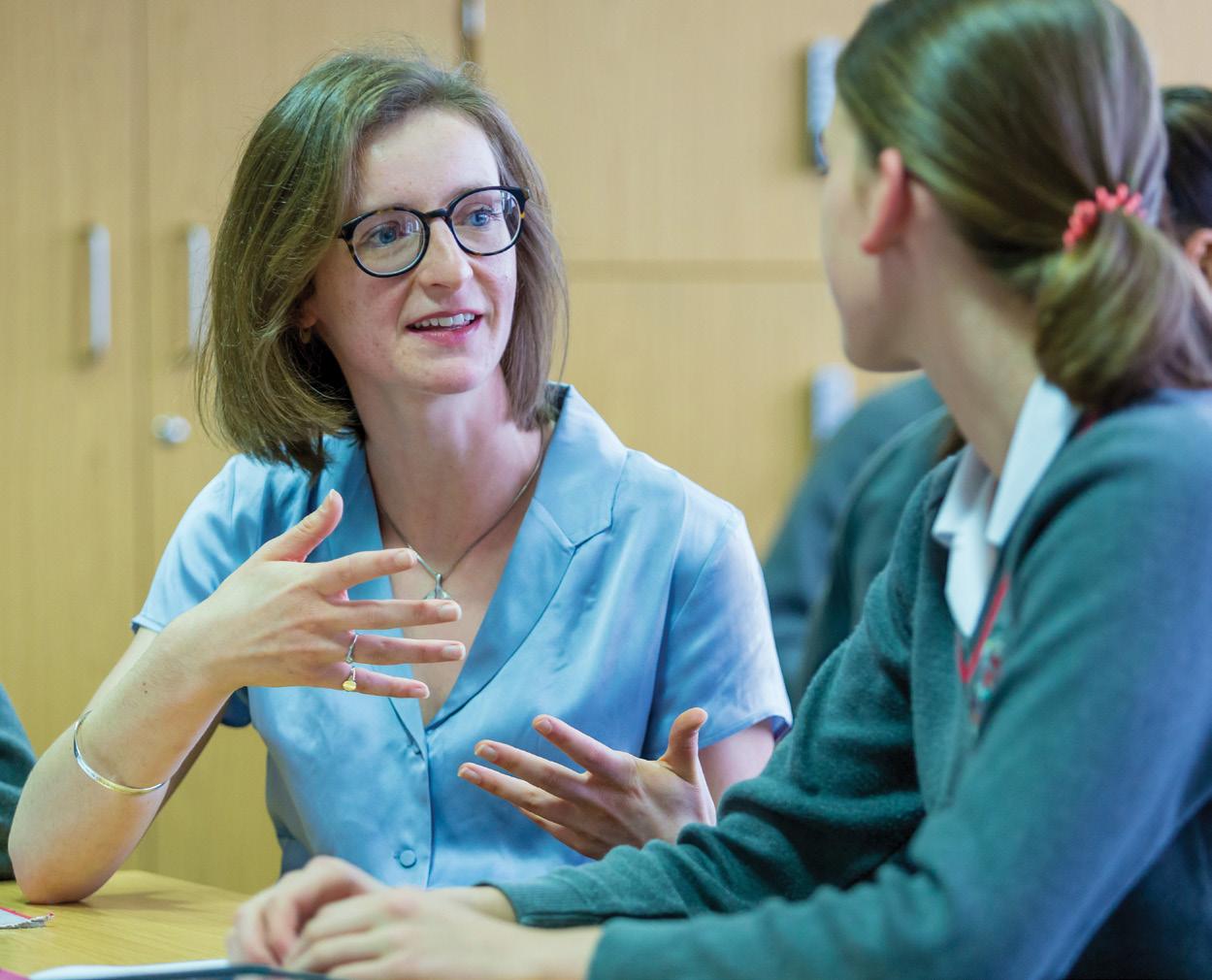
The Upper School has some unique and special features which will help to make these two years particularly memorable.
Developing as an independent learner
Awaiting you in Upper School is a variety of support and encouragement to help you navigate your way through GCSEs and to look confidently ahead towards the Sixth Form. We actively encourage you to take an independent approach to school work and will guide you through techniques to help you organise yourself efficiently, learn effective note-taking as well as refining your revision skills. When you reach the Upper Fifth you will further be able to put this into practice with a study period each week to help you manage your increasing workload within the school day.
Throughout the two years, we will take you beyond the academics and stimulate your interest in the world around you. In the Upper Fifth we have an enrichment programme that runs once over the two week timetable as well as whole Upper School assemblies and weekly form time slots to nurture your curiosity about innovations and developments in the world today.
We are also keen for you to expand your personal intellectual horizons. The Martindale Prize is awarded to a pupil in Lower Fifth / Upper Fourth who has responded to a topic in a stimulating and challenging way. Recent topics include: ‘What is it to be human?’ and ‘What makes life better?’. A shortlist of entrants present their research to a small panel of judges, and the winner will present to a school audience of pupils. It is a superb way to enable pupils to have a taste of independent research; they enjoy the freedom to explore something different from their GCSE courses.
Developing your place in the school
Mrs Brown, Mrs Searle and Miss Nicholl welcome ideas from both year groups through discussion groups where pupils are invited to present ideas and explore matters of concern that are unique to Upper School. Wherever possible we will work with pupils to find solutions and are always looking for ways to make your experience even more exciting. This, in addition to school council, is an excellent opportunity to air your voice. As the pupils move up the school, they play an important role in looking after younger pupils. Each Lower Fifth will be allocated a new Third to ‘buddy’ in September and activities are arranged to enable the pupils to get to know one another and embrace the community spirit of LEH.
Last, but by no means least, we appreciate that Upper School will bring a different level of hard work and so we are ready to spice up the year with some fun. With established activities such as Lower Fifth Team Building Day and an Upper Fifth post-mock examination treat, we want you to be able to connect with your peer group, enjoy well-earned downtime, and above all be able to celebrate your efforts.
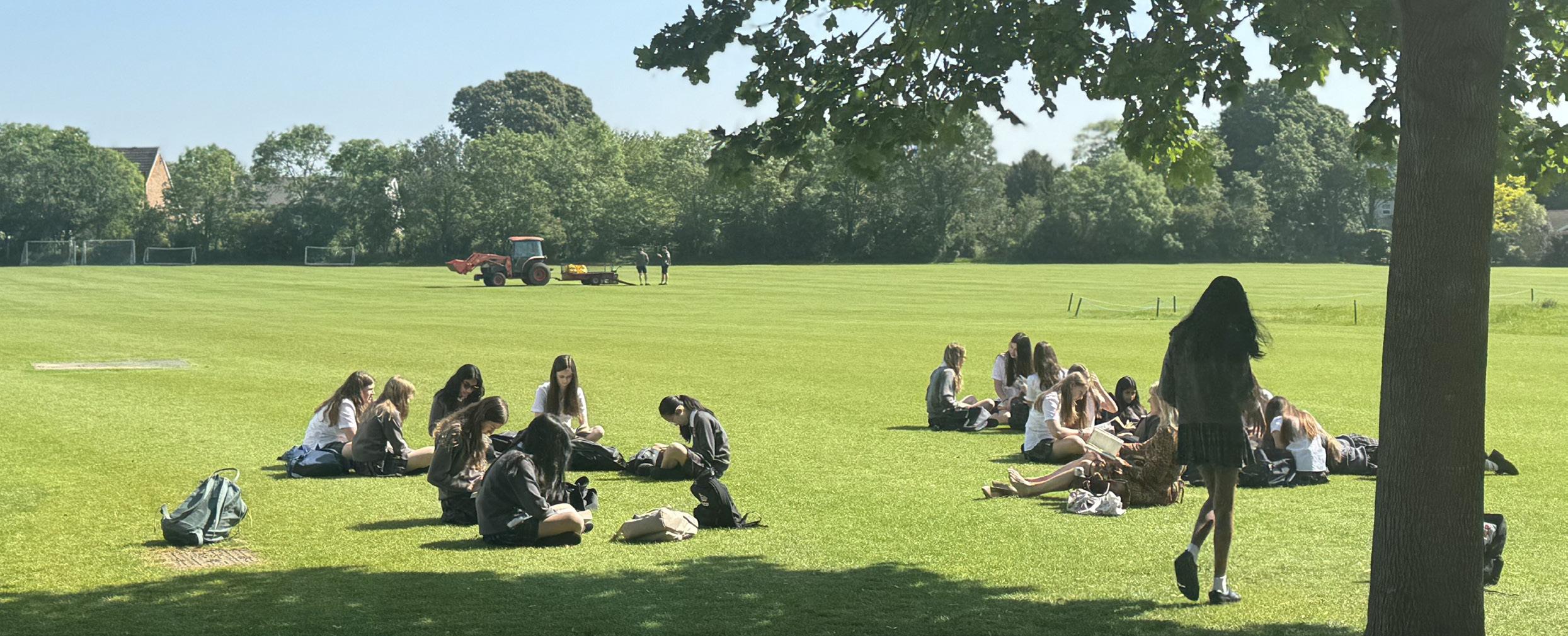
Your health and wellbeing is of the utmost importance to us.
You will find that most of your time in the Upper School will be fun and fulfilling. But there can be occasions when you need our support, and we have a dedicated team ready to provide assistance. Our approach is to provide you with a safety net. We encourage you to grow more confident in dealing with difficulties, but we are ready to leap into action if a problem is overwhelming.
There is a clear pastoral structure of support
The two Form Tutors allocated to each Form are the first point of contact with minor anxieties and concerns. A dedicated Head of Year also provides an additional layer of academic and pastoral support. They are each assigned to a year group and will work closely with the pupils and their Form Tutors for the full two years. The Upper School pastoral team also oversee the Upper School Mentoring Scheme, where pupils who may need further academic support are monitored more closely. A supportive approach is adopted and pupils are encouraged to set regular targets so that they can build their sense of achievement.
Ms Ellison is Head of Upper School, and has the overarching responsibility for the academic and pastoral needs of the pupils.
We love getting to know you as individuals, so please always feel free to drop in and see us for a chat.
We’re always there to listen
There are two dedicated School Nurses, who are always ready with a willing ear and helpful advice, medically or otherwise. The School also employs two counsellors. Pupils can be referred by Ms Ellison, Mrs Brown, Miss Nicholl or the School Nurses, or they are allowed to self-refer, should they wish to do so. In addition, our Upper Sixth Peer Mentors are available at lunchtimes if you want to drop in for a chat.
Wellbeing and happiness curriculum
Although we have lots of people for the pupils to talk to, who can support and assist, we want to teach them how to look after their own health and wellbeing. In the Upper School the pupils have wellbeing and mindfulness lessons within the Life Advice curriculum, which help them to develop their own toolkit for life.

How is life in the Upper School different from life in the Middle School?
Having different Form groups from the last three years is a really good opportunity to meet new people as well as good preparation for making new friends in the future. It is really nice to have subjects with different people, too. Lessons are quite similar to previous years and the work is a good continuation from Middle School.
What are you most looking forward to about the next two years?
I’m really looking forward to being able to do Silver Duke of Edinburgh this year, as well as work experience at the end of Upper Fifth.
What do you recommend about the Upper School?
Being able to study subjects in more detail is great. Although it is more challenging because the courses are harder and the exams are national, the teachers really support us through it so it is enjoyable.
How do you feel about the pastoral system?
I have always felt well supported throughout the school and there are a number of people I know I could approach if I felt I needed to. It is really good that the school has two counsellors who come in regularly for the pupils to talk to.
What surprised you most about the Upper School?
As we are doing more subjects that we ourselves have chosen I find that everyone in my classes seem more interested and invested. It is really nice to be surrounded by other people who share the same interest in a subject that I do. Yes, the work load has increased, however, I really feel like my teachers are trying to get the best from me. Although sometimes it feels like there is a lot to do I have really improved my organisation and time management as I have learnt to balance NEA s with regular homework and my extra curriculars.
What differences have you noticed since joining the Upper School?
There is more mixing with the older years - in sports, we train with the Sixth Formers and the same happens in the Music Department. There are so many opportunities to build
relationships across the year groups. In Life Advice we have had a lot more external speakers come and talk to us, it has been really nice to hear from people who are so passionate about their area of expertise.
The LEH GCSE curriculum is constructed specially to ensure that you have a broad and balanced spread of subjects. We recommend that your choices cover a good range of subjects, from the ones we offer. This will give you the flexibility necessary, whatever direction you choose in the future.
Don’t worry if you do not have a clear idea about your future in terms of A levels, university or career; these decisions are a long way off. If you follow the advice we give, you will make subject choices which keep all doors open. The most important thing is that you choose subjects you enjoy, find interesting and which present you with a challenge: this is the route which will lead to success. It is quality, not quantity, which counts at this stage, and our usual offer of 10 subjects is more than enough for any university or college.
GCSE choices are made during the Spring Term of the Upper
Compulsory
Compulsory
Optional
Subjects
English Language
English Literature
Mathematics
Combined Science or Separate Science
(Biology, Chemistry and Physics)
MFLs
French
German
Mandarin
Spanish
Humanities
Classical Civilisation
Geography
History
Religious Studies
Other Options
Art
Art Textiles
Classical Greek
Computer Science
D&T Product Design
Drama
Food Preparation and Nutrition
Latin
Music
Physical Education
Fourth year. To assist in making choices, every pupil has an interview with a member of the Careers Department and has the opportunity to discuss subject choices with her teachers. Each Head of Department gives a talk to the Upper Fourth year about their subjects at GCSE and pupils discuss their choices with their Form Tutor.
Our key goals are for pupils to maintain maximum breadth in their choices, but also to choose the subjects they enjoy most. Therefore we always insist on one Modern Foreign Languge and one Humanity.
Notes and important information
Mathematics is compulsory but the additional Mathematics course ‘FSMQ’ is optional.
Choosing Combined Science will combine with five other choices. Choosing Separate Science will allow four other choices.
Pupils must choose one out of French, Spanish or German. They may also choose a second (and even third) MFL (including Mandarin), but cannot begin a new MFL at GCSE.
Pupils must choose a minimum of one Humanity.
Pupils can not take both Art and Art Textiles.
Pupils are advised to only choose Classical Greek if they are studying Latin.
Pupils cannot choose both Food Preparation and D&T Product Design.
We recommend that pupils choose a maximum of two options which have NEAs (Non-Examination Assessment). This would include: Food, D&T Product Design, Art, Drama, Music and Physical Education.
The school makes every effort to accommodate all pupils’ subject choice combinations. Greek is not a curriculum subject in the Middle School. The School reserves the right not to offer courses, should demand prove insufficient.
The greater choice that pupils have over their programme of study inevitably means that the teaching and learning experience in the Upper School differs considerably from younger years.
While the strong pastoral support which pupils receive in their Form groups continues into the Lower Fifth year and beyond, lessons are now exclusively taught in subject groups. Pupils are therefore studying with those who share their academic interests, taught by expert teachers who are passionate
Q: How are GCSEs now graded?
A: Rather than having grades A* to G, the GCSEs have grades of 9-1, with the top grade being a 9 (see table) and a 4 being the ‘pass’ grade. Broadly the same proportion of pupils nationally will achieve grades 9-4 as previously achieved grades A*- C. The top grade of A* has been split into two separate grades (8 and 9). The grade 7 is a direct equivalent of the A.
Q: What about IGCSE?
A: Some departments, because they feel it is the most appropriate qualification, have chosen to study IGCSE. In the same way as the GCSE, the IGCSEs we take have a 9-1 grading.
about their subjects. Higher level research and independent learning skills are nurtured, and there are many opportunities for pupils to develop further academic interests outside the classroom, through subject clubs, and inter- school and national competitions.
Grading GCSEs from 2017
A comparison of 9-1 with A*-G grading systems.
“Teaching approaches encourage pupils to develop higher-order thinking skills.”
ISI Report 2022
The Upper School years at LEH are about much more than gaining good examination results.
However, GCSE examination results are increasingly used as the first screening process by university admissions tutors. It is therefore very important indeed that pupils choose subjects based on their aptitude and interest. In our many conversations with universities, we are told that, at this level, it is the grades rather than the subjects which are of importance. We also firmly believe that pupils should study as broad a range of subjects as possible to keep as many doors open to them as possible for Sixth Form study.
We are very proud of the pupils’ results, which have proved exceptional over a sustained period of time. The graph below shows the average examination results over recent years, illustrating the percentage obtained at each grade. There is also a graph showing the statistics for last summer.
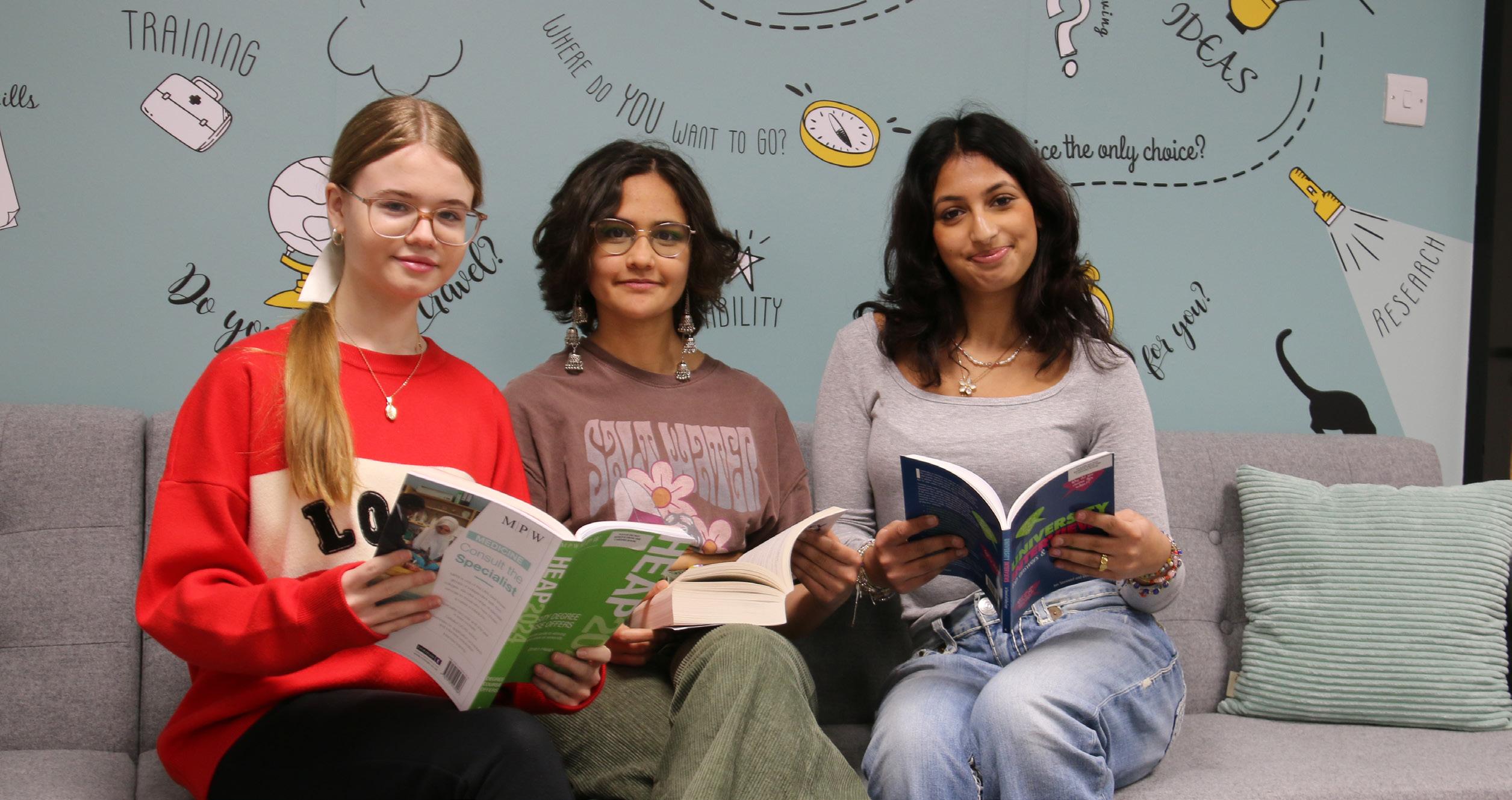
The Upper School Careers Programme is designed to encourage pupils to link their interests and skills with appropriate A level choices and possible future career paths.
Lower Fifth
• Structured sessions using the resources available in the Careers Room.
• Introduction to Unifrog, a software programme specifically designed for this age group to match interests and aptitudes with particular careers which pupils can then research using the same programme.
• InvestIn Work Experience organisation talk.
Upper Fifth
• Psychometric questionnaire, hosted by the Morrisby organisation. This leads to a comprehensive report suggesting subjects and careers the pupils may be interested in based on their interests and skills.
• A one-to-one interview with a member of the LEH Careers Team when the pupils consider their A level choices and implications for degree choices and future careers.
• Careers Events – hosted by LEH and Hampton School.
• Work Experience during the summer holiday after their GCSE examinations.
All pupils are encouraged to use the lunchtime ‘Drop-In’ sessions where they can meet with a member of our Careers team. This provides an excellent opportunity to discuss work experience plans, apprenticeship opportunities and future careers, or seek advice on using the many resources available in the Careers Library.
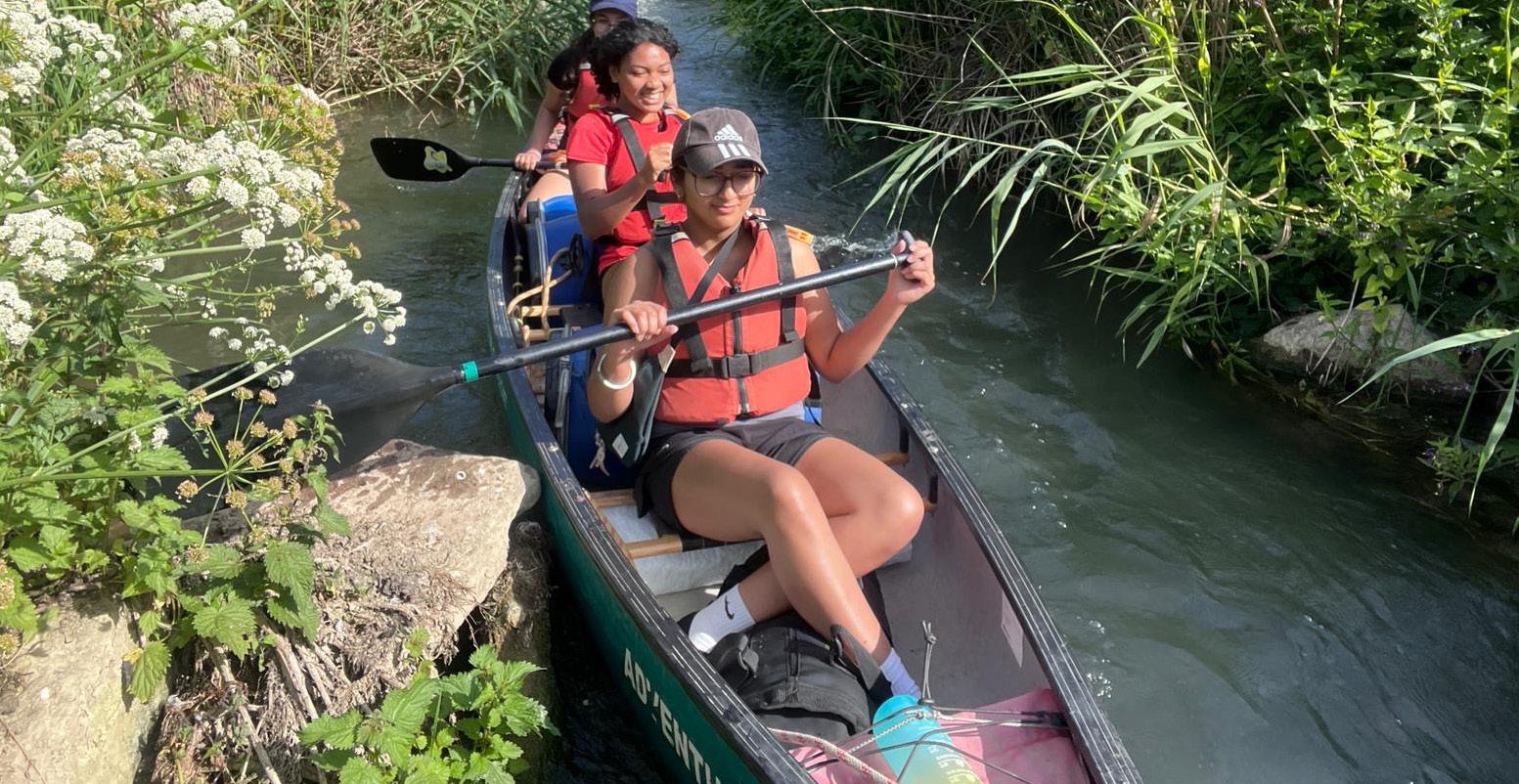
• Classics Society
• Duke of Edinburgh’s Silver Award Scheme
• British Informatics Olympiad
Upper School years offer the ideal opportunity to develop existing interests or skills further, and to explore new ones.
The wide range of activities offered in the younger years is enhanced with new activities, some run jointly with the Sixth Form, creating opportunities to develop further subject passions, leadership skills, and to undertake service in the local area. Many pupils continue to develop their sporting, musical and theatrical skills, taking increasingly senior positions in their teams or ensembles, and having the opportunity to audition for leading roles.
LEH pupils are generous with their time and talents, and we encourage them to maximise these opportunities to make their mark on both the school and the wider community.
Community Projects
There are a variety of community projects which pupils in the Upper School can contribute to. Over recent years these have included the following:
• Organising charity events
• Service Volunteers
• Assisting with a variety of lunchtime activities at local schools:
Buckingham Primary School
Carlisle Infant School
Clarendon School
Hampton Hill Junior School
Trips and Activities
There are a wide variety of trips and activities each year, ranging from subject-specific day trips to residential courses and study trips abroad, some run jointly with the Sixth Form. Varied and stimulating trips are a real feature of Upper School years, and are outlined in more detail in the subject pages.
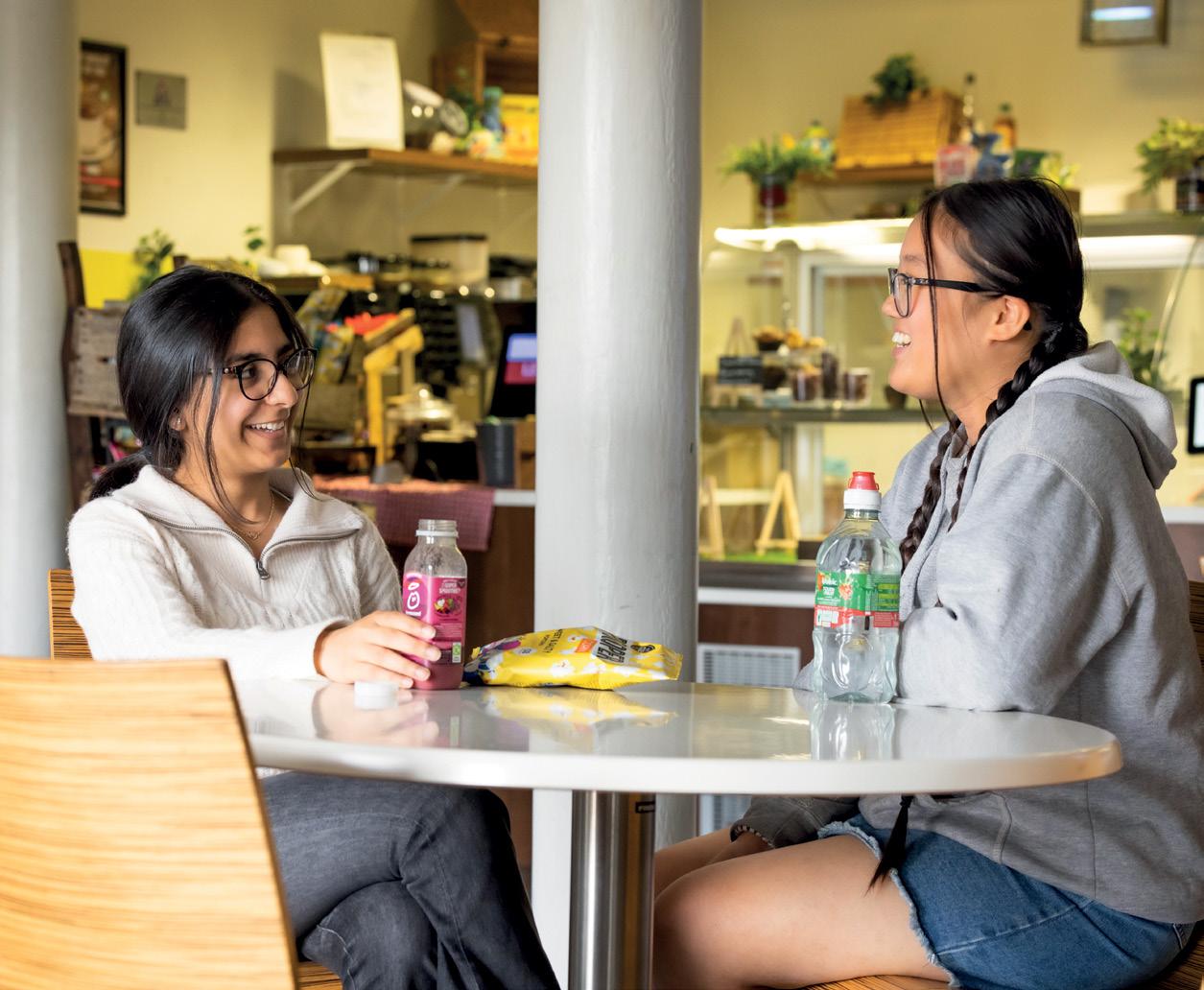
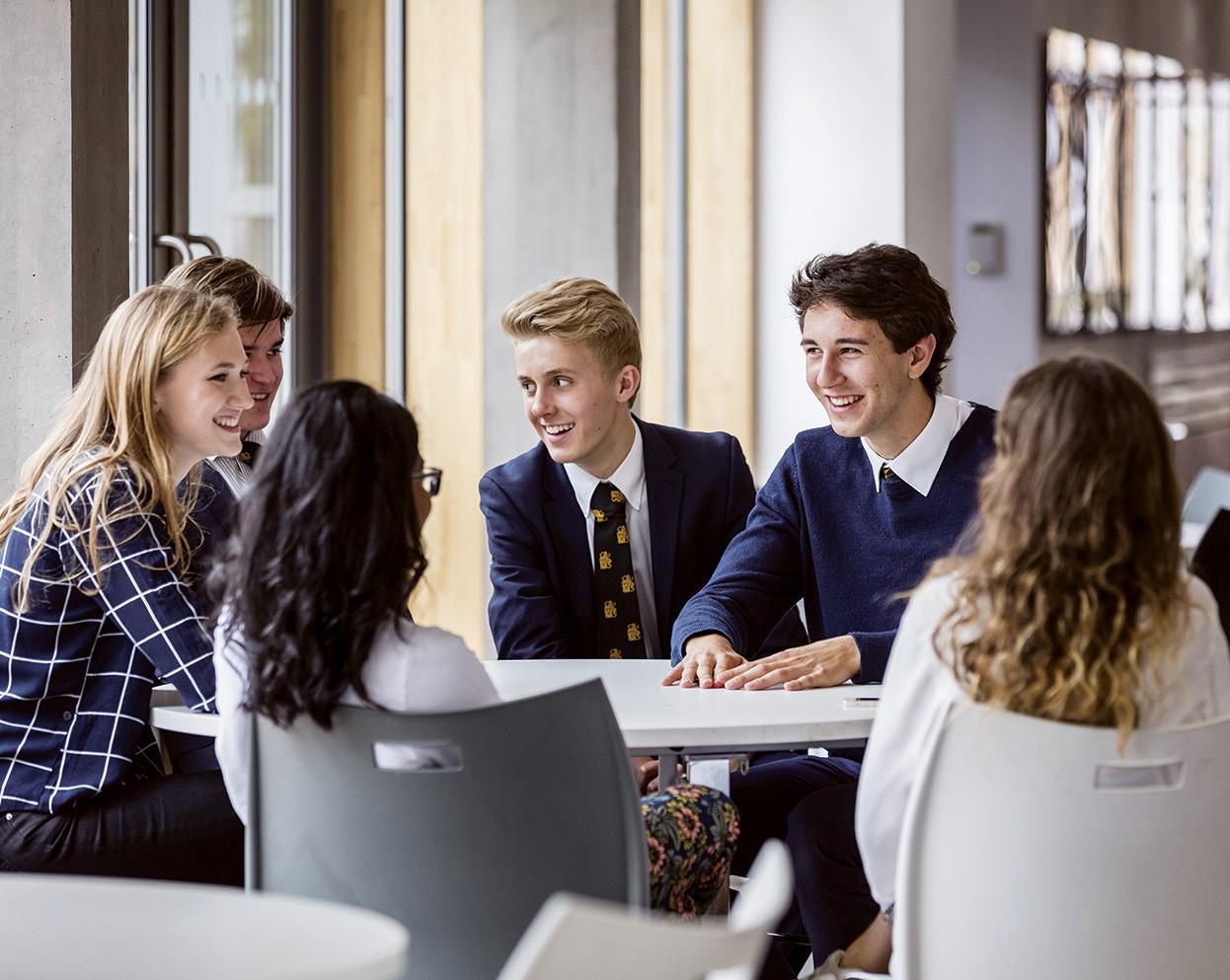
We offer a full programme of events to introduce pupils in the Upper School to the Sixth Form experience at LEH.
Lower Fifth Day as a Sixth Former
In the last week of the Summer Term of the Lower Fifth, pupils are invited to attend school in the role of a Sixth Form student. They have the use of one of the Sixth Form Common Rooms for the day and they are able to choose a bespoke timetable from a choice of all the Sixth Form subjects. The aims are to give them a taste of life as a Sixth Former at LEH and to help them choose their subject options later on. In the evening, all Lower Fifth pupils and their parents are invited to school for a more detailed overview of life in the Sixth Form, presented largely by current Sixth Form students.
Sixth Form Academic Open Evening
In October, pupils and their parents are invited to attend the Sixth Form Academic Open Evening. Tours of the teaching rooms, the common rooms and the Sixth Form Library are available, and pupils and their parents are encouraged to talk to staff and current Sixth Formers about the A level experience, and subjects.
GCSEs and after
In order to give the pupils a taste of the greater freedoms in the Sixth Form, Upper Fifth pupils do not need to wear school uniform in the Summer Term.
After their GCSE exams, pupils are invited back to school for a day to help prepare them for Lower Sixth. Pupils have the opportunity to meet the Heads of Department of the subjects they are studying in the Sixth Form and there are talks on various aspects of Sixth Form life, including the drama opportunities and the House Film Festival.
Pupils who are joining LEH for the Sixth Form also attend, providing an excellent opportunity for current pupils to get to know them, and welcome them to the school.
“The sense of independence that comes with life in the Sixth Form allows you to develop as a person and take control of your ambitions.”
Sixth Form Student

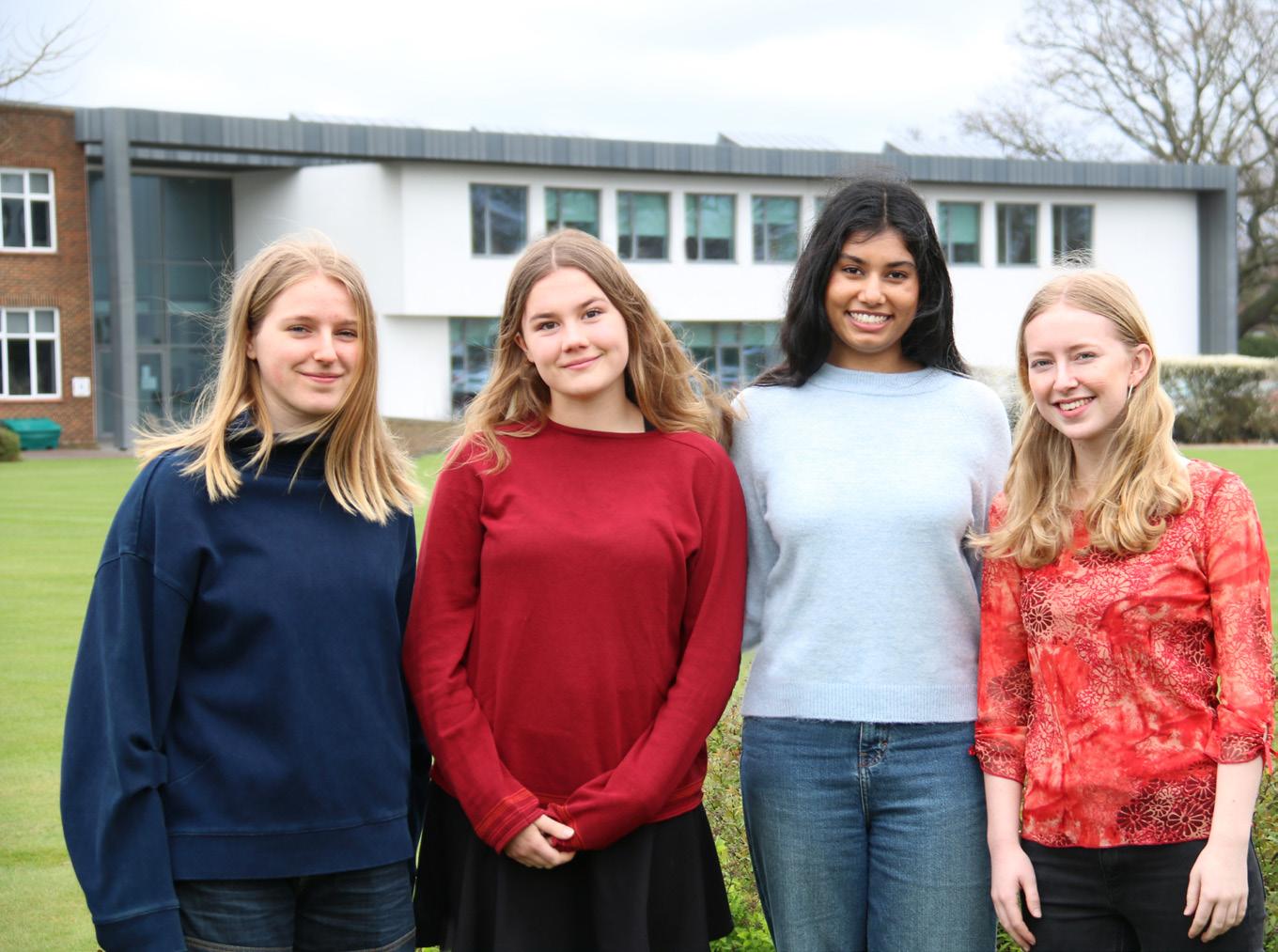
The two most exciting and diverse years of your academic life.
The three or four subjects you study in the Lower Sixth will form the bedrock of your academic experience. In addition, you will benefit from a range of other challenges, trips and opportunities.
As well as academic lessons, you’ll learn by taking part in activities such as sport, music, drama, Young Enterprise, Model United Nations, Combined Cadet Forces and joint enrichment lessons with the Sixth Form pupils at Hampton School. Mentoring younger pupils will deepen and enrich your outlook on the wider world. You’ll develop leadership skills by taking on roles within our House system and on committees, such as the Charity Committee. These experiences stay with you for the rest of your life.
LEH pupils leave for university well-rounded, grounded and intellectually curious, and go on to thrive in a range of academic settings. They know how to realise their full potential, contribute to their communities and retain a sense of fun, purpose and direction in everything they do.
Mark Tompsett Head of Sixth Form
Sixth Form life at LEH is a completely new experience
The Sixth Form is a close-knit student community where we are encouraged to reach our full potential by teachers and our peers alike. Classes are much smaller in Sixth Form, meaning that teachers and pupils get to know each other and can build strong relationships. There are vast opportunities for delving further into the subjects we love, and the Sixth Form environment is really conducive to personal development and preparation for the future.
The extensive array of opportunities offered is incredible, ranging from enrichment sessions, to fascinating lectures, and a whole host of extra-curricular activities. Much of what is on offer in Sixth Form can also be student-run, leaving a space for new ideas all the time. From the start of Lower Sixth, there are also chances to hold positions of responsibility, allowing you to develop leadership roles and get to know younger pupils.
The Careers Programme is really varied, and we have received so much support in helping us choose our future paths. The facilities available for us are great; the Sixth Form Library has subject-specific books to help with research projects and essays, and the Café is an excellent place to relax with friends whilst enjoying a cup of tea!
Life in the Sixth Form has meant that we all have the opportunity to thrive, and really develop a passion for our subjects in an incredibly supportive and motivating atmosphere.
Head Girl Team
All pupils are prepared for IGCSE English Language and IGCSE English Literature; these courses are taught in an integrated way.
English Language
Course details (Edexcel 4EA1)
Pupils will build on their existing reading skills by studying a stimulating range of texts, including non-fiction and literary non-fiction, such as: journalism, speeches, journals, autobiographies and travel writing. Some poetry is also studied as part of the coursework component. Pupils should be able to demonstrate their understanding of material from a variety of sources, explore the ways in which writers achieve their effects, and consider links and connections across texts and writers. They will also learn how to construct and convey meaning in their own writing, matching style to purpose and audience. In addition, pupils are required to develop their understanding of spoken English through participation in speaking and listening activities.
Component 1:
Non-fiction Texts and Transactional Writing
2 hours and 15 minutes examination
60% of total IGCSE grade
Component 3:
Poetry and Prose Texts and Imaginative Writing
Coursework portfolio: two internally-assessed assignments
(one essay; one imaginative writing task)
40% of total IGCSE grade
English Literature
Course details (Edexcel 4ET1)
Pupils will study a range of texts. These may include J.B. Priestley’s An Inspector Calls or Diane Samuels’ Kindertransport, a Shakespeare play such as Macbeth, a modern novel such as Of Mice and Men or To Kill a Mockingbird, and a range of twentieth-century and contemporary poetry from the Edexcel Anthology. They will also hone their skills of critical analysis through work on unseen poetry.
Component 1:
Poetry and Modern Prose
2 hours examination
60% of total IGCSE grade
Pupils answer one question on an unseen poem, one question requiring comparison of two poems studied in the Edexcel Anthology, and one question on a modern novel. All questions require pupils to demonstrate detailed analytical skills, as well as consideration of the relationships between texts and their contexts.
Component 3:
Modern Drama and Literary Heritage Texts
Coursework portfolio: two internally-assessed assignments (one essay on a modern play and one essay on a literary heritage text, either a play or a novel)
40% of total IGCSE grade
Beyond the classroom
There are several extra-curricular opportunities for pupils, including theatre trips to see productions of set texts such as Macbeth and An Inspector Calls. Debating Club meets once a week and there are opportunities to participate in both debating and public speaking competitions at local, regional and national level. In addition to opportunities to contribute to the English Department’s various creative writing and playwrighting initiatives, pupils are encouraged to enter regional and national writing competitions and global events such as World Book Day, World Poetry Day and Black History Month. Pupils are also invited to participate in specialised workshops and lectures given by visiting speakers who are experts in their fields of English study.
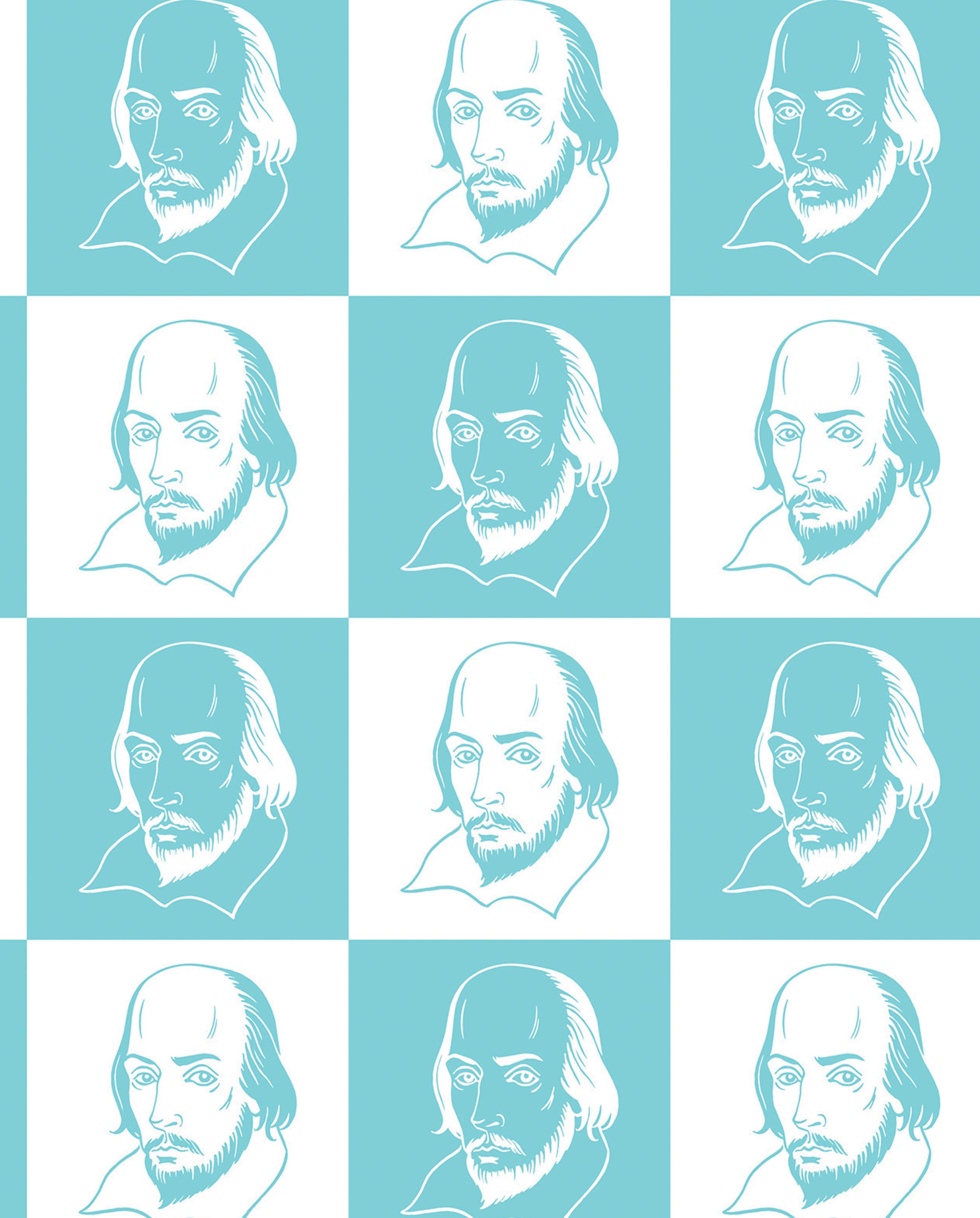
Mathematics is compulsory for all pupils in the Upper School.
Mathematics is a fascinating subject and develops many vital skills, including logical thinking and problem solving. It has a key role in the development of science, is fundamental to the study of engineering, and is increasingly used in medicine. Perhaps less well known is its role in the social sciences and economics. Surprisingly, you will find an element of mathematics in most of your GCSE options.
Course details (4MA1)
The Edexcel IGCSE Mathematics course has been selected by the Department for its excellent preparation for further study in Mathematics. It probes deeper into areas already studied in previous years and introduces key concepts such as Differentiation, Functions and Set Theory which are an integral part of the A level syllabus.
Pupils will continue to be taught in divisions. All divisions and all pupils follow the same curriculum and the same scheme of work. The main difference between the divisions is the size of the group, the depth of study, and the pace at which topics are taught.
All pupils will take the Higher Paper with grades 9– 4 available. The assessment for the final grade is based on two 2-hour papers. The style of these papers is similar to those used for internal assessments and examinations and pupils will become more confident as they progress through the course. There is no coursework requirement in IGCSE Mathematics.
FSMQ (OCR 6993)
(Free Standing Mathematics Qualification)
All pupils have the chance to pursue an additional Mathematics qualification, which runs concurrently with the IGCSE programme throughout Senior School. In the Autumn Term of Upper Four, pupils will undergo a suitability test, coupled with consultations with their Mathematics teachers, to help them determine if this is a suitable option for them. The FSMQ is a demanding course which acts as a bridge between GCSE and A level Mathematics. It is important to note that completing this course is not mandatory for A level Single Mathematics, but we expect pupils aspiring to pursue Further Mathematics at A level to complete the FSMQ.
Beyond the classroom
Are you ready for the challenge?
All Lower Fifth pupils are entered for the Intermediate Mathematical Challenge which involves logical thinking and problem solving. This is optional for Upper Fifth pupils.
In addition Upper Fifth pupils are invited to participate in the Maths Olympiad for Girls alongside Lower and Upper Sixth pupils.
Example: The Queen of Spades always lies for the whole day or always tells the truth for the whole day.
Which of these statements can she never say?
A Yesterday, I told the truth.
B Yesterday, I lied.
C Today, I am telling the truth.
D Today, I am lying.
E Tomorrow, I shall tell the truth.
Maths Clinic
For any pupil who needs additional support with Mathematics, a drop-in Maths Clinic is available two lunchtimes each week.
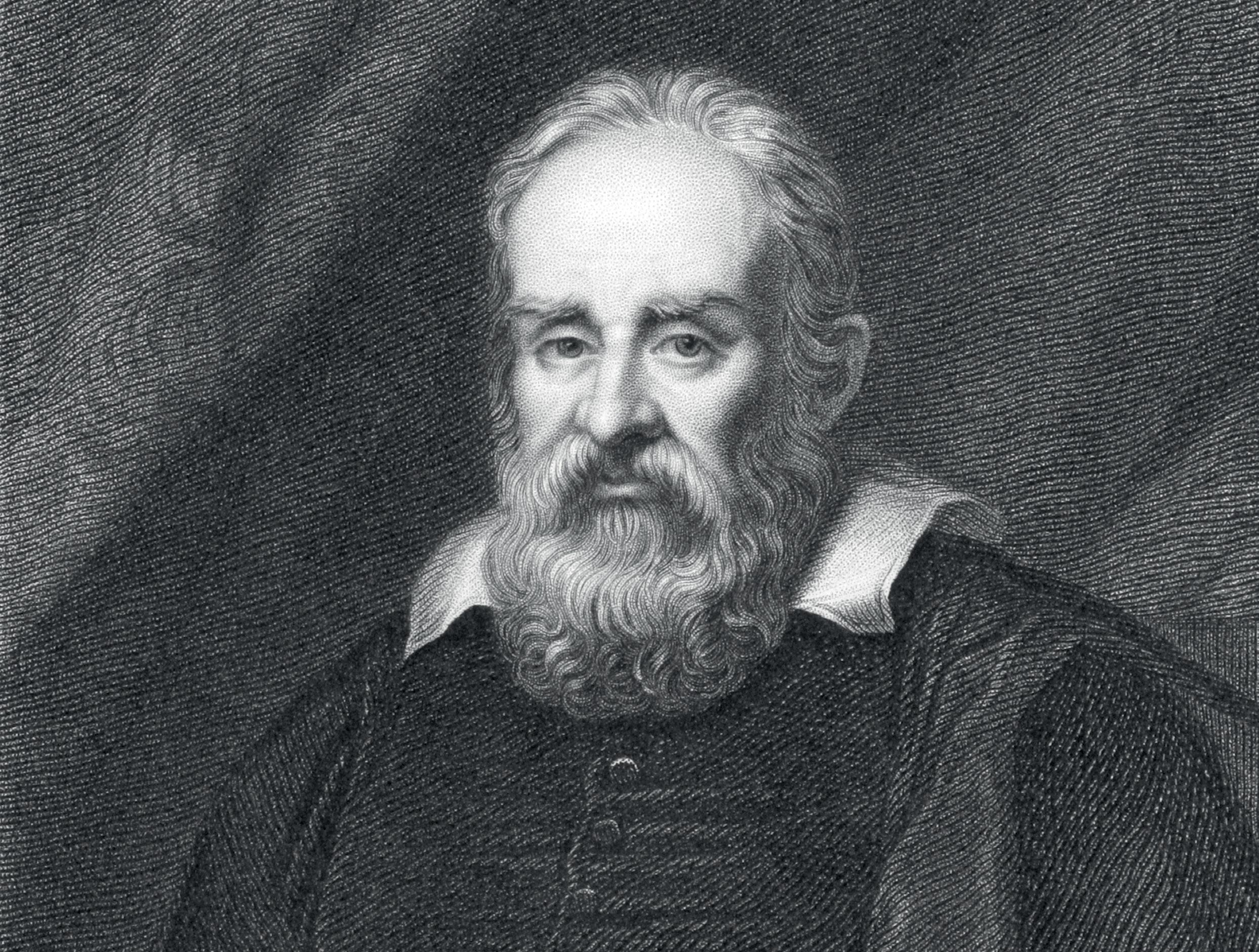
“If I were again beginning my studies, I would follow the advice of Plato and start with Mathematics.”
Galileo Galilei

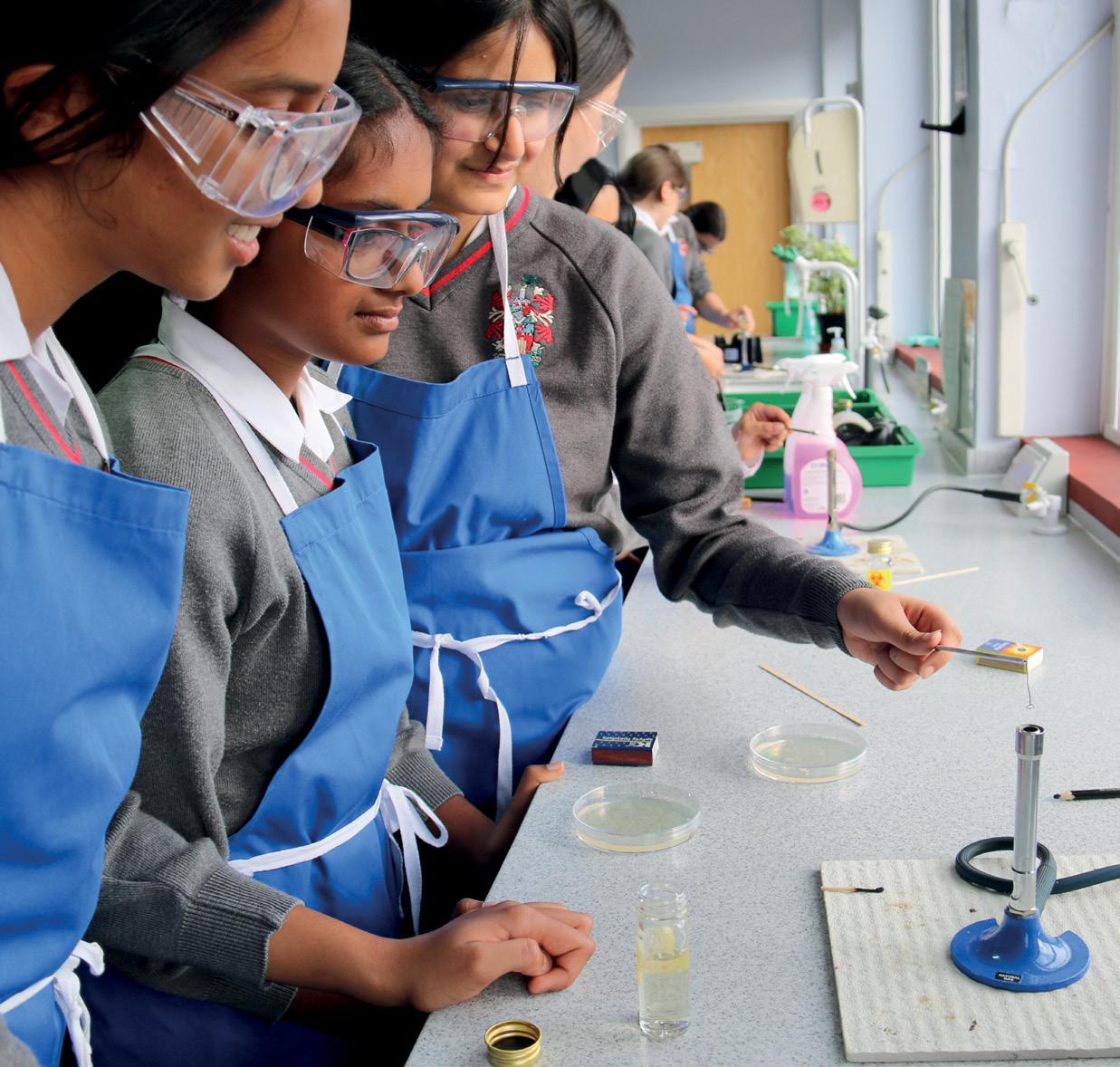
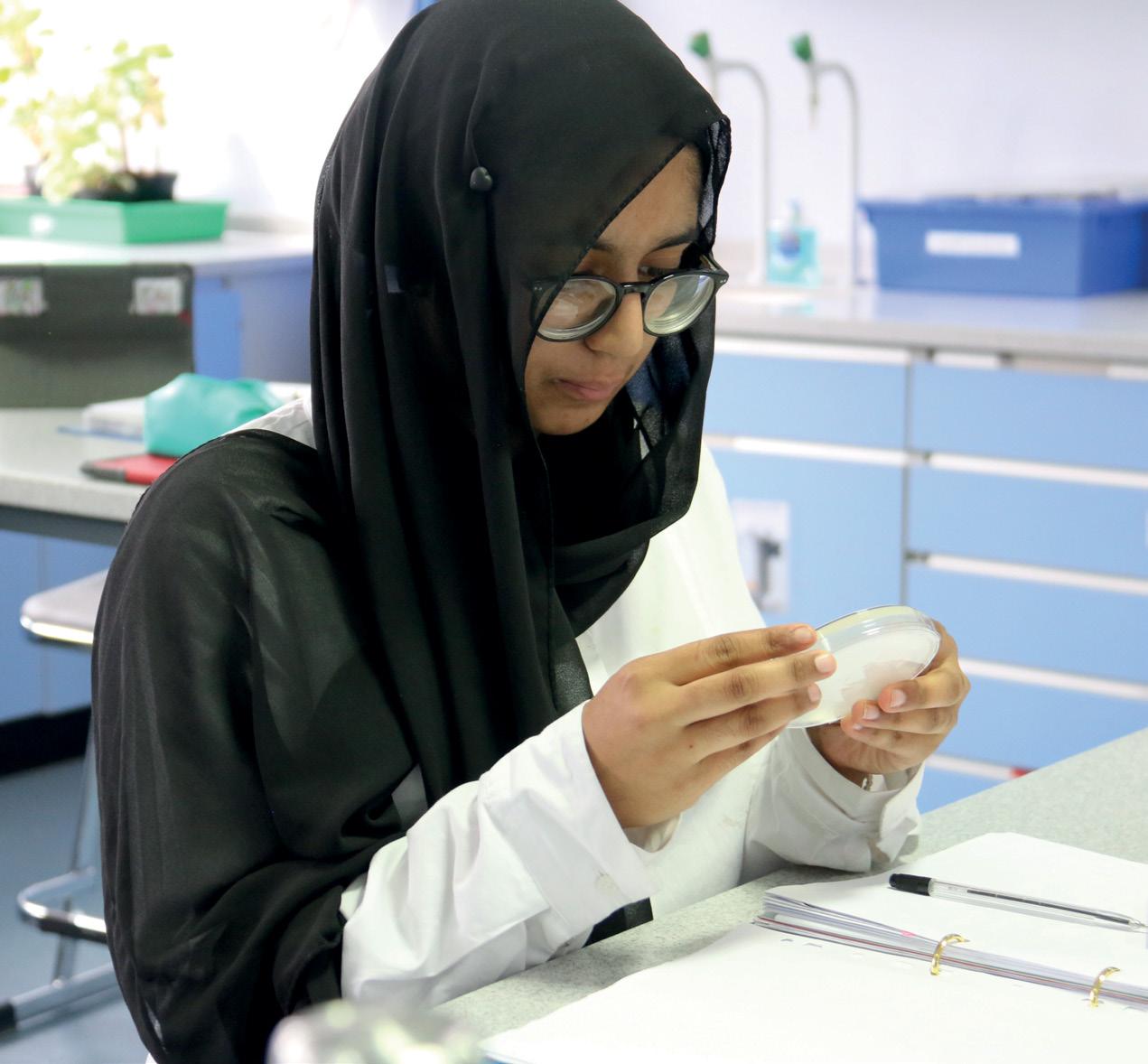
The three GCSE Sciences are studied as independent subjects with specialist teaching staff in each discipline. GCSEs in Biology, Chemistry and Physics are awarded at the end of the Upper Fifth year. This is a brilliant option for those looking to continue with one or more sciences at A level and beyond. Pupils considering this option should have a genuine interest and enthusiasm for the sciences.
Biology (1BI0)
Biology is the study of living things. The Edexcel GCSE Biology course offers you an opportunity to learn about life processes in greater depth and reflects the ever-changing face of Biology in the world. Biotechnology, genetic engineering and areas such as stem cell research are included in this exciting and dynamic course. If you are interested in pursuing Biology at A level, or indeed beyond school, GCSE Biology is a good place to start. There are nine topics which go into more detail than those studied in the GCSE Combined Science.
1. Key concepts in Biology
2. Cells and control
3. Genetics
4. Natural selection and genetic modification
5. Health, disease and the development of medicines
6. Plant structures and their functions
7. Animal coordination, control and homeostasis
8. Exchange and transport in animals
9. Ecosystems and material cycles
Chemistry (1CH0)
Chemistry looks at explaining trends and patterns in the behaviour of the elements of the Periodic Table and the vast array of materials that are formed from them - including you and everything around you! The Edexcel GCSE Chemistry Course allows you to explore the subject in greater depth and also covers a wider breadth of topics. These include:
1. Key Concepts: Periodic Table, Atomic Structure and Bonding
2. States of Matter and Mixtures
3. Chemical Changes: Acids and Electrolysis
4. Extracting Metals, Equilibria and Chemical Calculations
5. Separate Chemistry 1: Transition Metals, Titrations, Fuel Cells etc
6. Groups 1, 7 and 0 of the Periodic table
7. Reaction Rates and Energy Changes
8. Fuels and Earth Science
9. Separate Chemistry 2: Organic Chemistry, Polymers, Nanoparticles etc
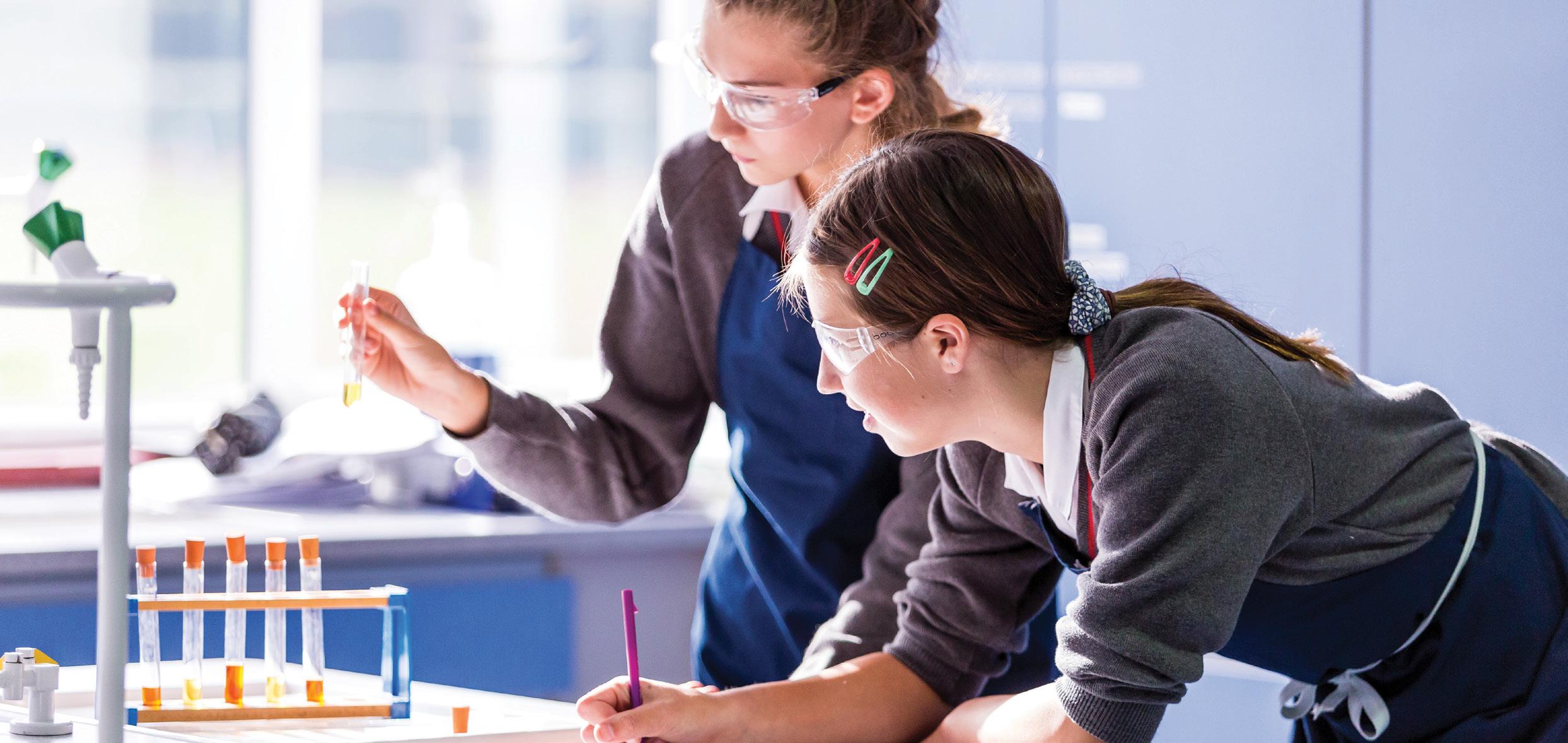
Physics (1PH0)
Physics is the branch of science concerned with the nature and properties of energy and matter. It is the study of the interactions between all things, with the main goal of Physics being to understand how the universe works. Physicists ask the fundamental questions and try to answer them through observation and experimentation. There are 15 topics, some of which are only covered in Separate Science, and others of which are explored in greater detail than in the Combined Science course.
1. Key concepts
2. Motion and forces
3. Conservation of energy
4. Waves
5. Light and the Electromagnetic Spectrum
6. Radioactivity
7. Astronomy
8. Energy and Forces
9. Forces and their Effects
10. Electricity and Circuits
11. Static Electricity
12. Magnetism and the motor effect
13. Electromagnetic Induction
14. Particle model
15. Forces and matter
Assessment
The GCSE Separate Sciences courses are all assessed by two examinations at the end of the Upper Fifth, each of which is 1 hour and 45 minutes long. The papers are worth 50% of the GCSE each.
Within each paper there will be a mixture of questions, including: multiple choice, short answer, long answer and calculations.
There will be questions that relate to the Core Practicals that you will complete in lessons throughout the course. There is no coursework.
“Pupils display highly sophisticated study skills for their age and quickly apply prior learning to new situations.”
ISI Report 2022

This is an alternative approach towards studying all three disciplines of Biology, Chemistry and Physics. You will achieve two GCSEs in Edexcel Combined Science which reflect the reduced content covered in each subject. While still providing a good platform to begin one or more A level science course, this route allows time for another GCSE option to fit into the timetable. Each discipline is taught by a subject specialist.
Biology
Biology is the study of living things. The Edexcel GCSE Combined Biology course offers you an opportunity to learn about a wide range of life processes (all nine topics) in slightly less depth than the Separate GCSE Biology course.
1. Key concepts in Biology
2. Cells and control
3. Genetics
4. Natural selection and genetic modification
5. Health, disease and the development of medicines
6. Plant structures and their functions
7. Animal coordination, control and homeostasis
8. Exchange and transport in animals
9. Ecosystems and material cycles
Chemistry
Chemistry explains the trends and patterns in the behaviour of the elements of the Periodic Table and the vast array of materials that are formed from them - including you and everything around you! The Edexcel GCSE Combined Science Course will stimulate the intellect and imagination. It will give the pupils a passion for the subject and encourage them to care for our environment.
1. Key concepts: Periodic Table, Atomic Structure and Bonding
2. States of Matter and Mixtures
3. Chemical Changes: Acids and Electrolysis
4. Extracting Metals, Equilibria and Chemical Calculations
5. Groups 1, 7 and 0 of the Periodic table
6. Reaction Rates and Energy Changes
7. Fuels and Earth Science
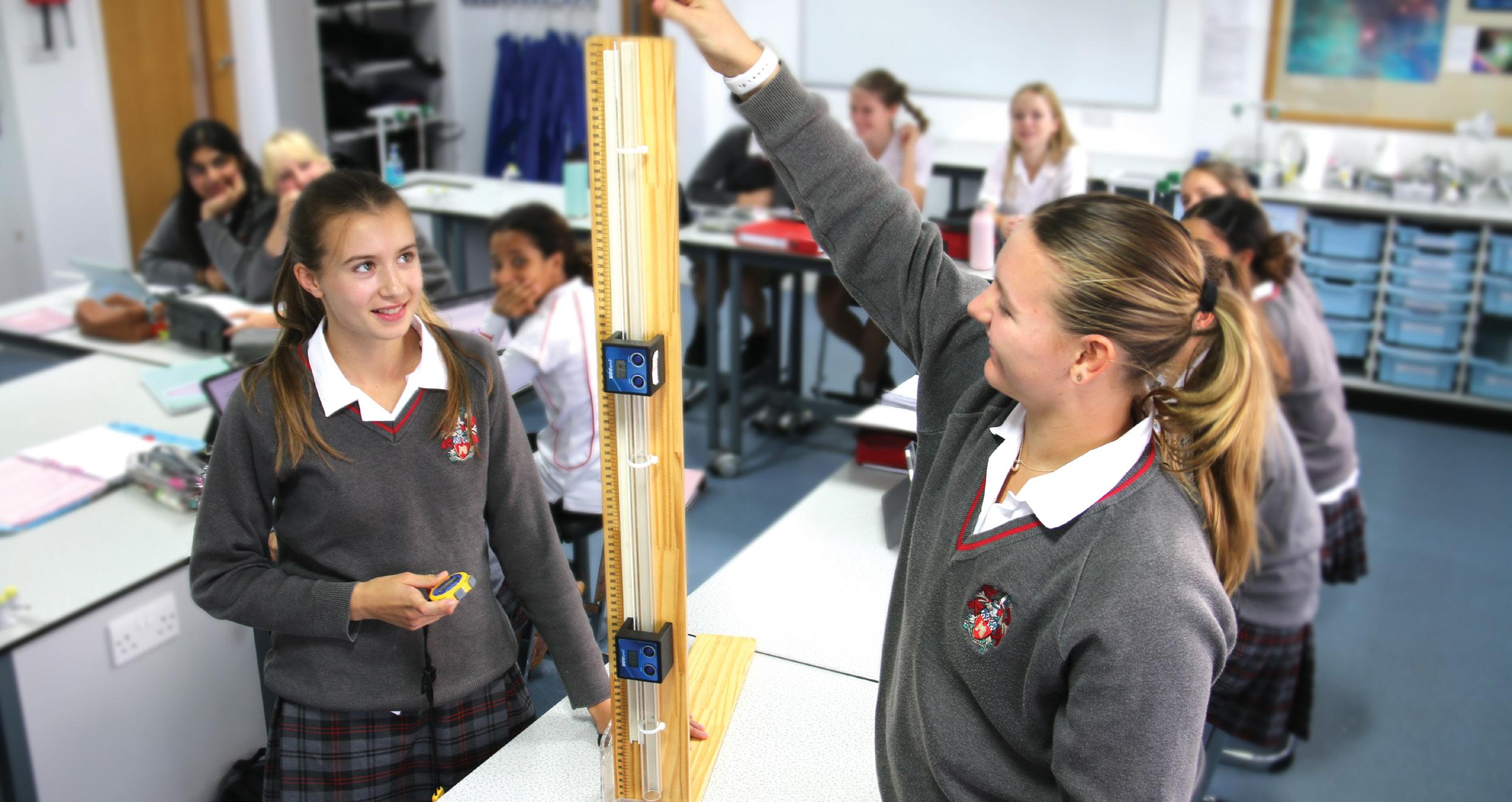
Physics
Physics is the branch of science concerned with the nature and properties of matter and energy. It can be applied to almost any activity and allows pupils to see things in ways that might not be obvious to others. Physicists ask the fundamental questions and try to answer them through observation and experimentation.
1. Key concepts
2. Motion and forces
3. Conservation of energy
4. Waves
5. Light and the Electromagnetic Spectrum
6. Radioactivity
7. Energy and Forces
8. Forces and their Effects
9. Electricity and Circuits
10. Magnetism and the motor effect
11. Electromagnetic Induction
12. Particle model
13. Forces and matter
Assessment (1SC0)
The Combined Science assessment consists of six externally examined higher tier papers that are all completed in May/ June in the Upper Fifth year. Each paper is one hour and ten minutes long, with two papers for each discipline of science. Each paper counts as a sixth of the total which is translated into two grades.
Within each paper there will be a mixture of questions, including: multiple choice, short answer, long answer and calculations.
Some questions will be based on the Core Practicals completed in lessons. There is no coursework.
There are numerous extra-curricular opportunities for Separate Science and Combined Science pupils, including a trip to GCSE Science Live! and hearing visiting scientists talk at school about their work at the cutting edge of their specialisms. Pupils can also attend a range of clubs including STEM club, BioSoc, Astronomy club and Chemistry club.
All Upper School Pupils are invited to participate in the relevant Olympiad Challenges, as well as the Experimental Project. Recent winners of the Experimental Project had their award presented at The Royal Society.
For any pupil who requires additional support with any of the sciences, drop-in clinics are offered in all of the individual sciences each week.


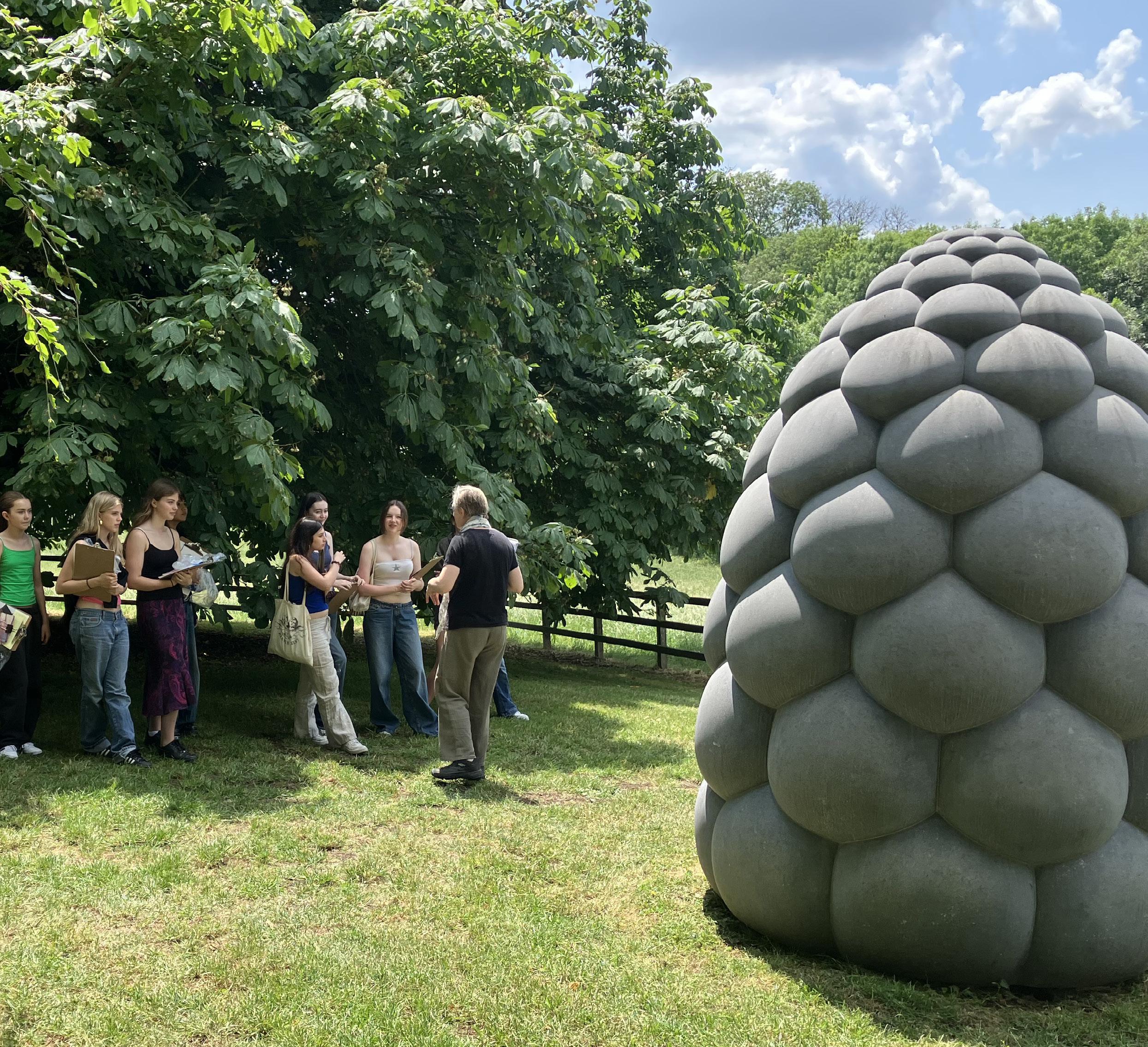
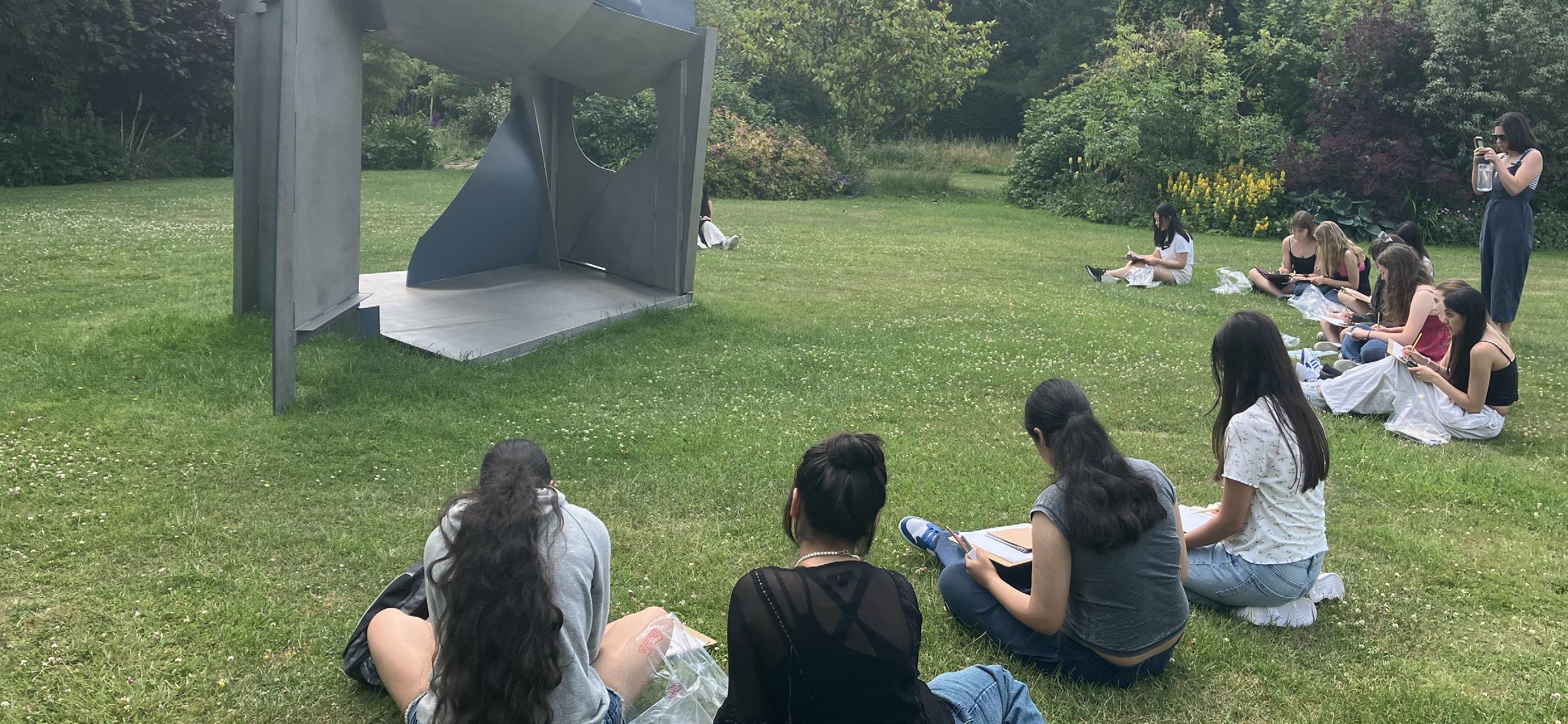
GCSE Art provides an excellent opportunity for all pupils to develop their creative potential. The course is broad based and encourages the use of a wide range of technical processes and creative media. We foster critical and reflective thinkers who will develop a personal knowledge and understanding of historical and contemporary practice of Art, Craft and Design within the context of their own work. We nurture an environment of risk taking, resilience, commitment, imaginative and creative self-discovery.
GCSE forms the important foundation for a higher level of creative study at A level. Over the years LEH pupils have accessed an extremely broad range of high profile Art Foundation and Degree courses and followed successful careers within the creative industries. GCSE is the early stage of this journey and offers key elements to a broader education and can lead to understanding the different roles, functions, advances and consumers of Art, Craft and Design practice as well as nurturing a personal love of the creative process.
Art History and contemporary practice form an important part of the GCSE course.
Pupils are encouraged to visit galleries in order to study first hand sources and develop their own ideas. They will also take part in media-based workshops run by practicing artists.
Course details (OCR J170)
The GCSE is divided into two sections:
Component 1: Portfolio (60% of total mark)
The portfolio consists of two separate projects. Each contains personal research, preparation studies and final outcomes.
• A 2-dimensional project with supporting studies including art historic research and the use of digital media.
• A 3-dimensional project with supporting studies including art historic research.
Component 2: Externally Set Task (40% of total mark)
A personally interpreted project which contains preparation studies and a final outcome to be completed during a timed 10-hour practical exam.
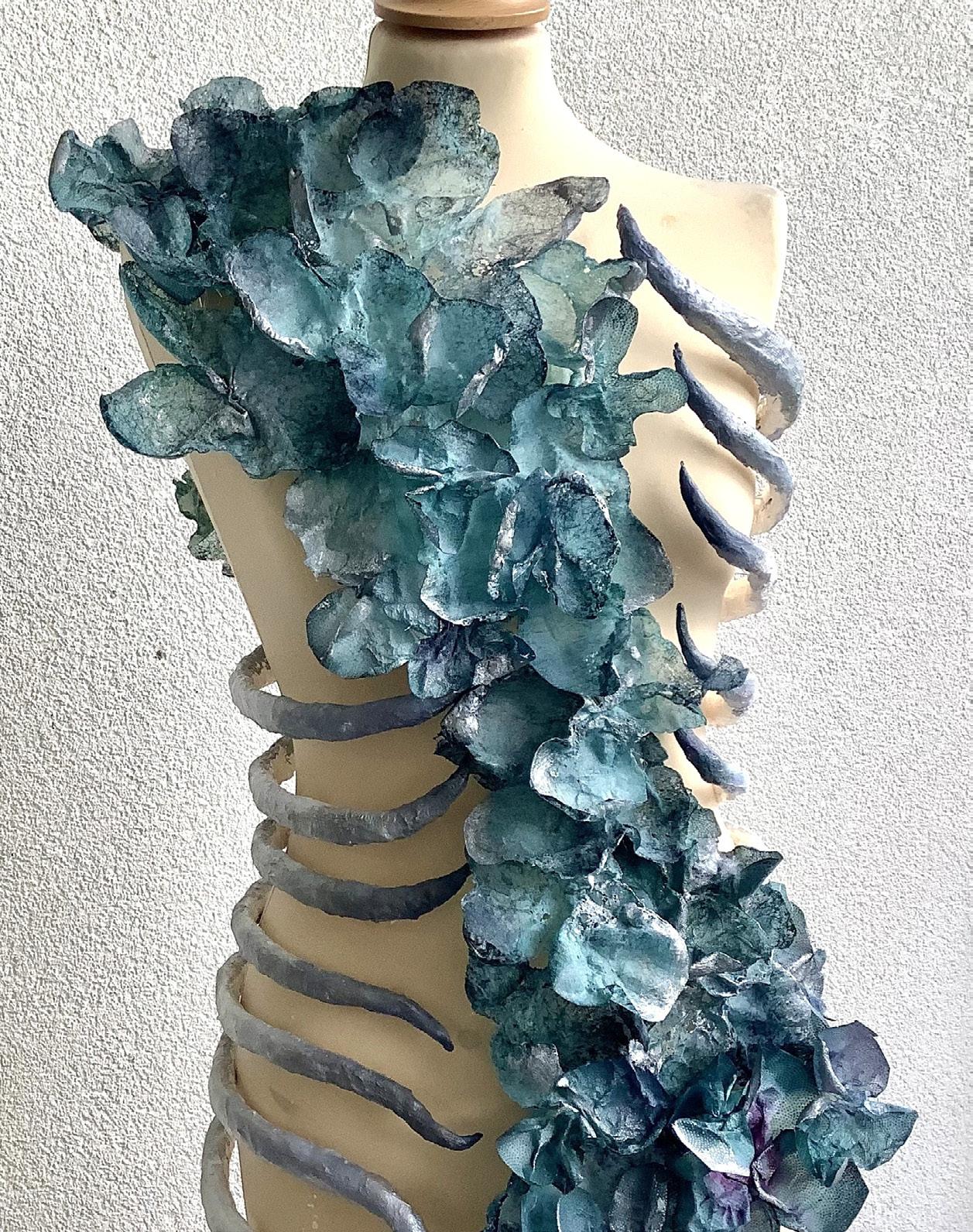
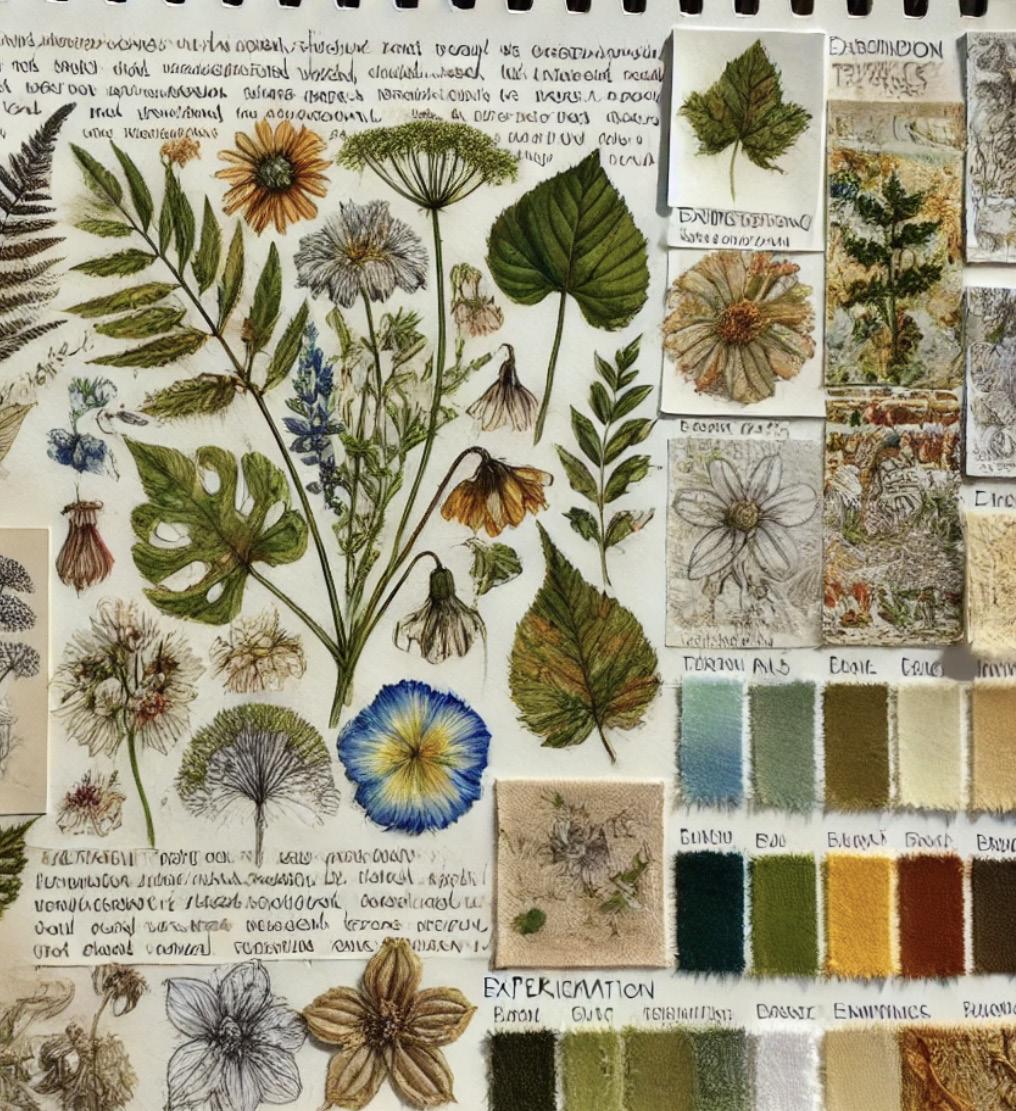


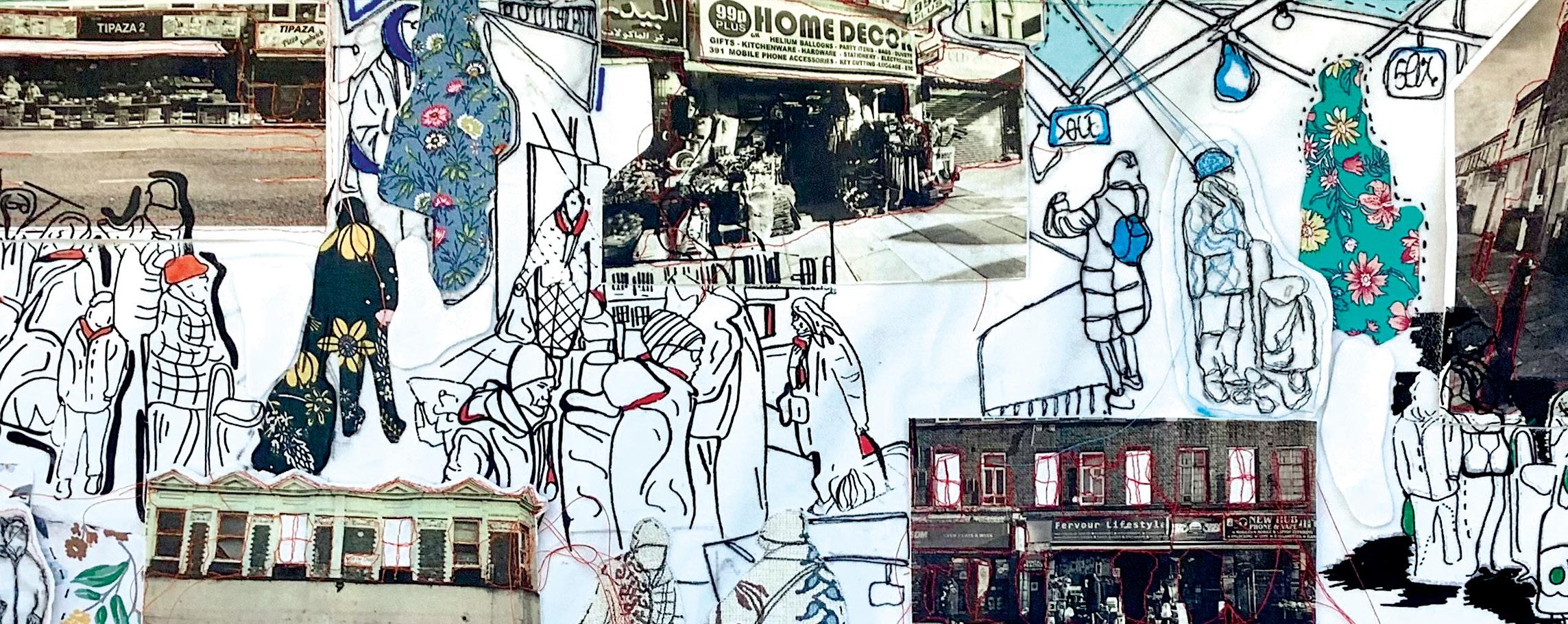
Who should choose GCSE Art Textiles?
Studying GCSE Art Textiles at LEH offers pupils a unique opportunity to explore their creative potential. The course is diverse, encouraging pupils to explore a wide array of technical textiles-based processes. At LEH, we cultivate critical and reflective thinking, helping pupils develop a deep personal understanding of both historical and contemporary technical processes in Art Textiles, all within the context of their own work.
Our supportive environment encourages risk-taking, resilience, dedication, and imaginative self-discovery through the unique medium of Textiles. As part of the Art department GCSE Art Textiles lays a strong foundation for advanced creative study, and acts as a unique pathway into A Level Art. Many LEH pupils have gone on to pursue prestigious Art Foundation and Degree courses specialising in fashion and textiles, leading to successful and varied careers in the creative industries.
This course not only provides essential skills for a broader education, but also bridges the gap between Technology and Art. Pupils explore printed and constructed Textiles, using a combination of traditional techniques and technological advancements to create work.
History of both Art and Textiles and contemporary practice form an important part of the GCSE course. Pupils are encouraged to visit galleries and museums in order to study first hand sources and develop their own ideas. They will also take part in media-based workshops run by practising Textile artists.
Course details (OCR J174)
The GCSE is divided into two sections:
Component 1: Portfolio (60% of total mark)
The portfolio consists of two separate projects. Each contains personal research, preparation studies and final outcomes.
• Project 1 (Flora and Fauna) This project has supporting technical workshops and gives pupils a chance to explore a range of makers and designers.
• Project 2 (Architecture and Structure) This project allows pupils to expand and develop skills learnt in project 1, applying theme to the new title of ‘Architecture and Structure’.
Component 2: Externally Set Task (40% of total mark)
A personally interpreted project which contains preparation samples and a final outcome to be completed during a timed 10 hour practical exam.
If you love mythology, are interested in the ancient world and want to gain a deeper understanding of today’s world through the lens of the past by studying the literature, history, religion and art that shaped the modern world then Classical Civilisation is for you.
You will develop your analytical and critical skills by evaluating written and material culture spanning over 1000 years and two civilisations.
You will study literature which has delighted and influenced readers worldwide for over 2000 years and art which has inspired artists and architects for a millennia. You will hone your essay writing and source analysis skills while studying and discussing myth and religion’s role in society, the concept of the ‘hero’ and man’s relationship with the gods.
Course Details: (OCR J199)
The course consists of two components, each worth 50% of the total GCSE, and is examined in two 90-minute examinations worth 90 marks in the summer of the Upper Fifth.
Component 1: The Thematic Study
This component involves the comparative study of ancient Greece and Rome and combines visual and literary sources.
Myth and Religion
Key topics include the gods, heroes such as Hercules and Theseus, the foundation myths of Athens and Rome, myths about the underworld and the use of myth as a symbol of power. You will examine the role of religion in the everyday lives of ancient Greeks and Romans by studying temples, religious festivals and rites.
Prescribed sources include Homeric Hymns, extracts from the Metamorphoses and Aeneid, works by Greek and Roman historians, the Parthenon Frieze, the Pantheon, the temple of Zeus at Olympia and a range of Greek sculptures and vases and Roman statues.
This component involves an in-depth cultural study with the study of a related body of literature.
The Greeks themselves recognised the world of Homer’s poems as the cradle of Greek literature and civilisation; this component enables you to study the history of the Mycenaean world in which Homer’s epics were chronologically placed and The Odyssey, an epic of immense enduring appeal.
Culture
You will study the archaeological evidence for the Homeric world, looking at the sites of Mycenae and Troy, the evidence for their day-to-day lives and appraising the artefacts excavated and evaluating to what extent the Homeric world reflected its historic counterpart.
Literature
Odyssey Books 9, 10, 19, 21,22
You will have the opportunity to examine Homer’s literary techniques and key themes dominant in the narrative, such as return and revenge, deceit, the role of fate and the gods and hospitality. You also will form you own views on Odysseus as a hero and husband and the other key characters in his life, not least his wife, Penelope, a woman celebrated for her intelligence, and Circe, the inspiration for Madeline Miller’s novel.
The Classics Department runs a wide range of extracurricular activities for those studying classical subjects.
The Department runs regular trips to Greece and Italy, enabling pupils to see the sites they are studying in their syllabus.
A trip to the British Museum in the Lower Fifth will enable pupils to examine material sources on their syllabus first-hand. Pupils can also participate in ClasSoc, our weekly Classics Society which we run jointly with Hampton School. In addition, we regularly run theatre trips to classical plays or plays inspired by Greek myths.
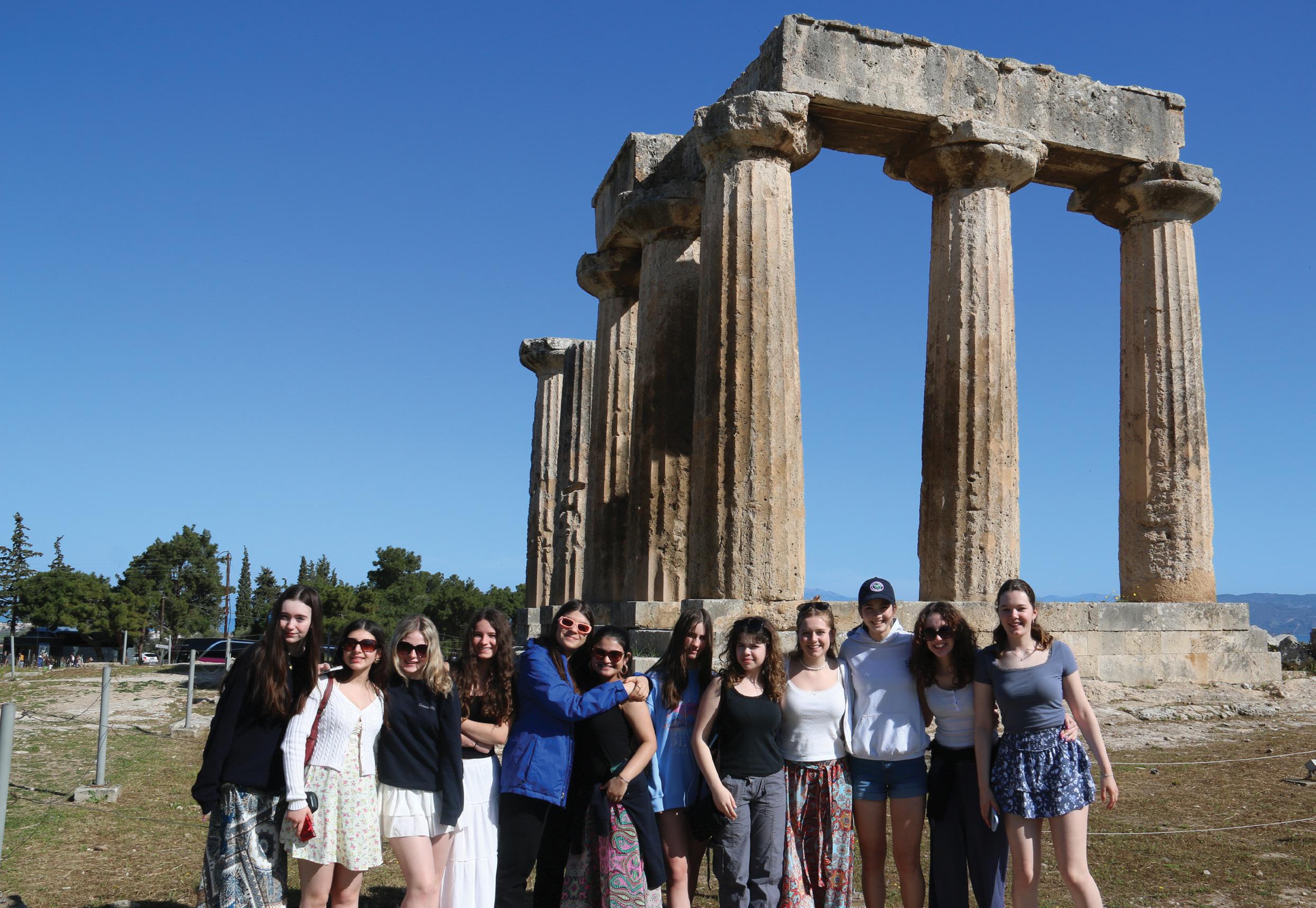
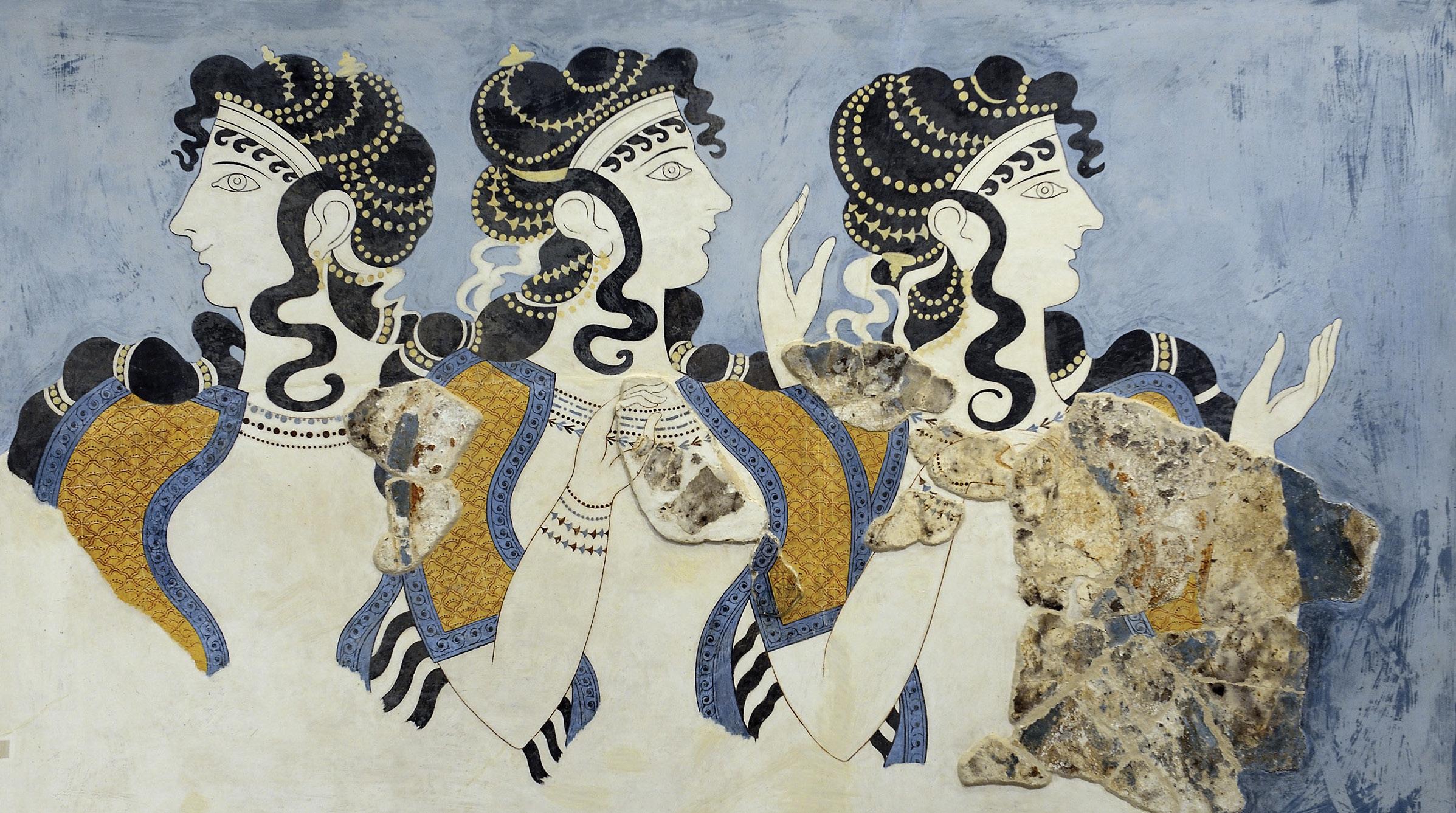
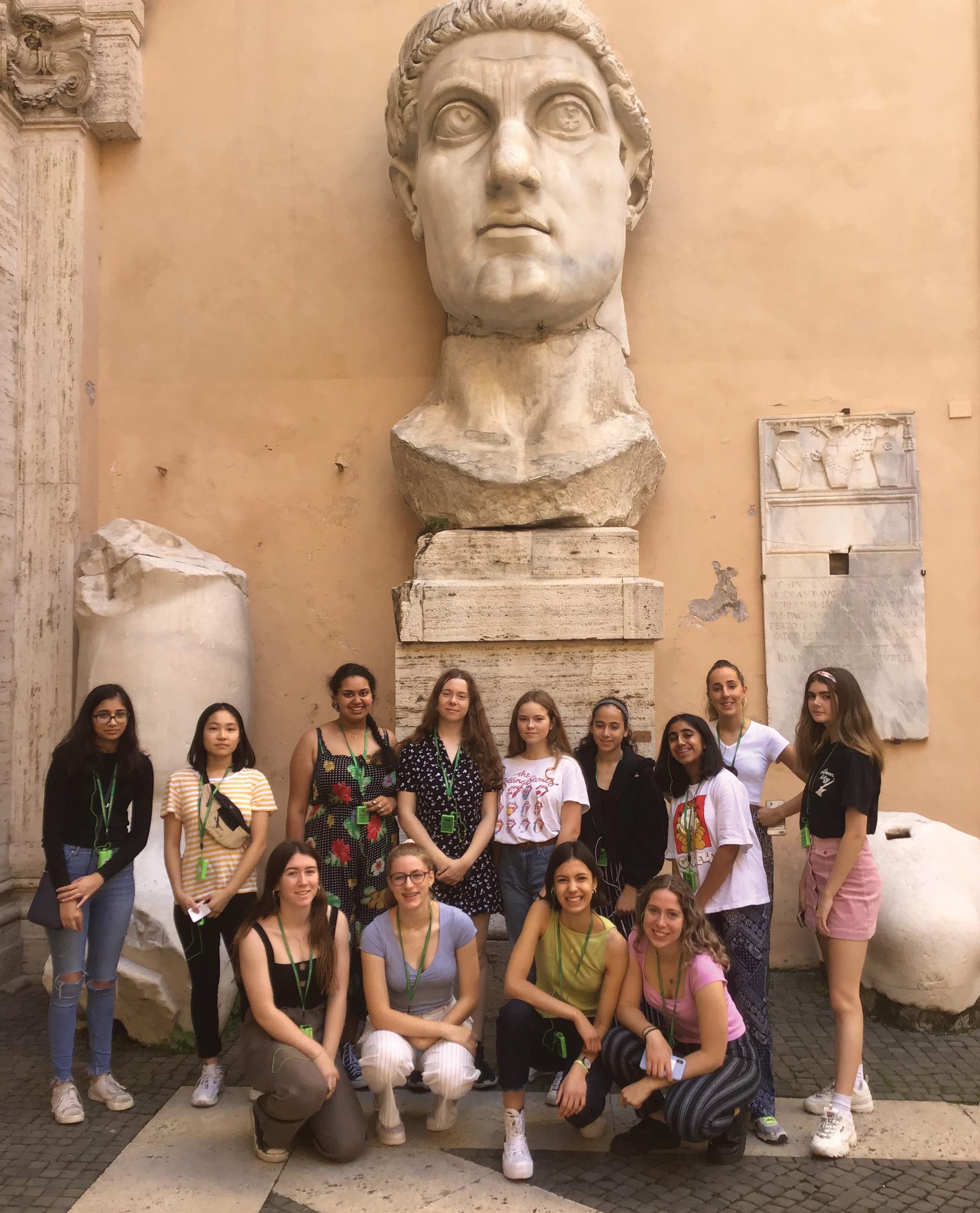
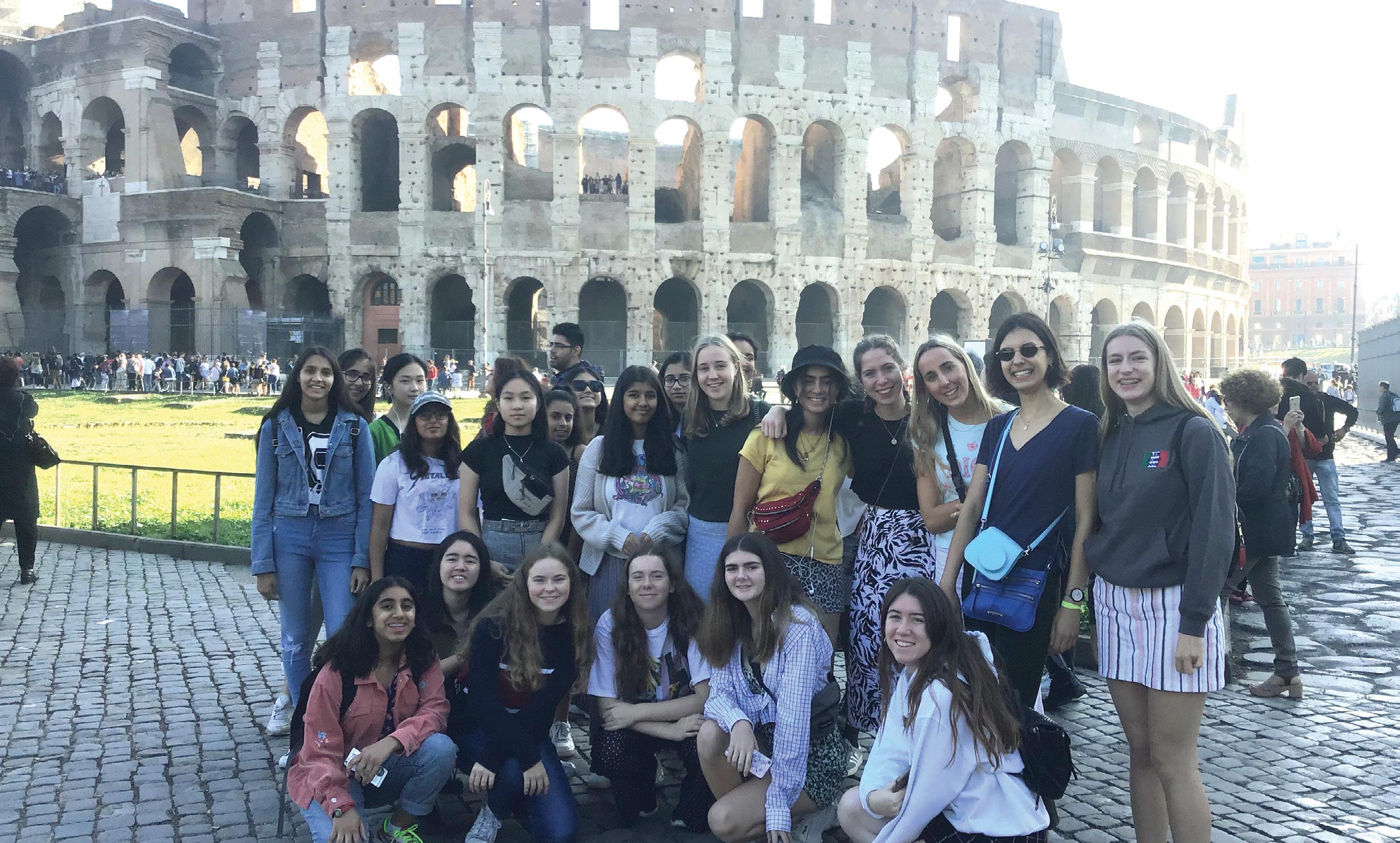
Who should choose Latin?
If you have enjoyed Latin in the Middle School then you will enjoy Latin GCSE, which will develop your skills as a linguist, analyst and critic.
Course details (OCR J282)
There are two elements: Language and Literature.
Language:
Development of language skills up to GCSE standard. We use Latin to GCSE, working towards the language paper. This consists of three passages for translation and comprehension and a choice of either three short sentences from English into Latin or answering grammar questions on a passage of Latin.
There is a prescribed vocabulary list for this paper, which will be covered over the course of the two years.
Literature:
There is always both a Prose Literature and a Verse Literature set text. The prose text will be Apuleius’ account of the love affair between Cupid and Psyche, and the verse text is Aeneas’ account of the debate over the Trojan horse and the fall of Troy in Virgil’s Aeneid II.
Beyond the classroom
Whichever Classical subject you choose to do, there is a range of additional activities, which are run by the Classics Department.
Residential trips
The Department runs regular trips to Greece and Italy.
Other trips and events
We regularly have theatre trips when Classical plays are performed. Pupils can also participate in ClasSoc, our weekly Classics Society which we run jointly with Hampton School.
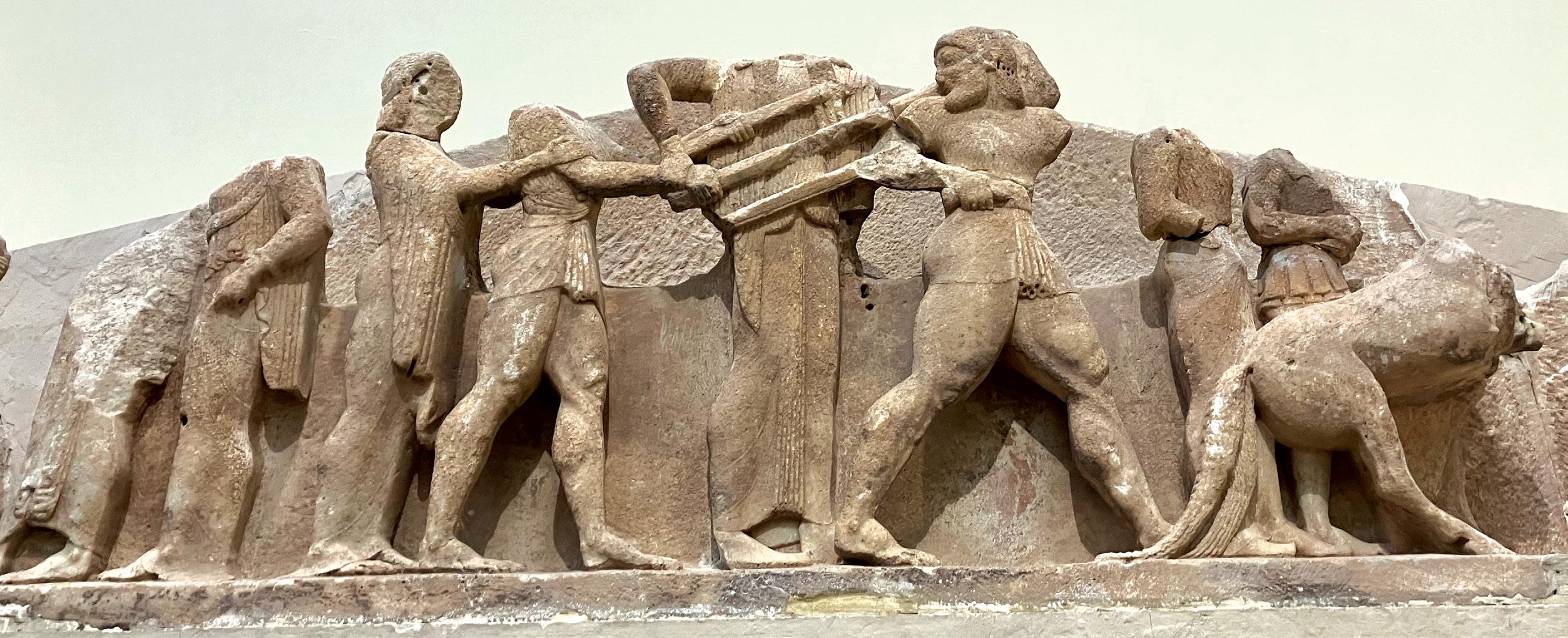
Starting Greek at GCSE is a natural choice for those who have loved studying Latin, are excited by learning how languages work and are fascinated by the ancient world:
• If you have really enjoyed Latin, you will also enjoy Greek. The languages are very similar and complement each other well. Don’t be put off by the fact that the alphabet is different: this is quickly mastered within a couple of weeks of starting the course.
• If you are an able linguist, you will enjoy the fast pace of learning and the stimulating challenge of acquiring a new language in two years.
• If you love literature and mythology and want to end up studying some of the most influential works from the western world, then Classical Greek is the subject for you.
Course details (OCR J292)
The format is just the same as for Latin:
Language:
Development of language skills up to GCSE standard. We use two books, Athenaze and Greek to GCSE. Athenaze follows a similar format to the Cambridge Latin Course.
While you are starting from scratch in Lower Fifth, having Latin already means you are familiar with many of the concepts, which occur in Greek. At the end of the course, you will complete a language paper consisting of passages for translation and comprehension and some grammar questions. Just like in Latin, there is a set vocabulary list.
Literature:
Just like in Latin, you study both a prose and a verse set text, each of similar length.
Prose literature:
This is Lysias’ speech On the Murder of Eratosthenes, in which a husband defends himself for murdering his wife’s lover.
Verse:
This will be selections from Euripides’ tragedy The Trojan Women, in which Hecuba and Andromache voice their anger and grief following the fall of Troy.
Beyond the classroom
Whichever Classical subject you choose to do, there is a range of additional activities run by the Classics Department.
Residential trips
The Department organises regular trips to Greece and Italy.
Other trips and events
Every year those studying Greek in the Lower Fifth go to the British Museum or the Ashmolean Museum in Oxford to explore different aspects of Greek life. In addition, whenever Greek Tragedy is performed, we aim to take pupils to see it.

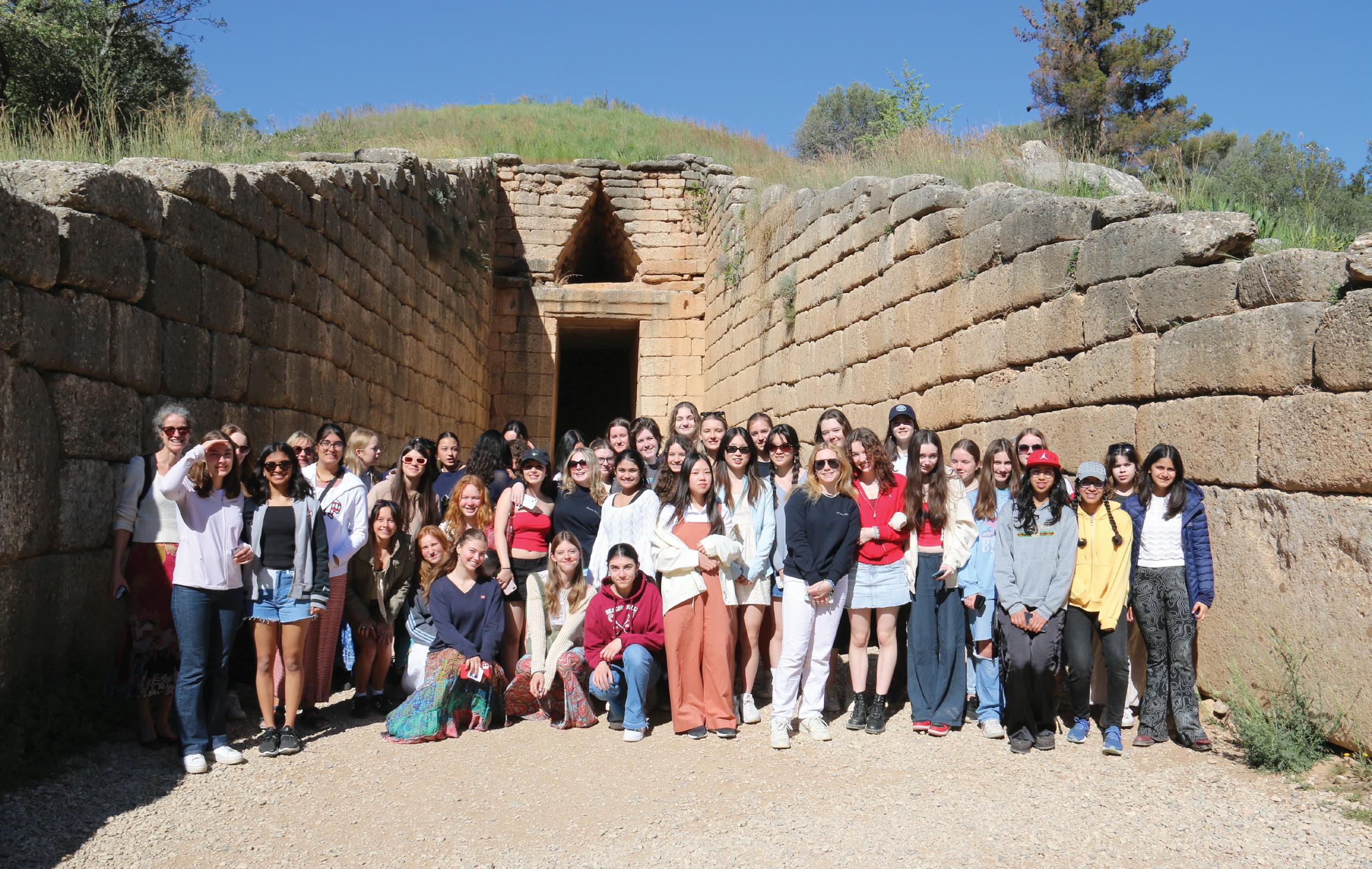
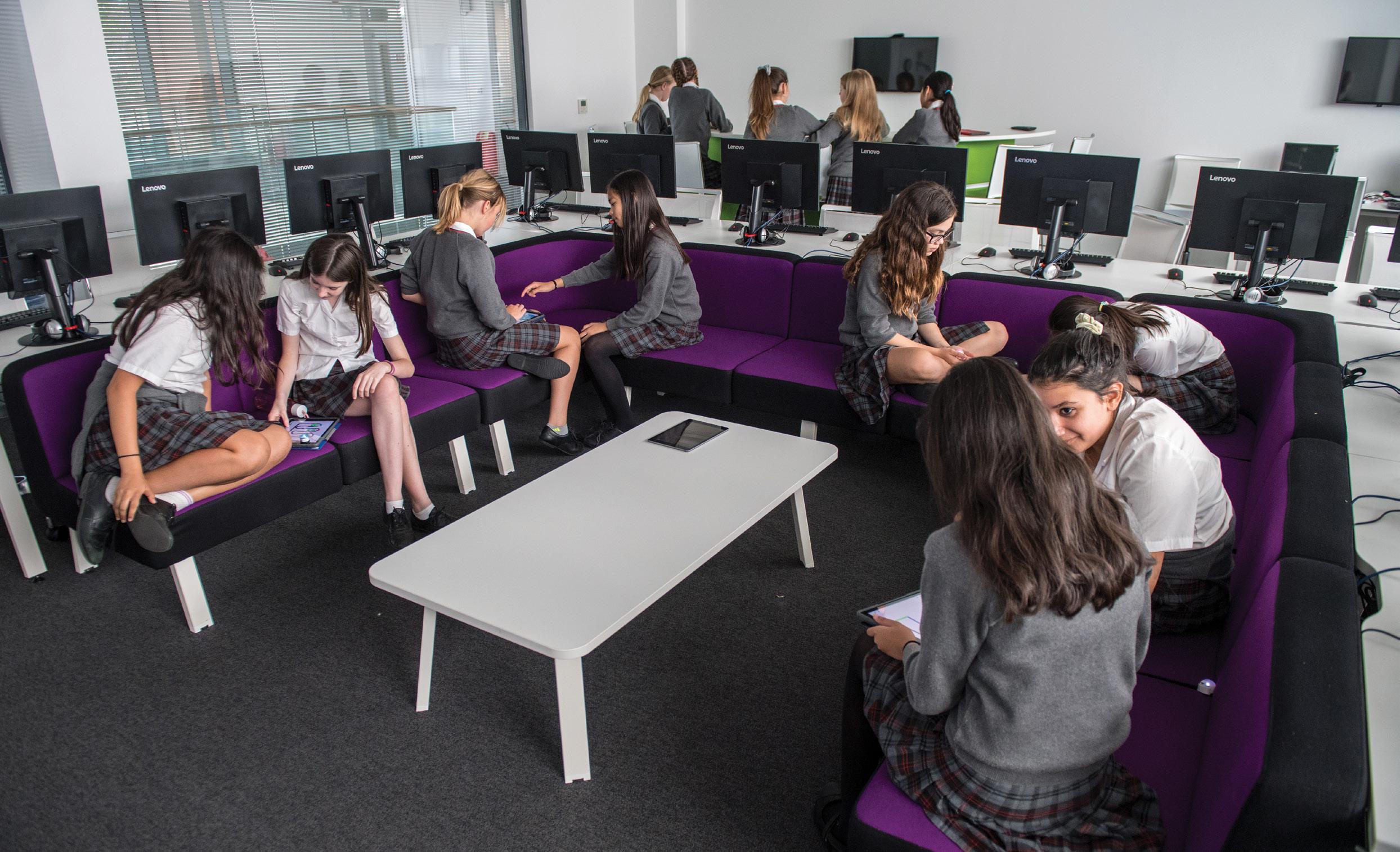
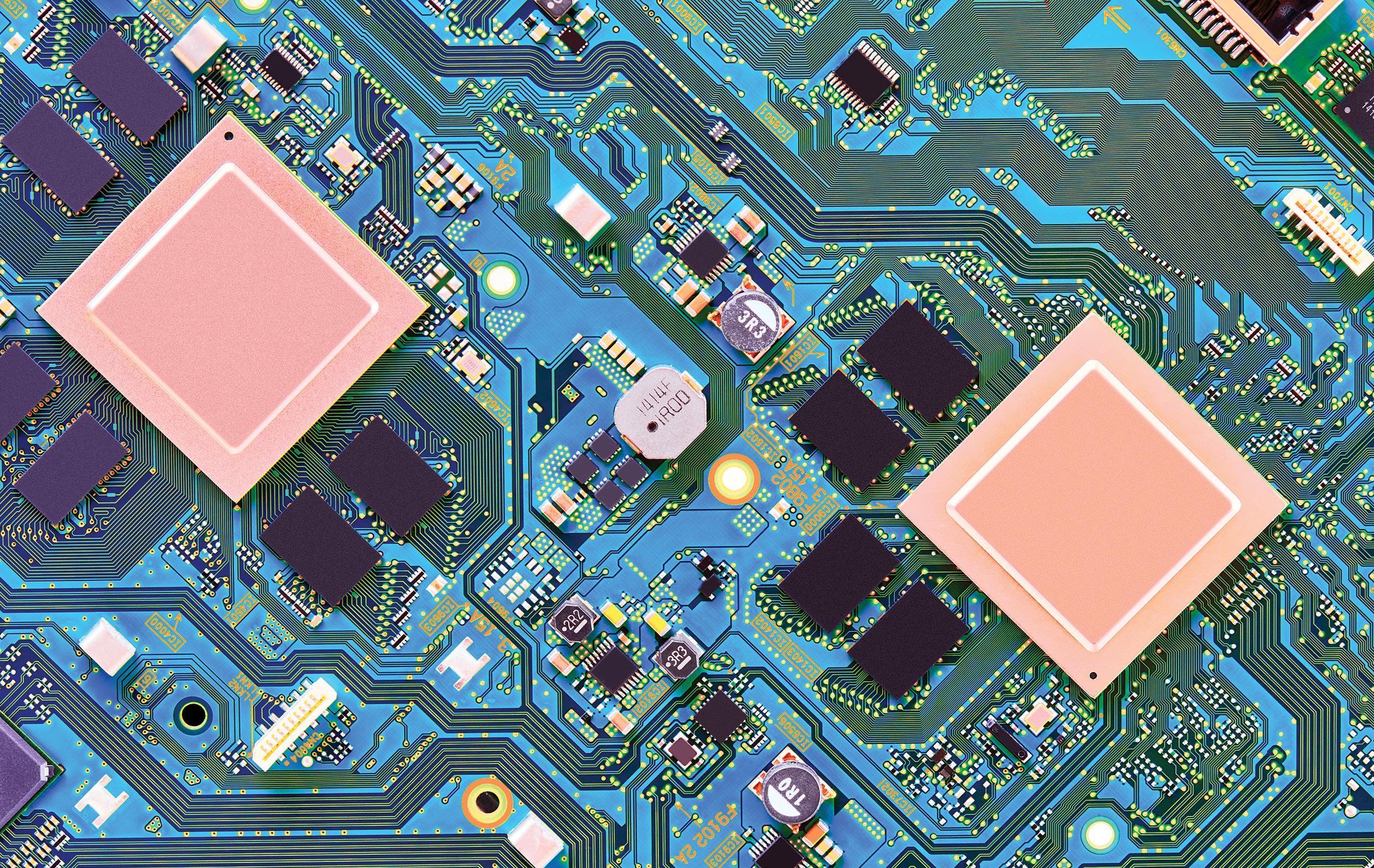
The digital age needs Computer Scientists. Computer programs have all but infiltrated every aspect of our lives. Computer Scientists theorise, design and develop software and hardware for the programs we use day-in, day-out.
Computing: A little bit geeky? Yes. A little bit difficult? Yes. Undeniably cool? Oh yes!
If you are constantly asking “What happens if I change this?” and “How does it work?” when you are supposed to be typing up your homework, then GCSE Computer Science may be the perfect choice for you.
You’ll learn all about the hardware and software that make up a typical computer system and what really goes on inside those chips and circuit boards.
You’ll learn how to analyse problems in computational terms and write (code) real computer programs to solve them. Even better, you’ll develop the capacity to think creatively, innovatively, analytically, logically, critically and to see relationships between different aspects of Computer Science and possibly be inspired to becoming the next Ada Lovelace or Tim Berners-Lee.
Course details (Edexcel 1CP2)
There are two final examinations:
Paper 1: Principles of Computer Science (*Paper code: 1CP2/01)
• Written examination: 1 hour and 30 minutes
• 50% of the qualification
• Assesses the theoretical topics: Computational thinking, Data, Computers, Networks and Issues and Impact.
Paper 2: Application of Computational Thinking
• Onscreen examination: 2 hours
• 50% of the qualification
• This paper is practical in nature and requires pupils to design, write, test and refine programs in Python in order to solve problems.
What subjects go well with it?
There is now no area of learning or research that does not involve technology in some way. The skills learned while studying Computer Science will enable pupils to become knowledgeable and objective about the use of these technologies. Logical analysis and problem solving in addition to creativity will complement all other chosen subjects.
Our well-resourced department opens doors to a wide array of exciting opportunities. In previous years, our pupils have participated in events such as Bebras, CyberFirst, The Perse Coding Team Challenge, and The Advent of Code, showcasing their skills on national and international stages. Pupils are enriched through various clubs and activities. From Minecraft enthusiasts to coding aficionados, ethical hackers, and robotics enthusiasts, our lunchtime clubs cater to diverse interests. Moreover, our pupils have access to physical computing and technologies, including VEX robotics, Raspberry Pi devices, and programmable drones, equipping them to take their learning far beyond the curriculum.

GCSE D&T: Product Design aims to broaden the experience, awareness and capability of pupils to design, develop and build prototype products which are not only examples of ‘good design’ but are in themselves ‘designs for good’ i.e. creating products which solve real problems for real people.
The course provides pupils with lots of practical experience essential for successful product design. Product analysis, creative thinking, model making, design presentation and CAD/CAM are delivered through engaging and thought-provoking lessons.
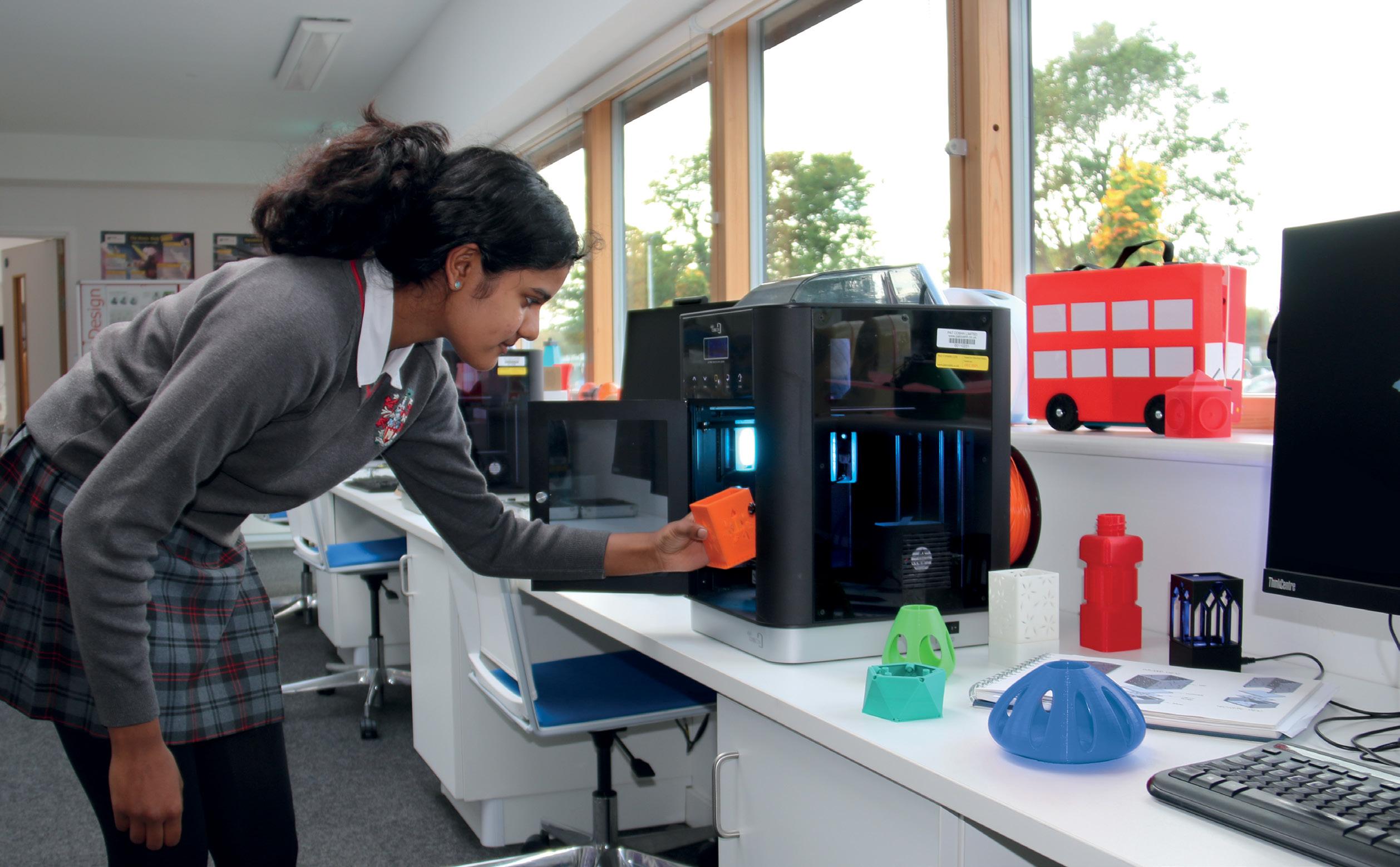
Course details (OCR J310)
D&T Product Design involves:
• Being a creative and innovative thinker and problem solver.
• Understanding the issues that influence product design and meeting human need, including marketing and the circular economy.
• Learning about engineering, smart and modern materials, components, and manufacturing technologies including 3D printing.
• Using computer technologies to research, develop and manufacture new products.
Whilst this course places an emphasis on engineering materials, pupils can work with a combination of materials to manufacture their prototypes.
The course will enable you to develop a deeper knowledge and understanding of specific materials and related techniques and processes, in order to construct working prototypes and achieve functioning solutions.
The GCSE grade will be awarded based on the completion of two units of work:
Unit 1: Written paper (50%)
Unit 2: Non-Examination Assessment (50%)
Beyond the classroom
All pupils studying GCSE D&T Product Design undertake design related events in the Lower Fifth and Upper Fifth. Visits to design consultancies, exhibitions and conferences and participation in workshops will help to broaden each pupil’s knowledge of product design and its associated disciplines.
Career Opportunities
You are encouraged to follow D&T if you have an interest in the design industry. Former pupils who have studied D&T: Product Design at LEH now have successful careers as engineers, product designers and architects.
Who should choose IGCSE Drama?
Anyone - you do not need experience, just a thirst for experimentation, developing mental agility and confidence-building. You should also have an active interest in theatre and performance and be prepared to work collaboratively in most lessons. The course really suits those pupils who want to be up on their feet, doing practical work and learning to work and lead in a team. You will explore a range of performance texts and live shows, as well as creating your own original pieces based around ideas that drive you. You will develop skills in communication and analysis as well as learning about naturalistic acting, farcical comedy, physical theatre, monologue work, and much more! In Drama you will discuss, debate, analyse, create, play and perform, and we guarantee you will enjoy every lesson.
What other subjects go well with Drama?
One of the best things about the course is its flexibility; you will have a say in what you study. We explore a range of play texts covering different historical periods, cultural and societal issues and human behaviour. History, Art, Music, Geography, Languages... there isn’t a subject, which wouldn’t benefit from the confidence, creativity and analytical skills you would gain when studying Drama. IGCSE Drama will enrich your understanding of your other subjects, different cultures and the wider world.
Beyond the Studio
As part of your course you will see some of the best live performances that London (and therefore the world!) has to offer: you will go on a series of trips to see work of the highest standard. We will also book in outstanding industry professionals to work with you. In recent years we’ve had RADA for voice work as well as a range of physical theatre companies including Frantic Assembly and The Paper Birds. The IGCSE experience also sets you up well for National Youth Theatre and similar schemes.
Course details (CIE IGCSE 0994)
Component 1: Written examination 40%
Throughout Upper Fifth, you will practically explore two extracts representing a range of genres, styles, countries, cultures, and periods. In the examination you will be assessed on your knowledge and understanding of these extracts as well as your directorial vision.
Externally assessed.
Component 2: Coursework 60%
Over the two-year course, you will perform three pieces of coursework which include:
• A three minute monologue performance.
• A group scripted performance.
• A group performance based on an original devised piece.
Internally assessed and externally moderated.
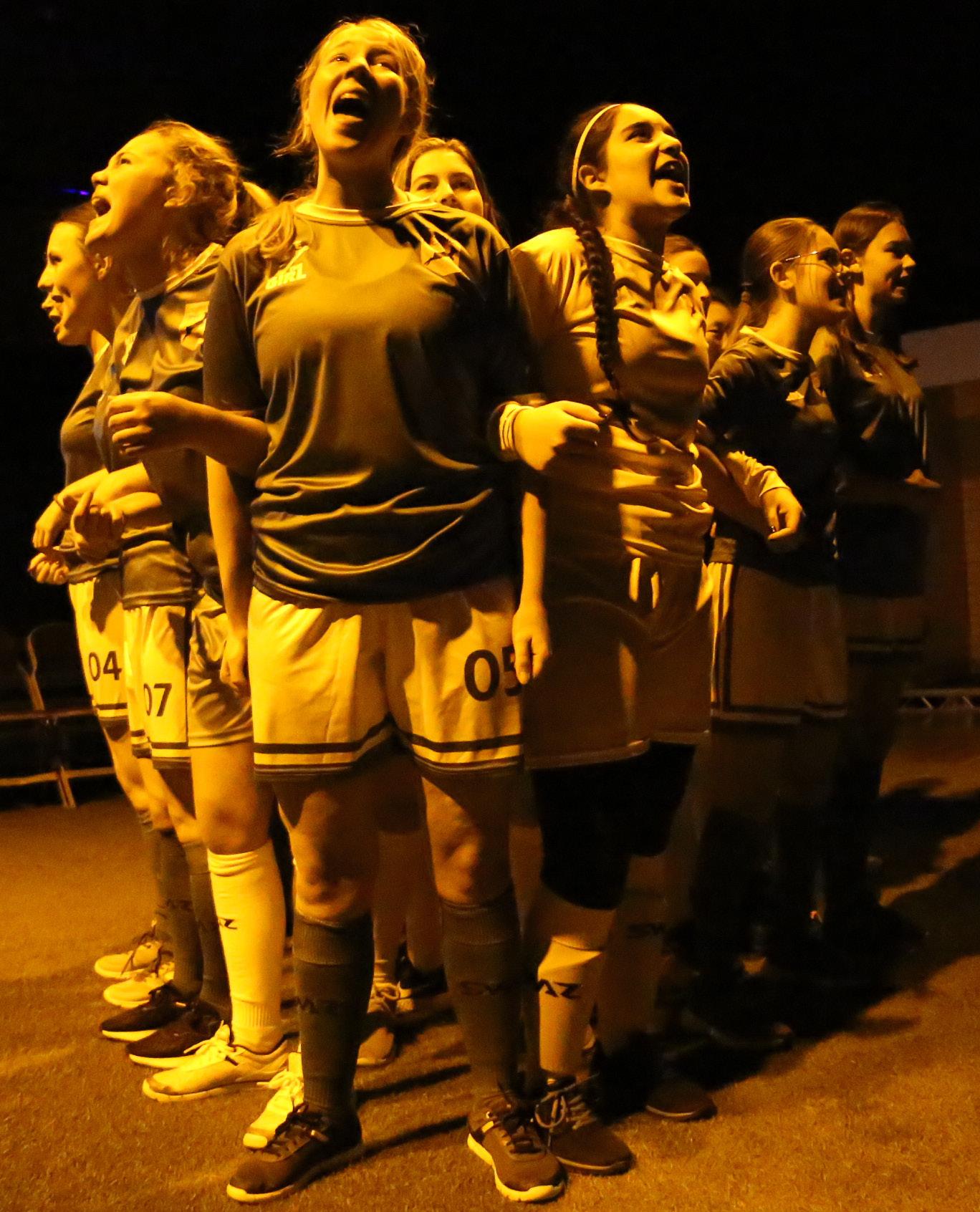
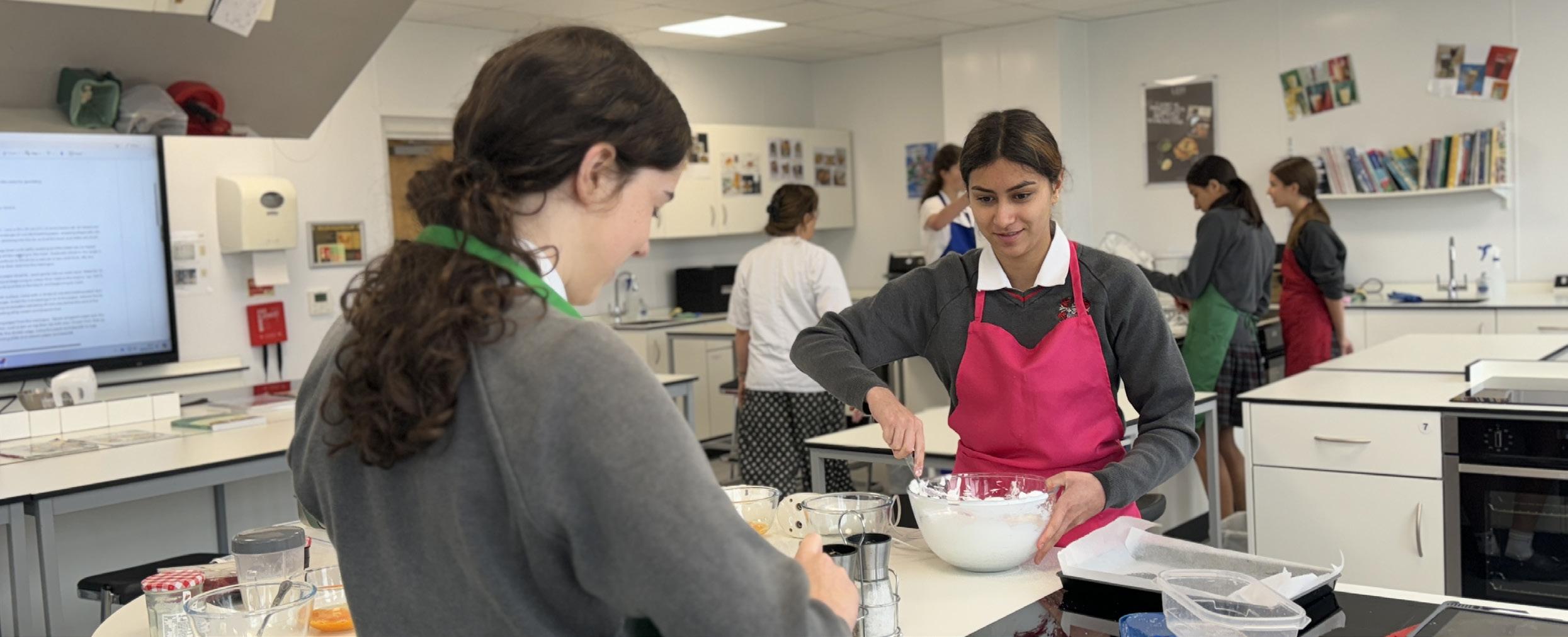
The GCSE Food Preparation and Nutrition is a very exciting, creative and interesting subject to study. There is much to learn but most of this will involve ‘learning-by-doing’ as the focus is on practical skills. Over the two-year course you will develop a range of creative making skills, technical and scientific knowledge relating to food products and invaluable transferable skills such as problem solving, working independently and time management.
Course details (AQA 8585)
• Learning about ingredients, processes and techniques
• Experimenting, investigating and testing food
• How to cook and develop new food products
• Developing skills which enable you to make food products
• Understanding about nutrition, diets and health
• Learn about food hygiene and safety
• Learning about food provenance
• Learning about food science
• Learning about food choice
There will be one examination for this qualification, which will assess your knowledge of the theory behind food preparation and nutrition. The examination will be 1 hour 45 minutes long. (50% of grade)
The second part of the assessment will be a non-examination assessment and will consist of two tasks, involving practical work. (50% of grade)
Task 1:
Pupils will carry out an investigation into the scientific principles that underpin the preparation and cooking of food.
This task will provide you with an opportunity to demonstrate your knowledge and practically apply your understanding of the science behind cooking. You will investigate ingredients and explain how they work and why.
Task 2:
Pupils will plan, prepare, cook and present three dishes in three hours. This task will provide you with an opportunity to showcase your creativity and cooking skills.

We arrange Masterclasses given by experienced chefs and informative talks with Food Science graduates.
Pupils are encouraged to watch contemporary food programmes such as Great British Menu and Food Unwrapped and to read monthly magazines such as ‘BBC Good Food’.
Career Opportunities
Food Preparation and Nutrition will prepare you for degree courses in Food Science and Nutrition leading to possible careers as a Food Technologist, Dietician or nutritionist. Other possible career paths could include Hospitality and Marketing.
Former pupils who have studied Food Preparation and Nutrition at LEH now have successful careers in brand identity with global food producers.
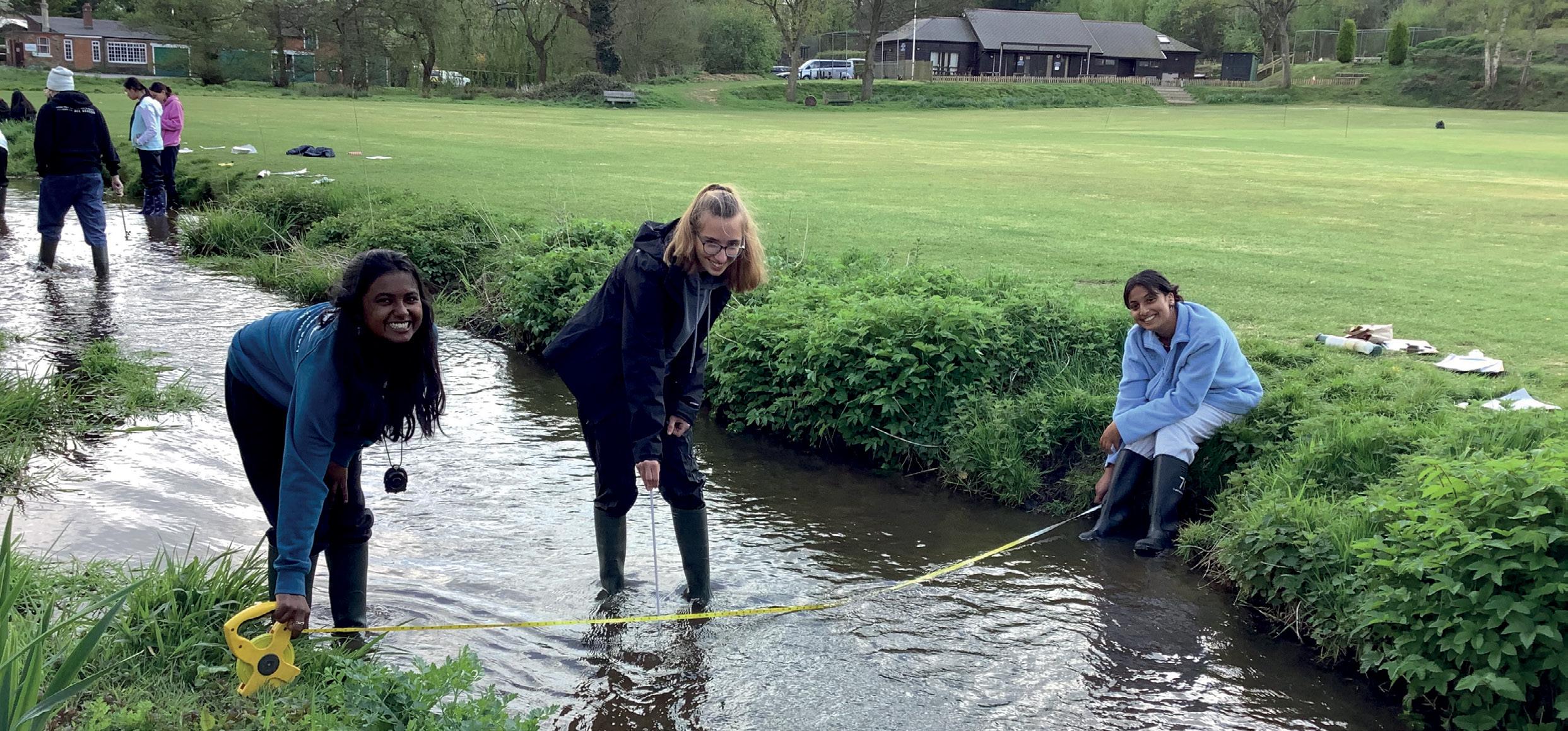
Who should choose IGCSE Geography?
If you are enthusiastic about the world in which we live, this is the course for you. It is a subject that has great relevance to many of the problems of the modern world, and pupils studying it examine issues that range in scale from global environmental change to matters within the UK. Geography bridges the arts and the sciences, combines literacy with numeracy, and goes well with most subjects. If you are interested in physical processes but also want to know about humans and their relationship with the environment, then Geography is the subject for you.
Studying IGCSE Geography can help you:
• Develop a knowledge and understanding of geographical issues both within the UK and on a global scale.
• Investigate the earth and its peoples.
• Study the features of the earth - such as coasts, rivers and rainforests - and how they were formed.
• Gain an understanding and appreciation of the cultures and backgrounds of people from all over the world.
• Study human issues such as the development gap between rich and poor and the problems that exist in our towns and cities.
• Develop a range of useful skills such as data collection, ICT, use of GIS and problem solving as well as transferable skills such as independent research, group work, debating and team work.
The Department delivers an exciting and contemporary IGCSE that delivers real world examples from a global scale to a local scale. You will be studying current issues and processes, across a range of topics.
“Geography is the subject which holds the key to our future”
Michael Palin
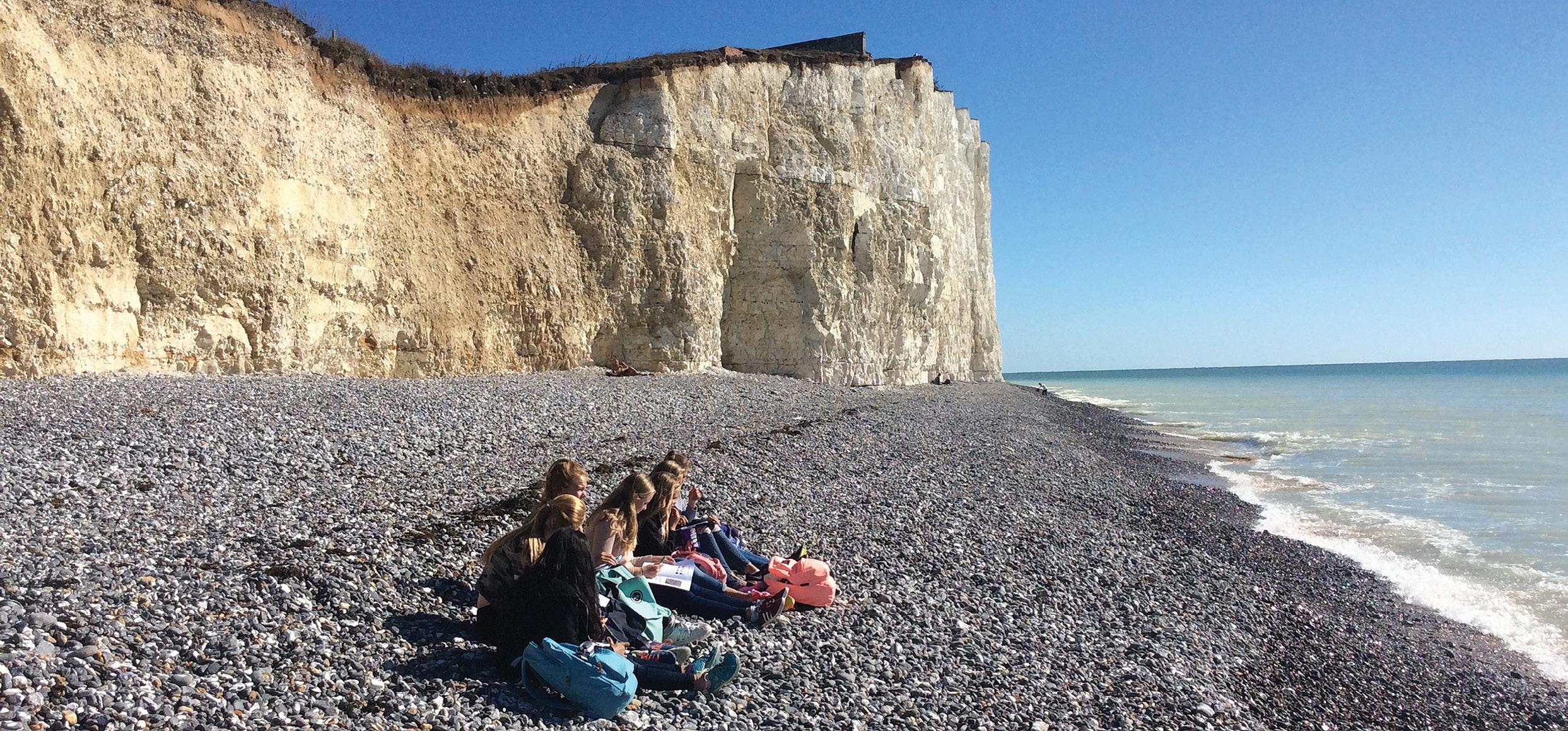
Course details Edexcel IGCSE (4GE01)
Paper 1: Physical Geography
This paper brings together physical geography and people-environment processes and interactions. The paper is divided into two sections:
Section A - River environments
Pupils study features of the global hydrological cycle (including drainage basins), the physical processes that give rise to distinct river landforms and detailed case studies of river management in a developed and a developing or emerging country.
Section B - Fieldwork
Pupils are required to undertake a geographical investigation involving fieldwork and research, in a river environment.
Paper 2: Human Geography
This paper brings together human geography and people-environment processes and interactions. The paper is divided into three sections:
Section A
Economic activity and energy
Pupils study variations in economic activity over time and spatially, the relationship between population and resources and detailed case studies of energy resource management in a developed and a developing or emerging country.
Urban environments
Pupils study trends, characteristics and problems associated with urban environments, the challenges facing contrasting urban environments and detailed case studies of urban environments in a developed and a developing or emerging country.
Section B - Fieldwork
Pupils are required to undertake a geographical investigation, involving fieldwork and research, in an urban environment.
Section C
Pupils are required to apply their knowledge and understanding of human and physical geography to investigate broader global issues.
Fragile environments and climate change
Pupils study distribution, characteristics and threats facing the world’s fragile environments, the impacts of different processes, including climate change, on fragile environments, and different approaches to managing fragile environments in a more sustainable way.
Beyond the classroom
Typically, the Department runs two compulsory field trips across the course.
Rivers Investigation
A study of the changing characteristics of a river as you travel downstream.
Urban Investigation
An investigation into the success and sustainability of an urban development.
Why should you choose IGCSE History?
• History teaches you to make sense of the present.
• It helps you understand what motivates people, and how their actions can affect others.
• How else are you going to change the world (and we hope you want to do so) if you haven’t examined how it got to where it is today?
• You will learn how to argue effectively, handle historical evidence and make informed judgements.
History made our world how it is, but History can also be part of your future. At IGCSE you will learn how History both informs the present and prepares you for the world beyond school.
Course details (4HI1)
The Edexcel IGCSE focuses on modern history. We have chosen four topics which are interlinked, bringing together some of the key countries and historical themes of the 20th century. The course consists of four units, each worth 25% of the total IGCSE, and is assessed in two 90-minute examinations in the summer of Upper Fifth.
Paper 1: Two in-depth studies.
Development of Dictatorship: Germany, 1918-1945: Germany’s tumultuous experience at the end of WWI provides the starting point for the study of the rise of Hitler and the creation of the Nazi Dictatorship. We study all aspects of the Nazi police state, including treatment of minorities and the Holocaust, as well as looking at Germany’s experience of the Second World War.
A World Divided: Superpower Relations, 1943-1972: We examine the development of the Cold War between the USA and USSR in the aftermath of the Second World War, asking how these war-time allies could so quickly become enemies and investigating the causes and consequences of events such as the Berlin Airlift, the Hungarian Uprising and the Cuban Missile Crisis.
“History made our world how it is, but History can also be part of your future.”
Paper 2: One historical investigation and one breadth study in change.
The USA, 1918-41:
Using historical sources to analyse the features of the ‘Roaring Twenties’, The Depression and the New Deal, this unit includes people and events which have captured the popular imagination: Prohibition, speakeasies and Al Capone; racial intolerance and the Ku Klux Klan; flappers and the birth of the Charleston. A fun and engaging look at a fascinating period in one of the world’s most influential countries.
Conflict, Crisis and Change: China 1900-1989:
Tracing the development of a modern superpower, we explore the turbulent period to 1949 which saw both civil war and conflict with Japan before the victory of the Chinese Communist Party and creation of the People’s Republic of China. We continue with an assessment of the evolution of the Chinese state up to Tiananmen Square demonstrations of 1989.
The Upper Fifth have the opportunity to visit Berlin. In addition, IGCSE historians are encouraged to take an active part in the School’s Model United Nations’ Society (MUN).
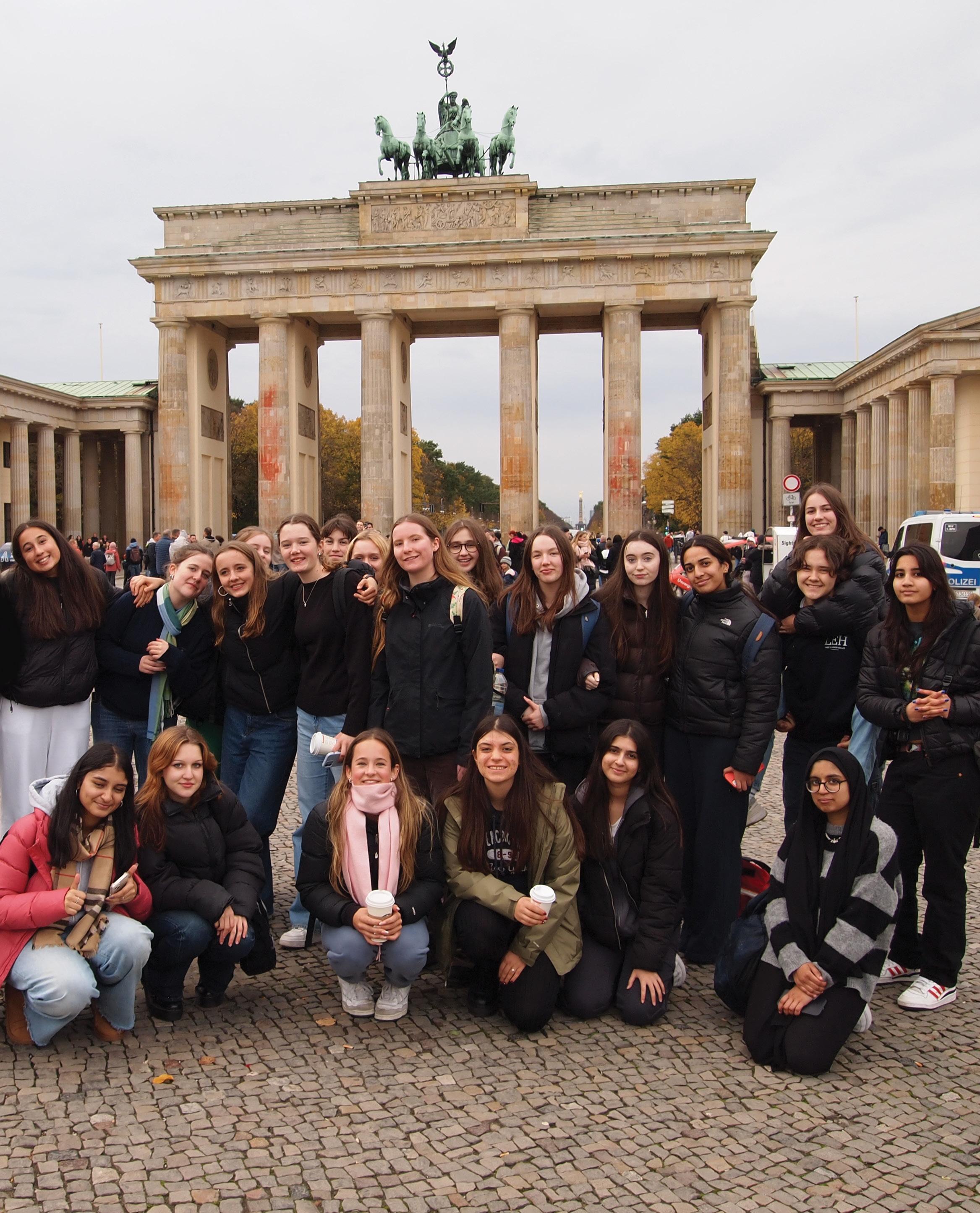
Modern Foreign Languages (MFL) form a strong part in the school curriculum. Pupils can choose to continue their study of either one or both of their current languages.
All four languages are two-year courses. French, German and Spanish follow the Cambridge International IGCSE specifications, and Mandarin follows the AQA GCSE specification. Courses build on the skills and topics that pupils have already acquired in their study of the languages over the years. There will also be an emphasis on a thorough revision of ‘the basics’ at the beginning of the Lower Fifth year, ensuring that all pupils start with a common knowledge of the most essential grammar and structures.
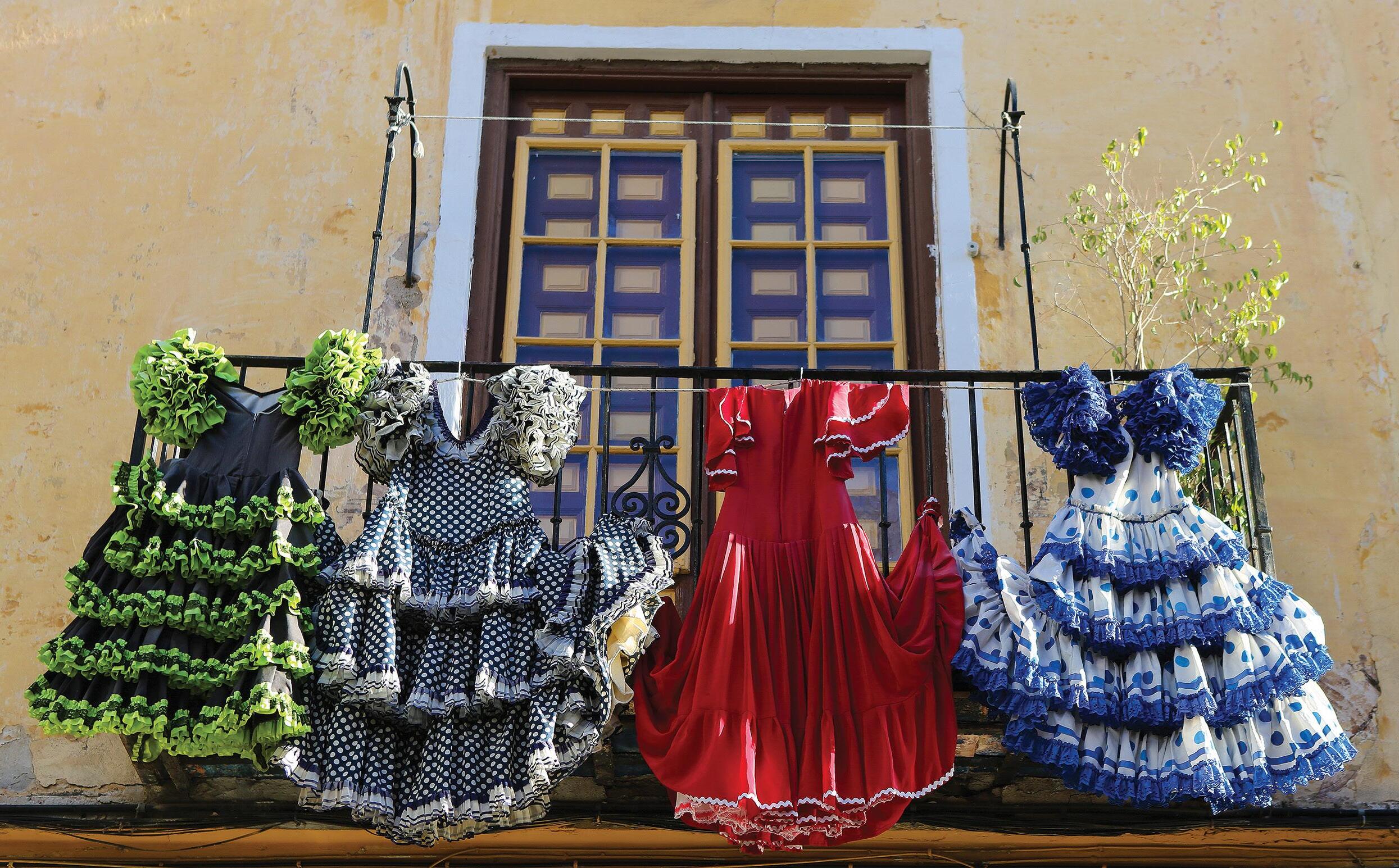
Language teaching is varied and there is great emphasis on speaking, writing, listening to and reading authentic material. Lower Fifth and Upper Fifth classes have access to our digital language laboratory where they can practise intensive listening and speaking to enhance learning as well as making use of our IT facilities. Pupils are able to practise their languages in weekly oral sessions in pairs or small groups with our language assistant.
The Cambridge International IGCSE course is a linear examination. This suits the nature of the subject particularly well as pupils will be able to accumulate knowledge and skills over two years. There will be uninterrupted teaching time and a final examination in all four skills at the end of the Upper Fifth year: listening, writing, reading and speaking will all be tested separately. Each skill is worth 25% of the overall grade. An academically rigorous course, the IGCSE will lay solid foundations for pupils considering continuing with a language at A level.
“I really admire the school’s ability to go sideways in any subject, bringing in current affairs or going cross-curricular.”
Parent in Good Schools Guide Review
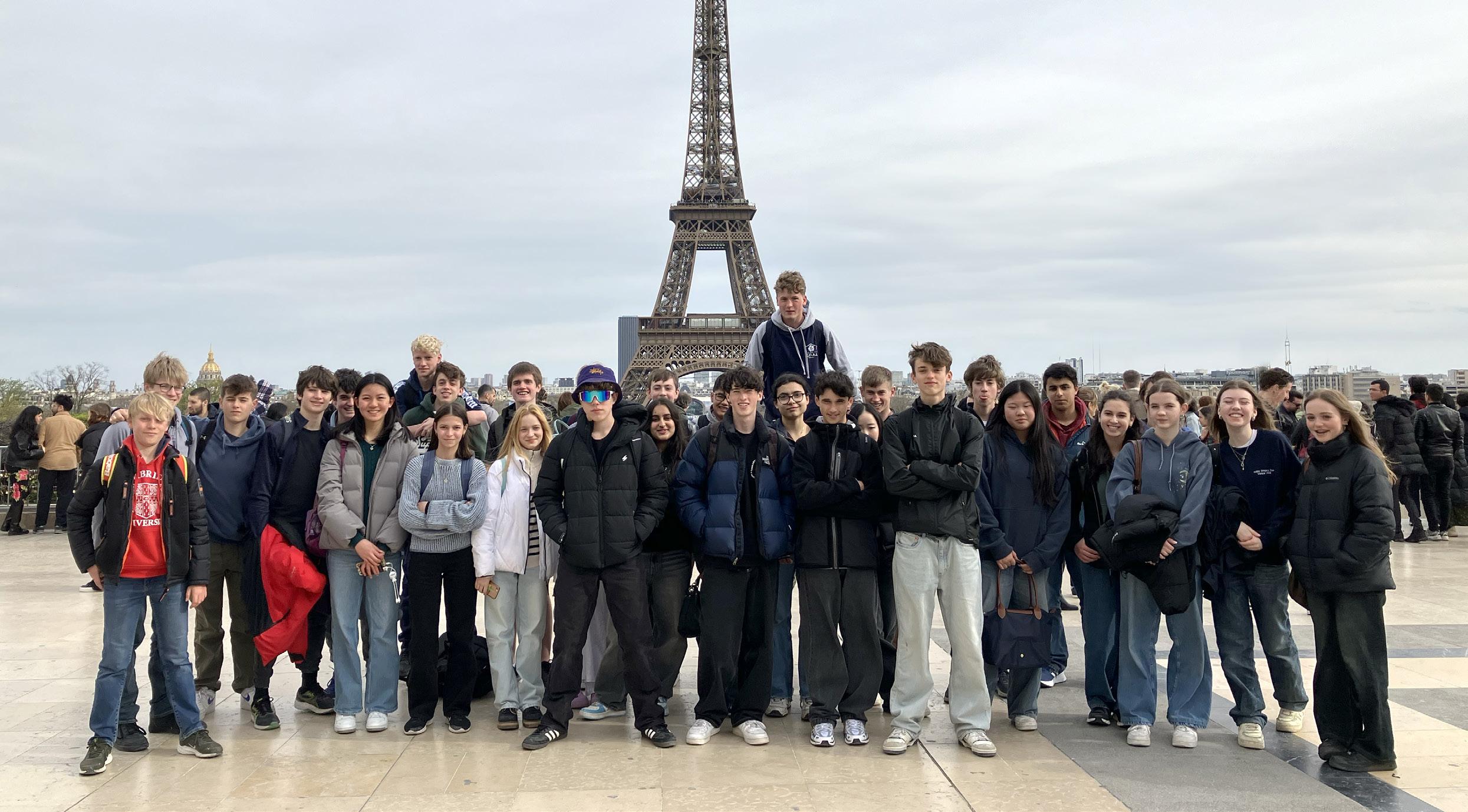
Who should choose IGCSE French?
(7156)
The language of cooking, fashion, theatre, the visual arts, dance and architecture: French is the fifth most widely spoken language by total number of speakers. You should choose French if you are interested in languages and communication, and if you enjoy learning about France and French speaking (francophone) cultures and ways of life. You should be curious about other people and want to find out about their lives as well as want to communicate about your own. The constant aim is to see the relevance of what you learn in the classroom while preparing you for the demands of the IGCSE examinations. All pupils also have a conversation lesson with the French assistant once a week.
Lower Fifth pupils who study French are given the opportunity to take part in the joint exchange with Hampton School to our partner school in Paris, the Lycée privé Notre Dame de Sion. There are plenty of opportunities to speak French with the host family and exchange partner, as well as to discover interesting aspects of French culture and habits. Trips and exchanges are an important aspect of IGCSE MFL provision.
Who should choose IGCSE German?
(7159)
German is the second most widely spoken language in Europe and at the heart of the European and global business, travel and tourism, communications, science and technology industries. Your knowledge of German will increase your career options in all of these fields, not least in STEM, where there is currently a shortage of specialists in Germany. Choose German if you love communicating with others, learning a new language and if you are curious about German culture - its people, music, art, food and way of life. IGCSE German will build upon the skills you have learnt so far and you will improve in confidence and fluency.
Since communication and authenticity form such a major part of the IGCSE course, all pupils are encouraged to be involved in an exchange or study visit to a German speaking country. We organise, in cooperation with Hampton School, an annual exchange visit to the Ellenrieder Gymnasium in Konstanz, twin town of Richmond-upon-Thames, during the Lower Fifth year. This provides an excellent opportunity for pupils to improve their confidence and proficiency in speaking and listening and gives them an opportunity to learn about a different culture and way of life.
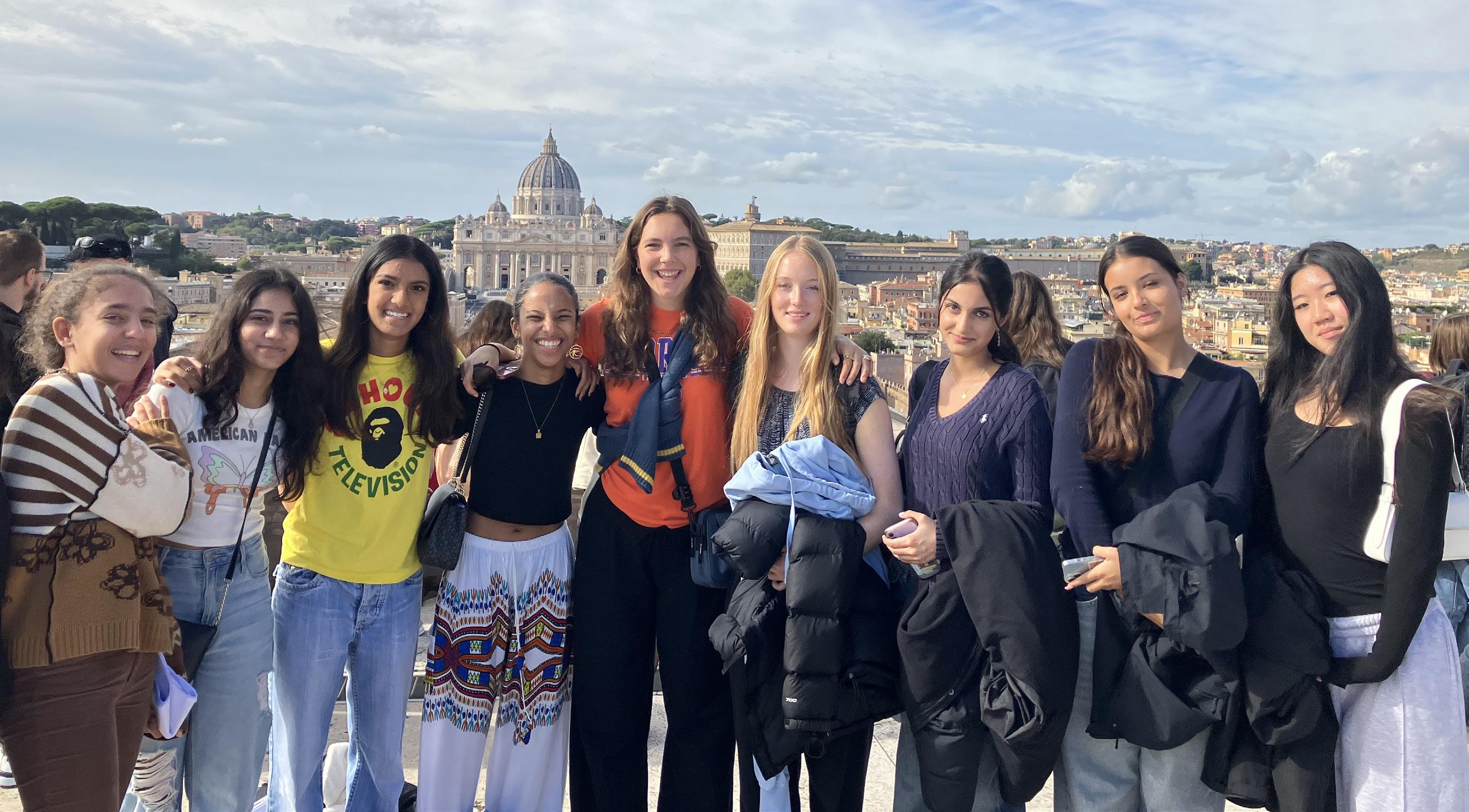
You should choose Spanish if you enjoy learning about a vibrant global culture which is making its influence felt across the world: festivals - Day of the Dead (Día de los Muertos); literature - Magical Realism (Realismo Mágico); art - Frida Kahlo and Dalí’s Surrealism; music - Reggaeton, and foodtapas, enchiladas, tacos, burritos. The Hispanic list is endless, and growing. Spanish is the world’s second most spoken language after Mandarin, and studying Spanish will give you access to the richness of the continent of Latin America. As a Romance language, Spanish has its roots in Latin, and shares many similarities with Italian, French and Portuguese.
Beyond the classroom
Upper Fifth pupils who study Spanish are given the opportunity to take part in a study visit to Salamanca. There are plenty of opportunities to speak Spanish, enjoy Spanish food and learn how to dance Flamenco, amongst many other things!
China is one of the world’s oldest and richest continuous cultures, over 5,000 years old; it is also the second most populous nation in the world, with 1.42 billion people. Mandarin Chinese is the mother tongue of over 900 million people, making it the most widely spoken first language in the world, and China is the second largest economy in the world. There has never been a time when learning this fascinating language has been more relevant.
This fast-paced course is aimed at those who have taken Mandarin in the Upper Fourth. The course will enable pupils to develop their knowledge of Mandarin to their full potential, equipping them with the knowledge to communicate in a variety of contexts. Themes covered include identity and culture, local, national, international and global areas of interest, and education and employment.
Beyond the Classroom
There will be opportunities for engagement in cultural events and visits throughout the course.
“Pupils are very well supported by their teachers whose strong subject knowledge they recognise.”
ISI Report 2022
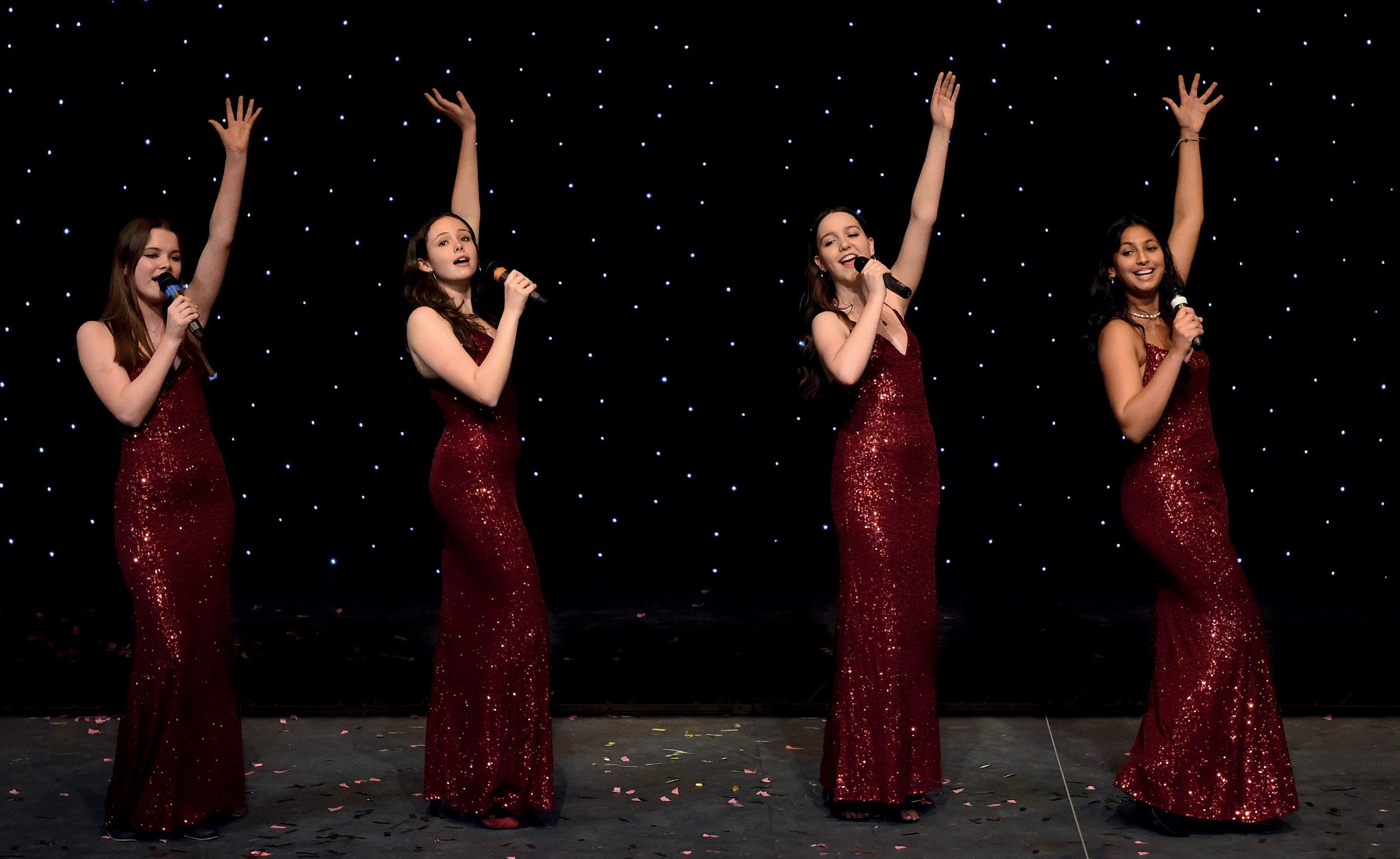
GCSE Music will allow you to study a broad syllabus covering a wide range of different musical styles. The course develops your analytical, listening, and writing skills, deepens your theoretical and historical understanding, as well as enhancing your creativity and emotional intelligence.
You will learn about a wide variety of musical styles from different historical periods, different parts of the world and different social settings. You will have the opportunity to perform, both on your own and with other people, and be able to create your own music.
Course details (Edexcel 1MU0)
Performing Music (30% coursework): Performing assessments will take place on several occasions throughout the course. Sometimes this will be a solo, sometimes an ensemble. These will be recorded, and, at the end of your course, your best performances will be chosen for submission as your performing coursework. Performing is internally marked and externally moderated.
Composing Music (30% coursework): You will use music technology or more traditional methods to compose different pieces in a range of styles, and your best compositions will be chosen for submission. You will have three to four periods over two weeks in which to complete your compositions, and you will receive lots of help and guidance from your teacher. Composition coursework is internally marked and externally moderated.
Listening and Appraising (40% examination): Listening and appraising skills are developed through the study of a range of set works. You will learn about the different musical elements and stylistic features of each of the set works, and how they compare to other pieces from the same genre. Assessment is through a written examination which will include some listening questions and one longer answer written question.
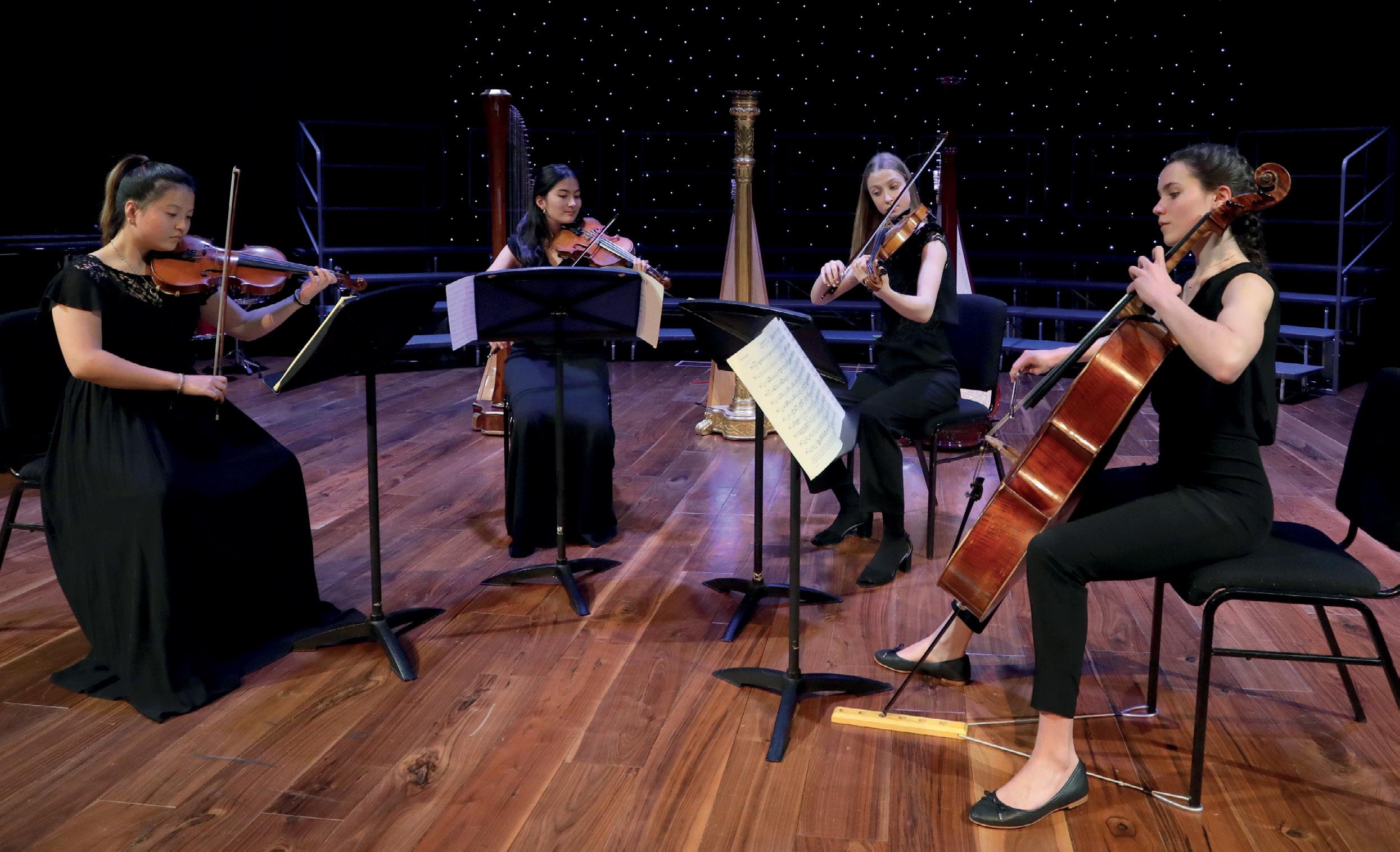
The course is open to pupils who have regular individual instrumental or vocal lessons. In order to reach the standard required for the performing unit, you should be at a minimum standard of Grade 4 by the start of the course. Please see a member of the Music Department if you are unsure whether you are at the required standard for performing.
If you have enjoyed your music lessons up to Sixth Form and are interested in listening to music, performing either as a singer or instrumentalist, and composing your own pieces, this course will enable you to become an informed and well-rounded musician with a broad and transferable skill base.
There is a very high standard of extra-curricular music in the school, including six choirs, Symphony Orchestra, String Orchestras, Sinfonietta, Brass Group, Percussion Ensemble, Jazz Group, rock groups and chamber ensembles.
Throughout the year there are many formal and informal concerts in which these ensembles perform. The series of Friday Live lunchtime concerts provides extra opportunities for solo and group performances. It is expected that all GCSE musicians take part in at least one extra-curricular activity.
The Music Department also runs trips to see concerts and musicals in London throughout the course. This enhances your broader contextual understanding of the pieces studied as part of the set works.
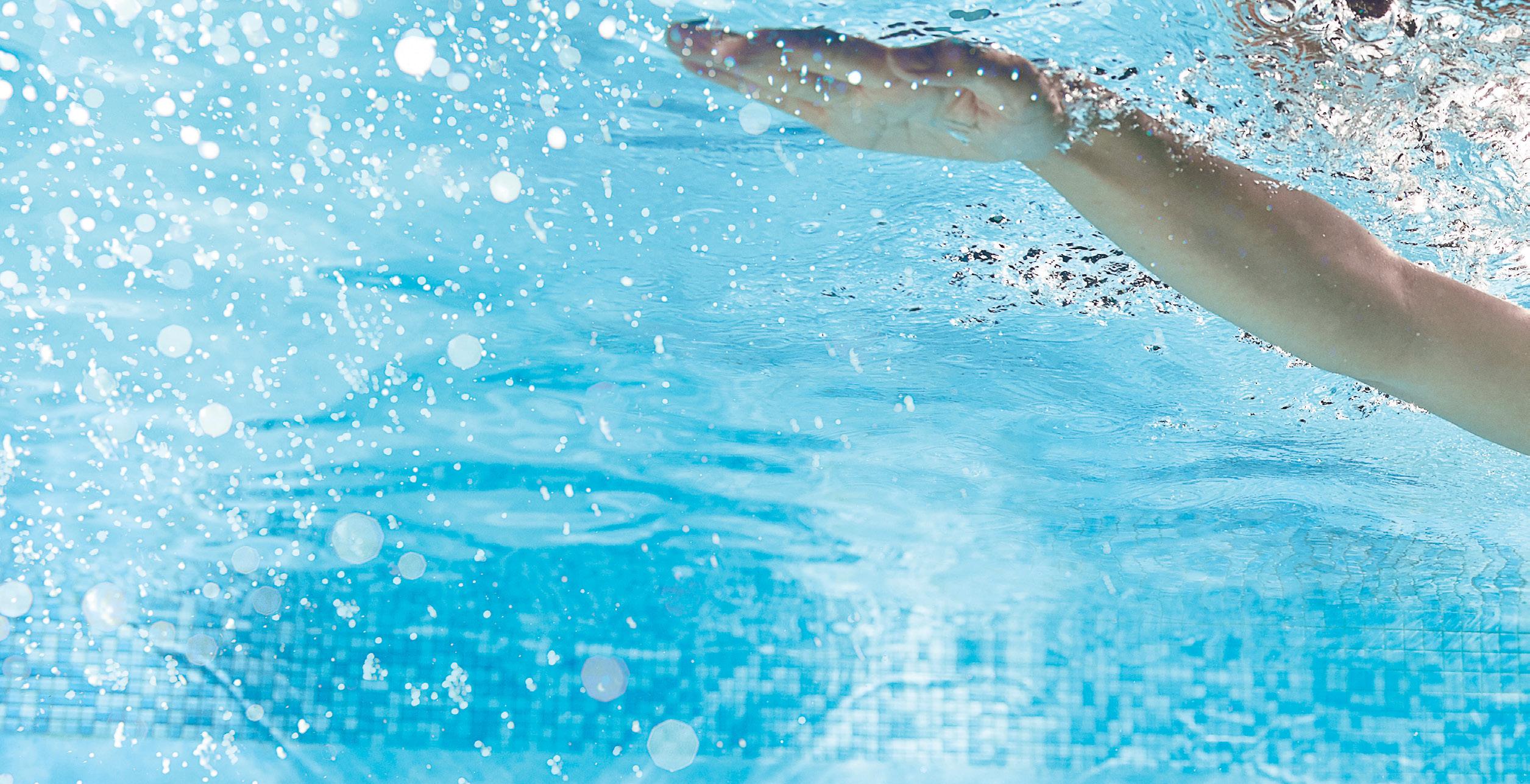
Why should you choose GCSE Physical Education?
If you have an interest in sport and are a passionate and enthusiastic sportswoman then GCSE PE is an exciting option for you.
GCSE PE covers a broad range of topics from the anatomy of the human body to discussing and analysing the benefits of new technology in sport. Pupils will learn about physiology of the body and the psychological factors that affect performance, as well as develop their leadership, problem solving and independent learning skills. Other topics covered on the course include physical training, drugs in sport, commercialisation, participation in sport and nutrition, well-being. The course also builds on the practical skills that pupils developed in key stage 3.
We recommend that pupils wishing to take GCSE PE participate in one or two sports regularly inside or outside of school. Pupils will have to discuss, analyse, evaluate and apply theoretical knowledge to their own sporting performances as part of their NEA.

Course details: AQA 8582
Paper 1:
The human body and movement in physical activity and sport
What’s assessed:
• Applied anatomy and physiology
• Movement analysis
• Physical training
• Use of data.
How it’s assessed:
• Written examination: 1 hour 15 minutes
• 30% of GCSE
• A mixture of multiple choice/objective test questions, short answer questions and extended answer questions.
Paper 2:
Socio-cultural influences and wellbeing in physical activity and sport
What’s assessed:
• Sports psychology
• Socio-cultural influences
• Health, fitness and wellbeing
• Use of data.
How it’s assessed:
• Written examination: 1 hour 15 minutes
• 30% of GCSE
• A mixture of multiple choice/objective test questions, short answer questions and extended answer questions.
Non-examination assessment: Practical performance in physical activity and sport
What’s assessed:
• Practical performance in three different physical activities in the role of player/performer (one in a team activity, one in an individual activity and a third in either a team or an individual activity)
• Analysis and evaluation of performance to bring about improvement in one activity.
How it’s assessed:
• Assessed by teachers
• Moderated by AQA
• 100 marks
• 40% of GCSE
• For each of their three activities, pupils will be assessed in skills in progressive drills (10 marks per activity) and in the full context (15 marks per activity)
• Pupils will be assessed on their analysis (15 marks) and evaluation (10 marks) of performance to bring about improvement in one activity.
We are able to utilise top of the range facilities at LEH which gives us the opportunity to run a wide variety of sports such as swimming, badminton, netball and lacrosse to name a few. These sports are there for pupils to participate in recreationally and competitively outside of GCSE PE and these are inclusive for all. We compete in various county and national competitions for most sports we run at LEH and we also organise many inter-school friendlies with local schools in the area. Pupils participate in a timetabled Games programme throughout their school life and when they get to Lower Fifth they are given the chance to opt for their sports come the Spring Term. The chance to perform and participate are key to the PE department so that all pupils get the opportunity to live healthy, active lifestyles.
The course is well suited to anyone who is interested in topical matters of ethics, who likes to express their opinions, and who is interested in what motivates people to follow a religion. Pupils will emerge from this GCSE with greater articulacy, verbal reasoning skills and a broader cultural perspective, and higher writing skills of analysis and evaluation.
Course details (AQA 8062)
This consists of two papers:
A) The study of Christianity and Buddhism: beliefs, teachings and practices
B) Thematic studies: four Ethical themes. There will be two examinations, each taking 1 hour 45 minutes.
Christianity and Buddhism East meets West in this half of the course where pupils will discover the beliefs, teachings and practices of two contrasting religious traditions. We will investigate the main teachings of these faiths and how these have had an impact on their ethical beliefs. Pupils will also have the opportunity to study the practices of these traditions and the concrete ways in which Christians and Buddhists live their lives in light of their beliefs. At the same time, pupils will be encouraged to reflect on their own beliefs, and those of a secular culture, and how these may contrast or compare to the religions they are studying.
As part of this course pupils will investigate theological issues such as the Trinity, Jesus as the son of God and salvation. They will also study a history of the Buddha’s enlightenment, the role of meditation within Buddhism and the contemporary impact of Buddhist ethics.
This course is well suited to pupils interested in the historical development of religious traditions and how these have influenced modern believers. There will be plenty of opportunity for discussion and pupils will be trained in forming their own evaluative views. It therefore also suits
pupils who are keen to develop skills of argumentation, analysis and evaluation.
Half of the course will be devoted to Thematic Studies, in which pupils will consider different religious, philosophical and ethical views and their impact on the modern world. They will study the different perspectives on issues within and between religions, as well as non-religious views.
In the topic Relationships and Families, we study religious teachings and non-religious beliefs about sex, marriage and divorce, families and gender equality. In Religion and Life, we will study beliefs about the origins and value of the universe and its impact on beliefs about the origins and the value of human life. We will also see the impact these beliefs have on medical ethics. Religion, Crime and Punishment, and Religion, Peace and Conflict are also themes to be studied.
This course offers the opportunity to engage with topical issues, within a framework of exploring beliefs and values. Pupils who are interested in contemporary issues, who wish to explore and examine them, and who like the challenge of debating about them, will really enjoy this course.
We will visit St. Paul’s Cathedral and the Buddhist Temple in Wimbledon. Pupils will also be able to participate in our biannual trip to Rome. This trip takes place in October half term.
“Pupils demonstrate communication skills, often significantly beyond expectations for their age in their use of specialist language, and they fluently articulate explanations of challenging ideas.”
ISI Report 2022
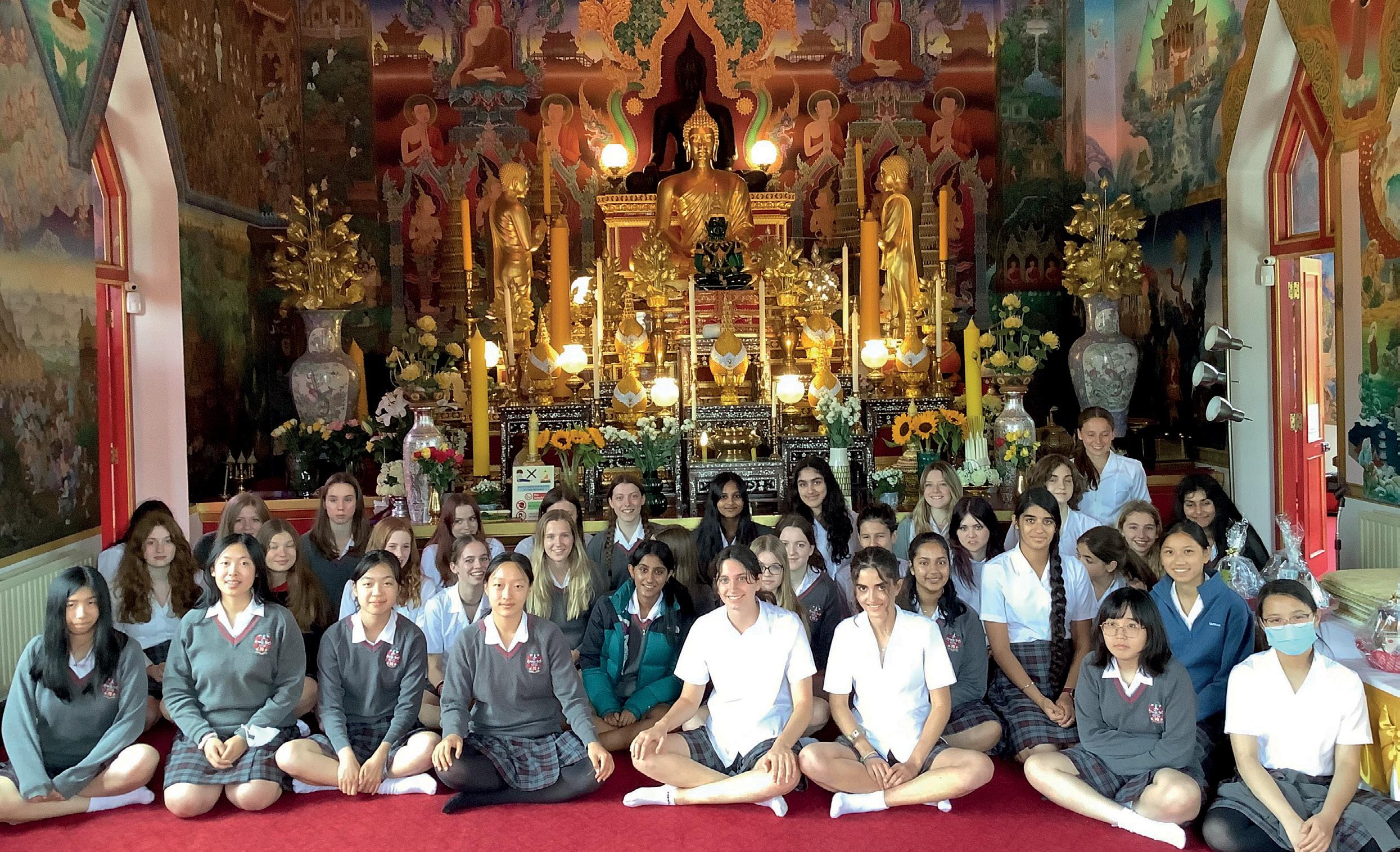
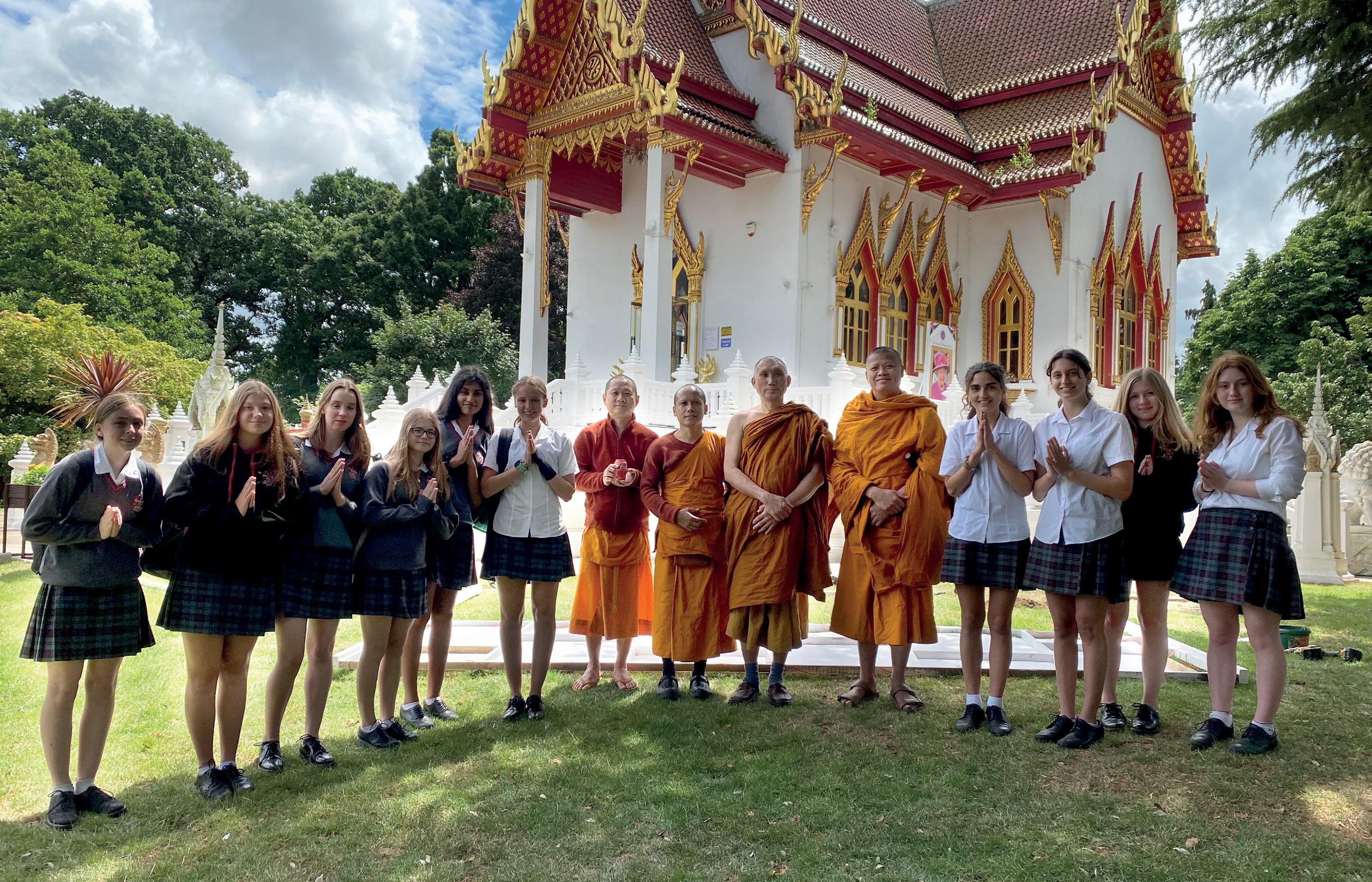
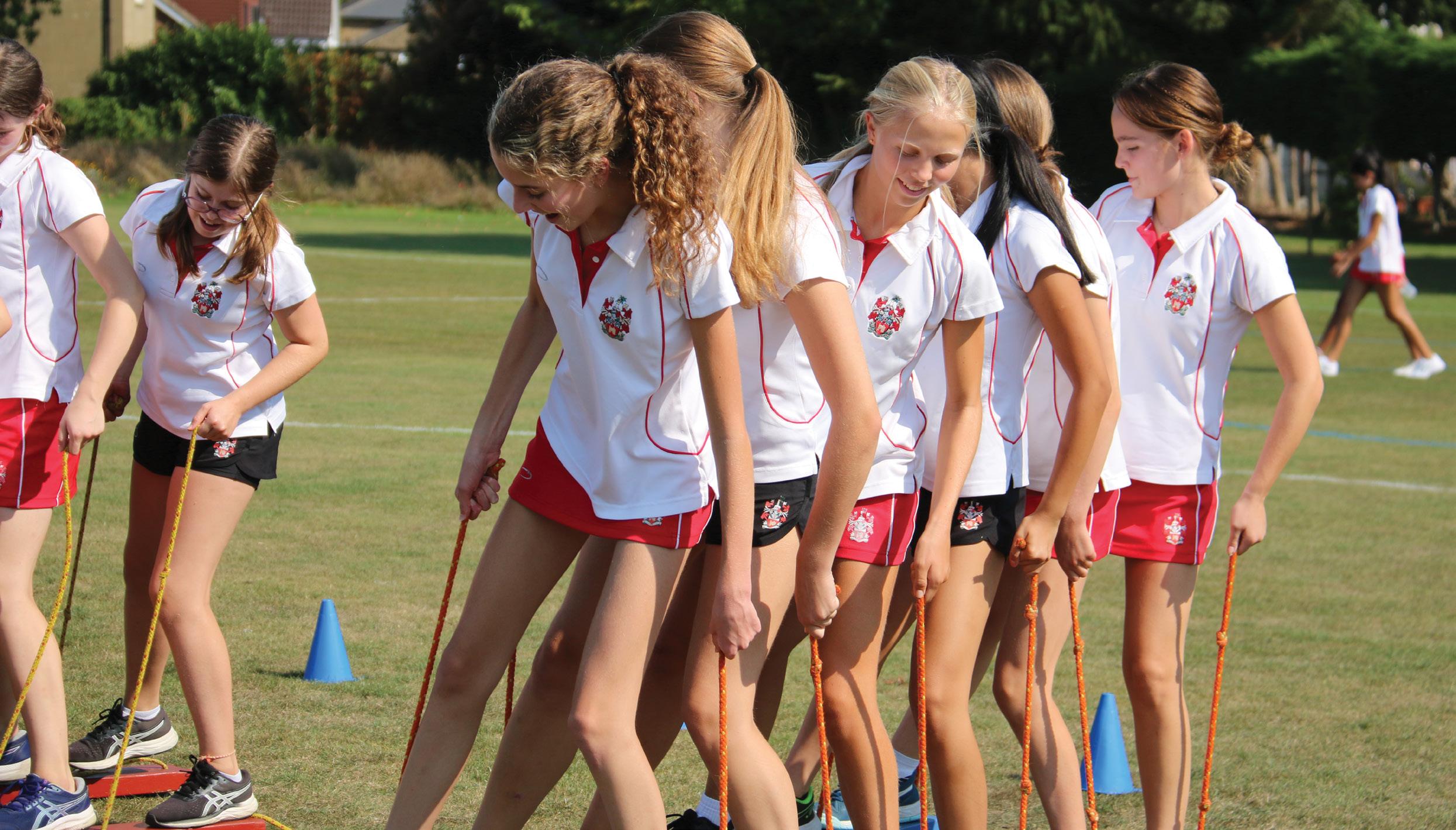
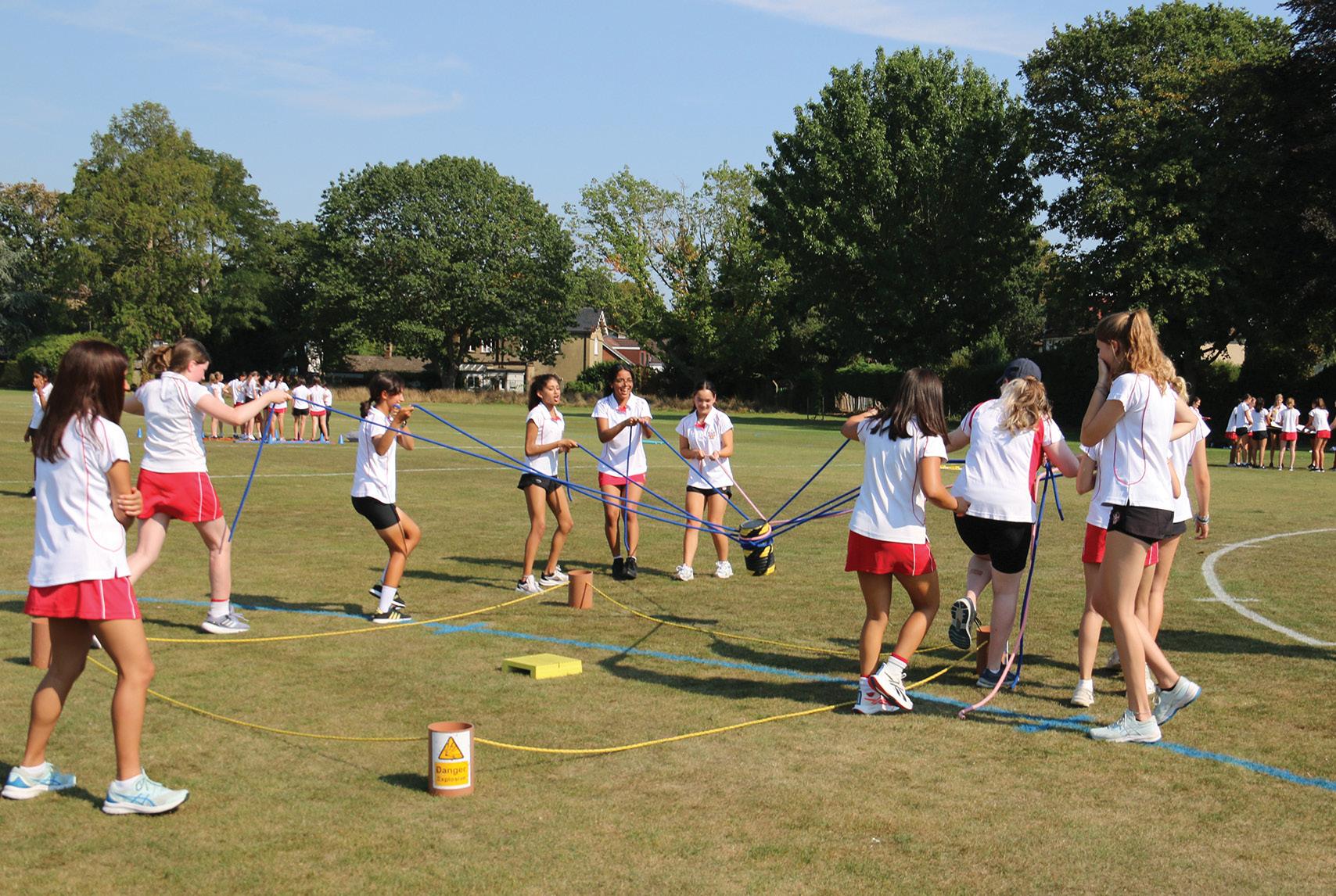

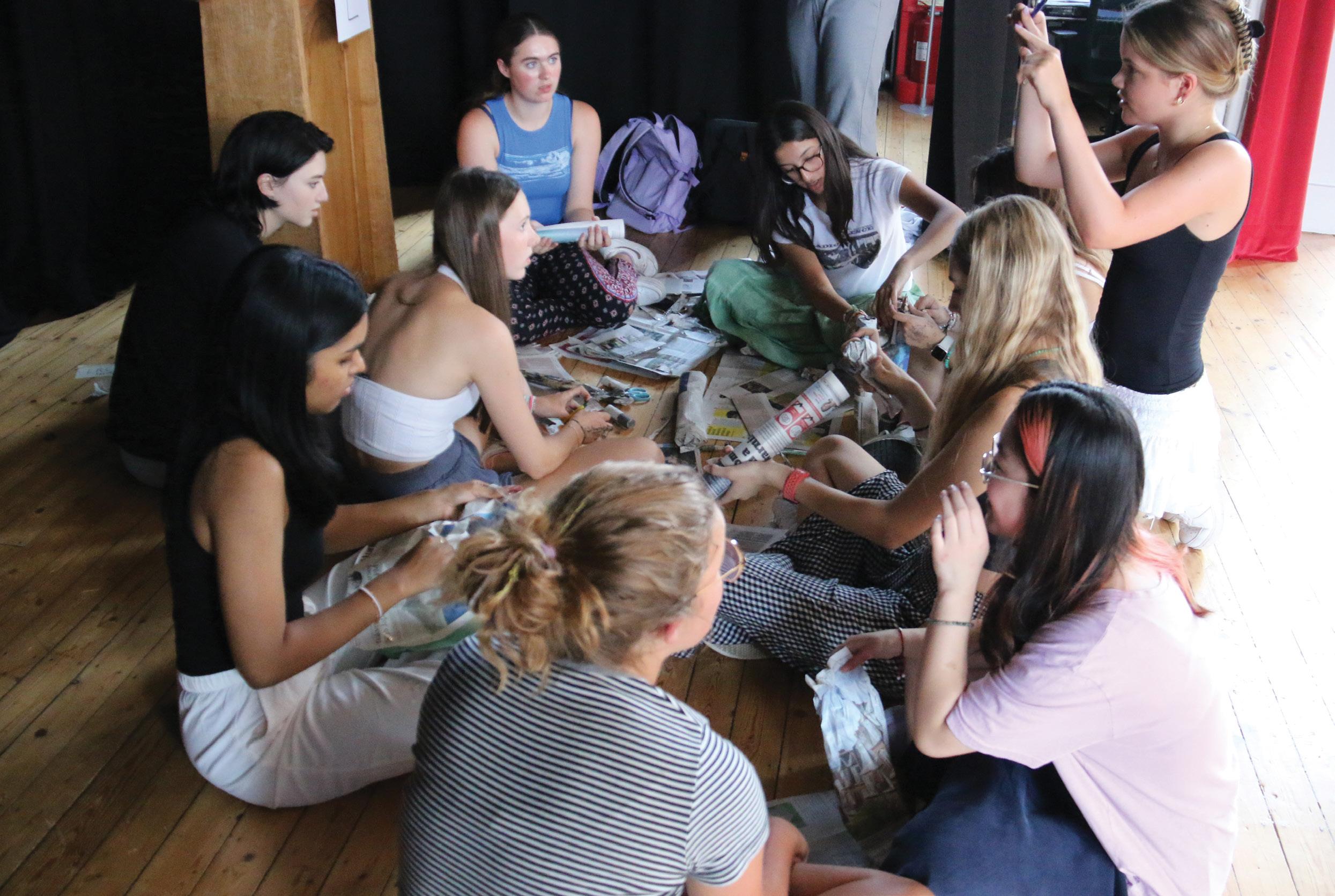
“This